Category: Uncategorised
-

UK Student Visa Requirement Guide for Nigerians
When you boil it all down, the UK student visa requirement rests on three crucial pillars: a valid international passport, your Confirmation of Acceptance for Studies (CAS), and proof that you have enough money to support yourself. Think of the CAS as the official handshake from your university, and the proof of funds as your financial green light. Getting these right is the absolute first step for any Nigerian student with dreams of studying in the UK.
Your Essential UK Student Visa Roadmap
For many Nigerian students, figuring out the visa process can feel as chaotic as navigating Lagos traffic during peak hours. It seems complicated and, frankly, a bit stressful. But once you understand the route, it becomes a clear, manageable journey. The UK Student Visa (which used to be called the Tier 4 visa) is the one thing you absolutely must have to make your UK education a reality. Without it, that admission letter is just a piece of paper.
At its core, the entire application process is about proving two main things to the UK Home Office:
- You're a genuine student: You'll show this with your unconditional offer from a licensed UK university and, most importantly, your CAS.
- You can pay your own way: This means providing clear evidence that you have enough cash to cover your first year of tuition fees and living costs without relying on public funds or working illegally.
The Three Pillars of Your Application
Imagine your visa application is a three-legged stool. If any one of the legs is shaky, the whole thing will topple over. You have to make sure all three are solid.
- Your Nigerian Passport: It must be current and have at least one completely blank page for the visa sticker.
- Your Confirmation of Acceptance for Studies (CAS): This isn't a physical document but a unique reference number your university sends you after you've formally accepted their offer and paid any necessary deposit. It’s what connects you, your course, and the Home Office.
- Your Proof of Funds: This is the hard evidence, typically bank statements, showing you’ve held the required amount of money for a specific period.
Let's break down the journey into a simple roadmap. The table below outlines the main stages you'll go through, from getting your university offer to hitting 'submit' on your visa application.
UK Student Visa Application Stages at a Glance
Stage Key Action Required Primary Document Stage 1: University Offer Accept an unconditional offer from a licensed UK institution. Unconditional Offer Letter Stage 2: CAS Issuance Pay tuition deposit and request your CAS from the university. Confirmation of Acceptance for Studies (CAS) Stage 3: Financial Prep Ensure funds for tuition and living costs are held for 28 consecutive days. Bank Statements Stage 4: Application Complete the online visa application form and pay the fees. Completed Online Form Following these stages in order helps keep the process from feeling so overwhelming.
The image below gives you a quick visual summary of the key checkpoints you'll need to clear.
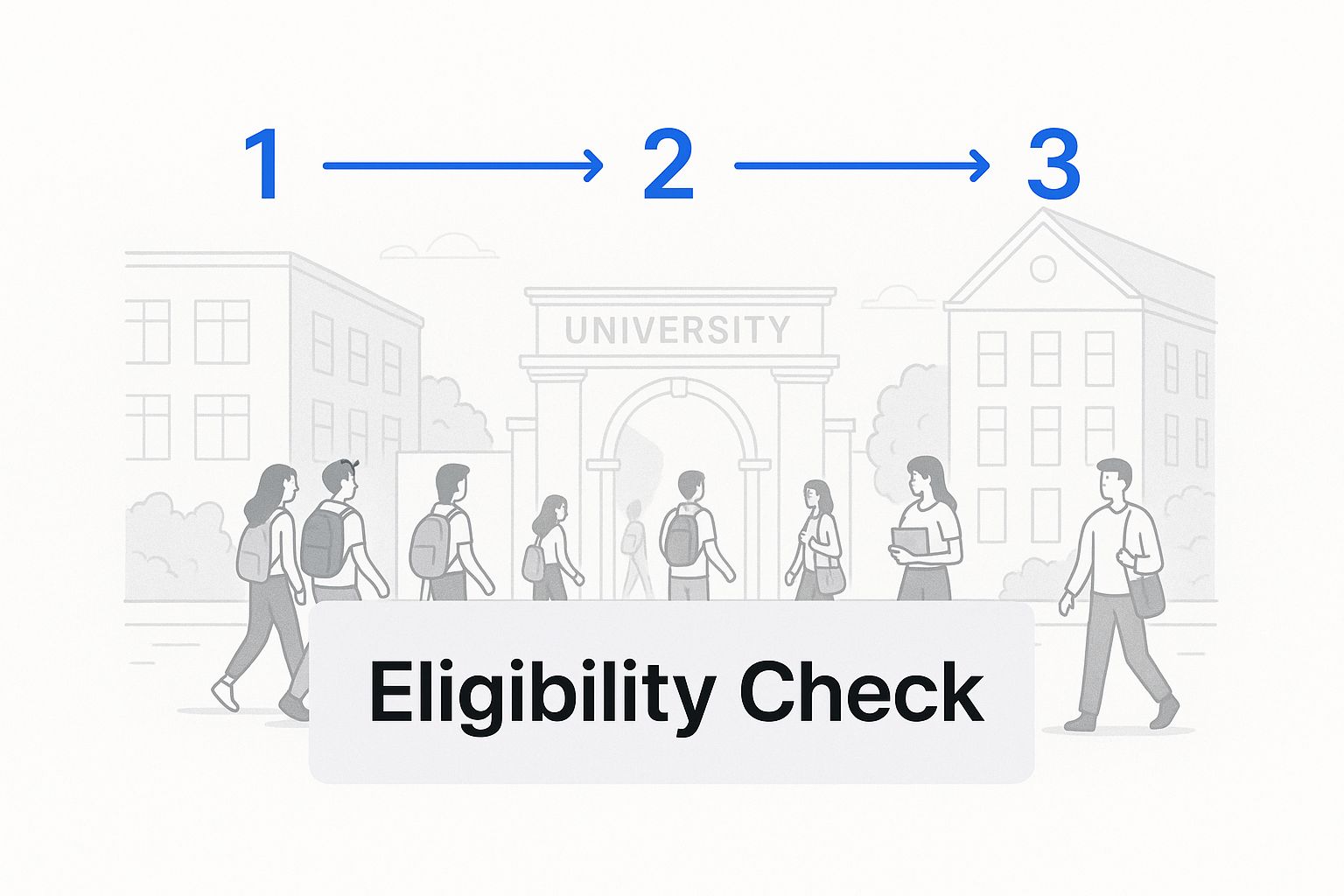
As you can see, passing that first eligibility check is the foundation for everything that follows. It's the step you have to take before you even start pulling your documents together.
While you're working through your UK student roadmap, it's also smart to think about the practical side of moving. Looking into affordable student storage options can make your arrival much smoother by giving you a secure place for your things.
If you're ready to get into the nitty-gritty of each requirement, our full guide breaks it all down. Get more details about the UK student visa requirements here: https://blog.japachat.com/uk-student-visa-requirements/. Nailing these first few steps sets you up for a confident and successful application.
Getting Your Confirmation of Acceptance for Studies Sorted
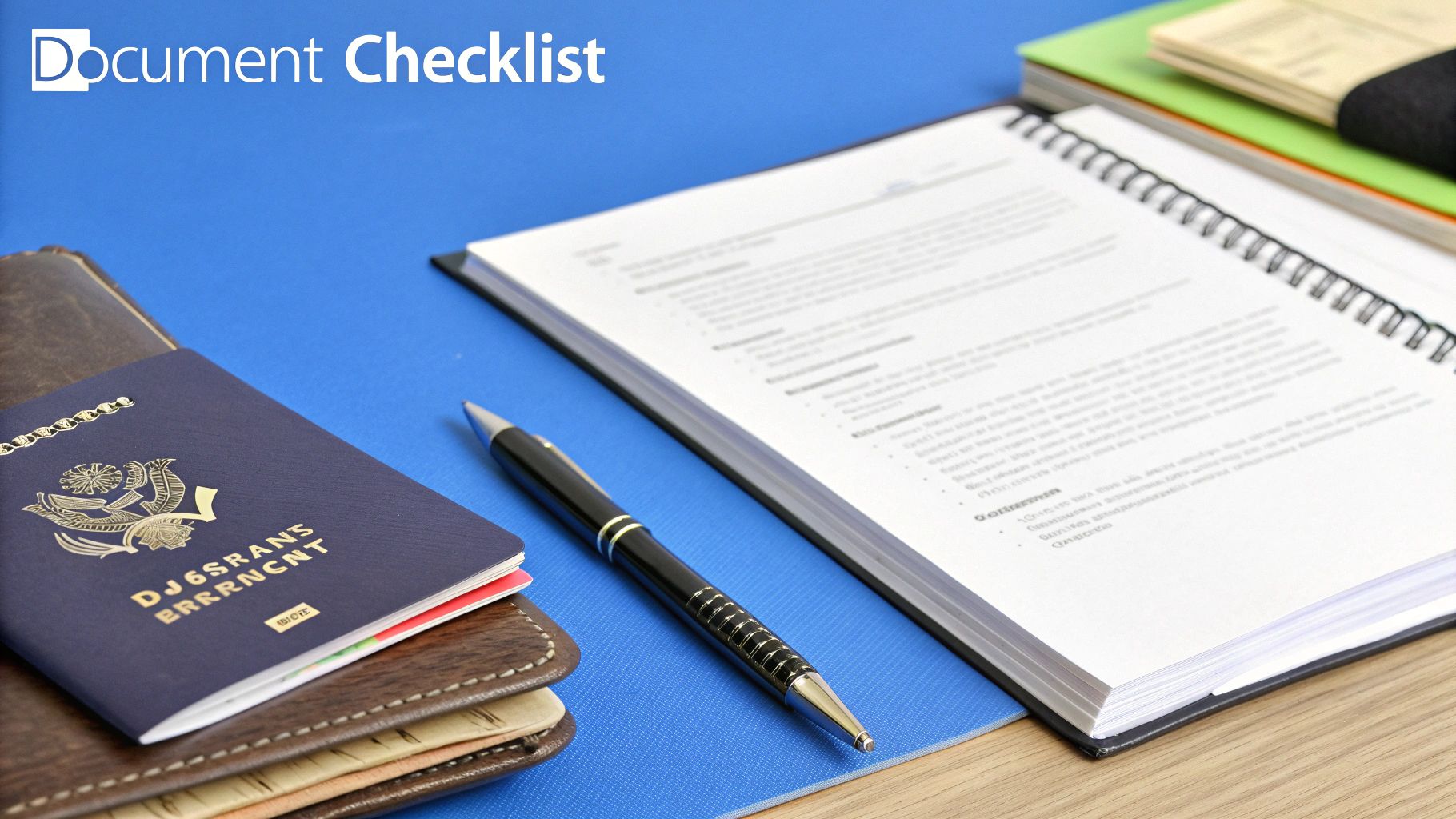
Think of the Confirmation of Acceptance for Studies (CAS) as the cornerstone of your entire student visa application. It's not just another piece of paper; it’s the official, digital link between your chosen UK university and the Home Office, proving you have a genuine place to study. Honestly, without a CAS, your visa application is a non-starter.
The CAS isn't a physical document they'll post to you. Instead, it’s a unique electronic reference number. Your university will only give you this number once you've met all their admission conditions, formally accepted your offer, and usually, paid your tuition deposit. This number is what you'll need to even begin the online visa form.
This digital code holds all the crucial details the visa officer needs to see: your exact course title, the start and end dates, your first-year tuition fees, and any amount you've already paid. It's single-handedly the most vital piece of evidence you'll submit.
Why You Can’t Afford to Skim Your CAS
You need to treat your CAS with the same level of care you'd give your passport. A single, tiny error on it can lead to a swift—and expensive—visa refusal. The Home Office cross-references everything against this number, so any discrepancy between your CAS and your other documents will immediately raise a red flag.
For Nigerian students, this is a point I can't stress enough. I've seen applications fail for the simplest of mistakes, like a misspelt middle name or an incorrect date of birth. Imagine your name is "Chukwuemeka" on your passport, but the CAS says "Chukwuemka"—that one-letter difference is often enough for a refusal.
As soon as you receive your CAS, go through it with a fine-tooth comb. Check these details immediately:
- Your full name: Does it match your Nigerian passport exactly? Pay close attention to the order of your first, middle, and last names.
- Your date of birth: Is every part of it—day, month, and year—correct?
- Your passport number: Read it out loud and double-check every single digit and letter.
- Course details and fees: Do they line up with what was stated in your original offer letter?
If you spot anything wrong, no matter how minor it seems, get in touch with your university's international office right away. You must get it corrected before you pay your visa fee and submit your application.
The Growing Stakes for a Perfect CAS
Interest in UK education among Nigerian students is booming once again. This means more competition and, naturally, more careful scrutiny from visa officers. In the first quarter of 2025, the study visa grant rate for Nigerian students climbed to an encouraging 96%. That’s a 7-point jump from the same period in 2024, which shows a great deal of renewed confidence.
In fact, Nigerian applications shot up by a massive 64% in that same quarter. But with this surge in volume comes much closer inspection of every application. A flawless submission has never been more important.
"Your CAS is the foundation of your visa application. If the foundation has a crack, the entire structure is at risk. Meticulously checking every detail on your CAS statement is a non-negotiable step for a successful outcome."
With so many applications flowing in, a perfect CAS helps your file stand out for all the right reasons. It signals to the visa officer that you are a serious, organised student who has done their homework. For a complete picture of everything you'll need to pull together, have a look at our full breakdown on student visa UK requirements. Getting your CAS right is the first, and arguably most important, step towards a smooth process.
Demystifying the Proof of Funds Requirement
Of all the hurdles on the path to studying in the UK, this is the one that trips up most Nigerian students. The proof of funds requirement can feel daunting, but let's demystify it.
Essentially, the UK Home Office needs to see that you have enough cash set aside to cover your tuition and living expenses. It’s their way of making sure you can support yourself without needing to rely on public funds or work illegally. Nailing this part is crucial—getting it wrong is one of the top reasons for a visa refusal. But once you understand the rules, it's just a matter of careful planning.
Let's break down exactly what you need to show.
How to Calculate Your Magic Number
The total amount you need isn't just a random figure; it’s a specific calculation. It's your first year's tuition fees plus a set amount for your living costs.
-
Your Tuition Fees: You only need to show the outstanding balance for your first academic year. This figure will be clearly stated on your Confirmation of Acceptance for Studies (CAS). If your course fee is £18,000 and you've already paid a £4,000 deposit to the university, you only need to show the remaining £14,000 for tuition.
-
Your Living Costs (Maintenance): This is a fixed sum set by the UK government, and it depends on where you’ll be studying.
- Studying in London? You'll need to show £1,334 for each month.
- Studying anywhere else in the UK? The figure is a bit lower at £1,023 per month.
You must prove you have enough to cover these living costs for up to nine months. So, if you're London-bound, your total maintenance will be £12,006 (£1,334 x 9). If you’re outside London, it's £9,207 (£1,023 x 9).
Think of the formula like this: (Outstanding First-Year Tuition) + (Total Living Costs) = Your Proof of Funds Target.
Let's walk through an example. Say Tunde is heading to the University of Manchester (outside London). His tuition is £20,000, and he's already paid a £5,000 deposit.
- Tuition balance to show: £15,000
- Living costs for 9 months: £9,207
- Total funds Tunde must show: £24,207
The table below gives you a clearer picture of how this calculation works in practice.
Calculating Your Required Proof of Funds
This table breaks down the living cost calculations to help you see how your total proof of funds amount is determined based on your location and tuition fees.
Location Monthly Living Cost Total for 9 Months (Academic Year) Example Total (with £20,000 Tuition) Inside London £1,334 £12,006 £20,000 + £12,006 = £32,006 Outside London £1,023 £9,207 £20,000 + £9,207 = £29,207 Remember to deduct any tuition deposit you've already paid from the total. This final figure is the absolute minimum your bank balance must show for the required period.
The Golden Rule: Don’t Break the 28-Day Chain
This is the rule that catches so many people out. The Home Office has a strict, non-negotiable 28-day rule.
It means the full amount of money we just calculated must have been in your (or your sponsor’s) bank account for at least 28 consecutive days. The closing balance on the bank statement you submit can’t be more than 31 days old from the date you apply for your visa online.
Here's the critical part: during that entire 28-day window, the balance can never, ever dip below the required amount. Not for an hour, not for a minute. If your target is £24,207 (around ₦48.4 million at current rates), seeing a balance of ₦48.3 million at any point will lead to a refusal.
Imagine you're trying to keep a bucket of water filled to a specific line for 28 days straight. If the water level drops below that line, even for a moment, you've failed the test. The Home Office sees this consistency as proof that the money is genuinely yours and not just borrowed for the application.
Common Nigerian Pitfalls to Avoid
Some financial habits that are perfectly normal in Nigeria can raise serious red flags for a UK visa officer. Be extra vigilant and steer clear of these common mistakes:
-
Using a Business Account: Don't even think about it. The money must be in a personal account belonging to you or your parents/legal guardians. Funds in a company account, even if it's your family's business, will not be accepted.
-
Funds from a Property Sale: While perfectly legitimate, money from selling land or a house requires a clear paper trail. You can't just show a large credit alert. You'll need to provide the sale agreement, a letter from the lawyer who handled the transaction, and land registry documents to prove where the money came from.
-
"Miracle Money" Deposits: A huge, unexplained lump sum that appears in your account right before the 28-day period starts is the biggest red flag of all. This is what they call "funds parking," and it looks like you've borrowed the money just to fool them. Every large deposit must have a clear source.
-
Relying on Unofficial Sponsors: The only acceptable sponsors are you or your parents/legal guardians. An uncle, aunt, or generous family friend won’t cut it, unless they have legally adopted you and you have the court documents to prove it.
Finally, make sure your bank statement is formatted correctly. It needs to be on official bank letterhead and clearly show the account holder’s name, account number, the bank’s logo, and all transactions for the period. If you're using a Naira account, you must convert the closing balance to Pounds Sterling using the official OANDA exchange rate on the day you submit your application.
Your Essential Document Checklist
Getting your documents ready for a UK student visa application feels a bit like packing for a long, important trip. If you forget something crucial, you might not even get on the plane. A successful application is all about being organised, so let’s walk through exactly what you need to have in your file.
Think of this checklist as your final scan before you leave the house. You wouldn't go to the airport without your passport, right? Similarly, you can’t hit 'submit' on your application without these key documents. Each one tells the visa officer a piece of your story, proving you're a genuine student who's ready to study in the UK.
Core Academic and Identity Documents
First up, let's talk about the absolute non-negotiables. These documents are the foundation of your application, confirming who you are and why you've been accepted to study.
- Your Valid Nigerian International Passport: This might seem obvious, but it’s the most important item. Make sure it's valid for your entire course and has at least one completely blank page for the visa sticker.
- Academic Transcripts: You’ll need to provide the qualifications that got you your university offer. For undergrads, this is usually your WAEC or NECO certificate. If you’re heading for a postgraduate course, you'll need your Bachelor's degree certificate and final transcripts.
- Proof of English Language Proficiency: Check your CAS carefully. If it says the university has already assessed your English ability (often based on your WAEC English result), you might not need a separate test. If you do, you'll need your results from an approved provider like IELTS UKVI or PTE Academic UKVI.
A quick but important tip: the Home Office needs to see original documents or officially certified copies. Double-check that everything is clear, easy to read, and matches the information your university used to issue your CAS.
The Nigerian-Specific Health Requirement
Here’s a step you absolutely cannot skip if you're applying from Nigeria: the Tuberculosis (TB) test certificate.
This test is a mandatory uk student visa requirement for anyone coming from Nigeria to the UK for more than six months. You must get it done at a clinic approved by the UK Home Office. In Nigeria, this means heading to one of the International Organization for Migration (IOM) health assessment centres.
You'll find them in these two cities:
- Lagos: Migration Health Assessment Centre (MHAC)
- Abuja: Migration Health Assessment Centre (MHAC)
Be mindful of the timing here. Your TB certificate is only valid for six months from the day it’s issued. The best time to book your appointment is after you have your university offer but before you’re ready to submit the visa application. Just make sure the certificate will still be valid on the day you plan to fly to the UK.
Compiling Your Complete Application File
Once you have the core documents sorted, it's time to gather the final pieces of the puzzle. This includes your unique CAS details and the financial proof we covered earlier.
Here’s a final checklist to run through before you submit:
- CAS Reference Number: This isn't a physical document, but you absolutely need this unique number to begin your online application.
- Financial Evidence: Your bank statements proving you've held the required funds for 28 consecutive days.
- Tuberculosis (TB) Test Certificate: The certificate from an approved IOM clinic in either Lagos or Abuja.
- ATAS Certificate (if required): This is only for students taking certain sensitive science and technology courses. Your offer letter will tell you very clearly if you need one.
- Parental Consent Letter (if under 18): A formal letter from your parents or legal guardians giving you permission to travel and study.
- Original Birth Certificate: This is especially important if you're using your parents' bank statements as proof of funds, as it officially proves your relationship to them.
Even with recent policy changes, the UK remains a top choice for Nigerian students. In the year ending March 2025, Nigerians were again among the top nationalities granted sponsored study visas. After a dip between 2022 and 2024, the first quarter of 2025 saw a 13% increase in study visas granted to Nigerians, showing a real bounce-back in demand. This trend underscores just how important Nigerian students are to the UK’s universities and culture.
You can dive deeper into these immigration trends and see the data for yourself on the official government statistics page. Learn more about UK study visa trends on GOV.UK.
Getting Your Application Submitted: The Online Form and Biometrics
Right, you’ve got your documents in a neat pile and your bank statements are in order. Now it’s time for the main event: submitting your application. This is where all that hard work pays off. The whole thing happens in a few key stages: filling out the online form, paying the fees, and attending a biometrics appointment. Let’s break it down so there are no surprises.
Your journey starts—and must only start—on the official GOV.UK website. Seriously, don't be tempted by other websites claiming they can speed things up for a fee. Stick to the official source. The online form itself is pretty detailed, so grab a cup of tea and find a quiet moment to tackle it without rushing.
Nailing the Online Form
Think of the application form as your first official introduction to the UK Home Office. Every single detail you enter has to be spot on and must match what's on your documents, especially your passport and CAS.
One of the biggest tripwires for Nigerian applicants is the travel history section. You absolutely must declare all your previous trips abroad and, crucially, any visa refusals from any country. Trying to hide a previous refusal is a surefire way to get another one.
Take your time. Double-check your date of birth, your passport number, and that all-important CAS reference. A simple typo can cause major headaches and delays, so it's well worth a final read-through before you hit submit.
Once you’re happy with the form, you’ll be prompted to pay two key fees online:
- The Visa Application Fee: This is the standard charge to get your application reviewed. As of early 2025, it costs £490 when you apply from outside the UK.
- The Immigration Health Surcharge (IHS): This is non-negotiable and gives you access to the UK's National Health Service (NHS). The fee is calculated for the full length of your visa, currently set at £776 for each year of your course.
You'll need a debit or credit card that can make international payments, like a Visa or Mastercard, to pay these fees in Pounds Sterling.
Your Biometrics Appointment at TLScontact
After paying, the next step is booking your biometrics appointment. In Nigeria, this is all handled by TLScontact, which has centres in Lagos (both Victoria Island and Ikeja) and Abuja. This appointment is mandatory. It's where they'll take your photo and scan your fingerprints electronically.
You can't just walk in. You have to book a specific day and time through the TLScontact website after completing your online submission. This is also when you will hand over your physical passport.
Your biometrics appointment is the final checkpoint before your application is sent to the UK for a decision. Make sure every single document is uploaded clearly and correctly beforehand to avoid any stress at the centre.
It is so important to upload all your supporting documents—your bank statements, degree certificate, TB test result—to the TLScontact portal before you go to your appointment. While you can pay to use their scanners on the day, it’s much easier and less stressful to do it yourself from the comfort of your home. Getting this right is a vital part of meeting the uk student visa requirement.
Choosing the Right Service Speed
The standard waiting time for a decision is officially about three weeks. However, let's be realistic. The number of applications from Nigeria has skyrocketed, so things can get bogged down, especially during the peak student rush between July and September.
In fact, the UK saw a massive 64% jump in study visa applications from Nigeria in the first quarter of 2025 alone. This just goes to show how critical it is to apply as early as you can. You can read the full breakdown of these UK study visa trends on ICEF Monitor.
If your start date is creeping up and the wait is making you nervous, TLScontact offers priority services for an extra fee. These can cut the decision time down to as little as five working days. It’s an added expense, for sure, but it can be worth its weight in gold for the peace of mind it brings.
Understanding Your Visa Conditions and Post-Study Work

Getting your student visa is a massive win, and you should definitely celebrate it! But once the excitement settles, it's time to get familiar with the rules that come attached. Think of your visa as a rulebook for your stay in the UK – sticking to it is essential to keep everything running smoothly.
A big one for most students is working while studying. It's a fantastic way to get some real-world experience and help with living costs, but the Home Office has strict limits in place. During term time, you can typically work up to 20 hours per week. This isn't just a guideline; going over this limit can put your visa in serious jeopardy.
When you’re on official university holidays, like the big summer break or over Christmas, the rules usually relax, and you can work full-time. Just remember, your primary reason for being in the UK is to study. If your attendance drops or your grades suffer, your university has to report it, which could cause problems for your visa.
The Graduate Route: Your Post-Study Work Opportunity
For many Nigerian students, a UK degree is just the beginning. The real goal is to gain that crucial international work experience after graduation. That’s exactly what the Graduate Route—often called the Post-Study Work (PSW) visa—is designed for. It’s a brilliant pathway that lets you stay and work in the UK after you've earned your degree.
With this visa, you can work (or look for work) in any job, at any skill level, for two years. If you've completed a PhD, that extends to three years. What makes it so great is that you don't need a company to sponsor you. You don't even need a job offer to apply, giving you the freedom to find the perfect role to kickstart your career.
"The Graduate Route is a bridge between your UK education and a global career. It provides a crucial window to apply your new skills in a professional setting, making you a more competitive candidate in the Nigerian and international job markets."
How to Qualify for the Graduate Route
So, how do you get on this route? There are a few key boxes you need to tick. The main ones are:
- You must have passed your course: You need to have successfully completed the exact degree that your Student visa was issued for.
- You must apply from within the UK: This application has to be made while you are still in the UK.
- Your Student visa must still be valid: You can only apply before your current Student visa expires.
This visa is a vital part of the overall uk student visa requirement picture, as it offers a clear progression from student to professional. Planning for it early can be a smart career move. However, rules can change, so it pays to stay updated. You can read more about the latest developments concerning UK immigration new rules to make sure you have the most current information.
Got Last-Minute Questions? We've Got Answers
It’s completely normal to have a few niggling questions as you get ready to hit ‘submit’ on your UK student visa application. Let’s clear up some of the most common queries we see from Nigerian students, so you can move forward with confidence.
Can My Sponsor Use a Business Account for Proof of Funds?
This is a big one, and the answer is a firm no. The money you show for your maintenance and tuition must be in a personal bank account held by you or your parents.
Even if it’s a family-run business, using a corporate account is one of the quickest ways to get a visa refusal. The Home Office needs to see that the money is genuinely available to you for your studies, not tied up in business operations.
I Spotted a Mistake on My Application Form! What Now?
Don't panic! If you've already submitted the form online but haven't been to your biometrics appointment yet, you can usually fix this.
The best course of action is often to withdraw the incorrect application and start a fresh one. While you'll have to wait a few weeks for the visa and IHS fee refund to come through, it’s a much safer bet than letting a mistake lead to a potential refusal.
Can I Use the Proceeds From Selling Land as Proof of Funds?
Yes, you can, but you have to be meticulous with your documentation. A simple credit alert showing a large sum of money won’t be enough.
You need to create a clear paper trail that tells the whole story. This means providing official documents like:
- The signed sale agreement for the property.
- A letter from the solicitor who managed the transaction.
- Proof of ownership, such as the Certificate of Occupancy (C of O).
This evidence shows the Entry Clearance Officer that the money is legitimately yours and wasn't just borrowed to meet the uk student visa requirement.
Still feeling a bit stuck? The immigration maze can be tough to navigate alone. For quick, tailored answers that understand the Nigerian context, have a look at JapaChat. Our AI platform is built to give you the clear, step-by-step guidance you need for a successful move. You can get started for free.
-

UK Visit Visa Requirements for Nigeria: A Practical Guide for 2024
Planning a trip to the UK is exciting, but first, you need to navigate the visa application. Getting your head around the UK visit visa requirements for Nigeria is the most important step. It all boils down to convincing the UK Visas and Immigration (UKVI) officer of three fundamental things: you're a genuine visitor who will leave after your trip, you have the funds to support yourself without working, and your reason for visiting is legitimate.
Your Guide to a Successful UK Visitor Application
Applying for a UK visitor visa can feel like a big headache, but it’s a lot less intimidating once you understand what the visa officer is actually looking for. Don't think of it as just filling out forms. Instead, see it as telling a clear, consistent, and believable story about your planned trip.
Your main goal is to paint a picture of a responsible person who has a good reason to visit the UK and even stronger reasons to come back home to Nigeria.
The whole decision rests on three core pillars. All the documents you provide must solidly support them:
- Your Intentions: You have to prove you are a genuine visitor. This means showing you have strong ties to Nigeria that will pull you back home. Think of things like a stable job, family responsibilities, property, or a business you run. A Lagos-based software developer attending a tech conference in London will have a different story to tell than someone visiting family for a wedding in Manchester, but both need to show their roots are firmly in Nigeria.
- Your Finances: You must demonstrate you can pay for your entire trip without working or needing public funds in the UK. This isn't just about having money; it's about showing where it came from. Bank statements with a steady income and savings are far more convincing than a single, large, unexplained deposit that can look suspicious.
- Your Purpose: Your reason for visiting must be clear and backed by evidence. Whether you're going for tourism, business meetings, medical treatment, or to see relatives, your supporting documents need to match your story perfectly.
A strong application is one where every single document backs up the story you tell on your form. If you state you're attending a business meeting, you'll need an invitation letter from the UK company. If it’s a family visit, things like photos and chat history can help prove your relationship is genuine.
By focusing on proving these three core points, you can build a robust and persuasive application. This guide will walk you through each requirement, offering practical tips and real-world examples specifically for Nigerian applicants. We'll help you pull together the right documents and present your case effectively, so you can start your application with the confidence you need for a positive outcome.
The Golden Rule: Proving You're a Genuine Visitor
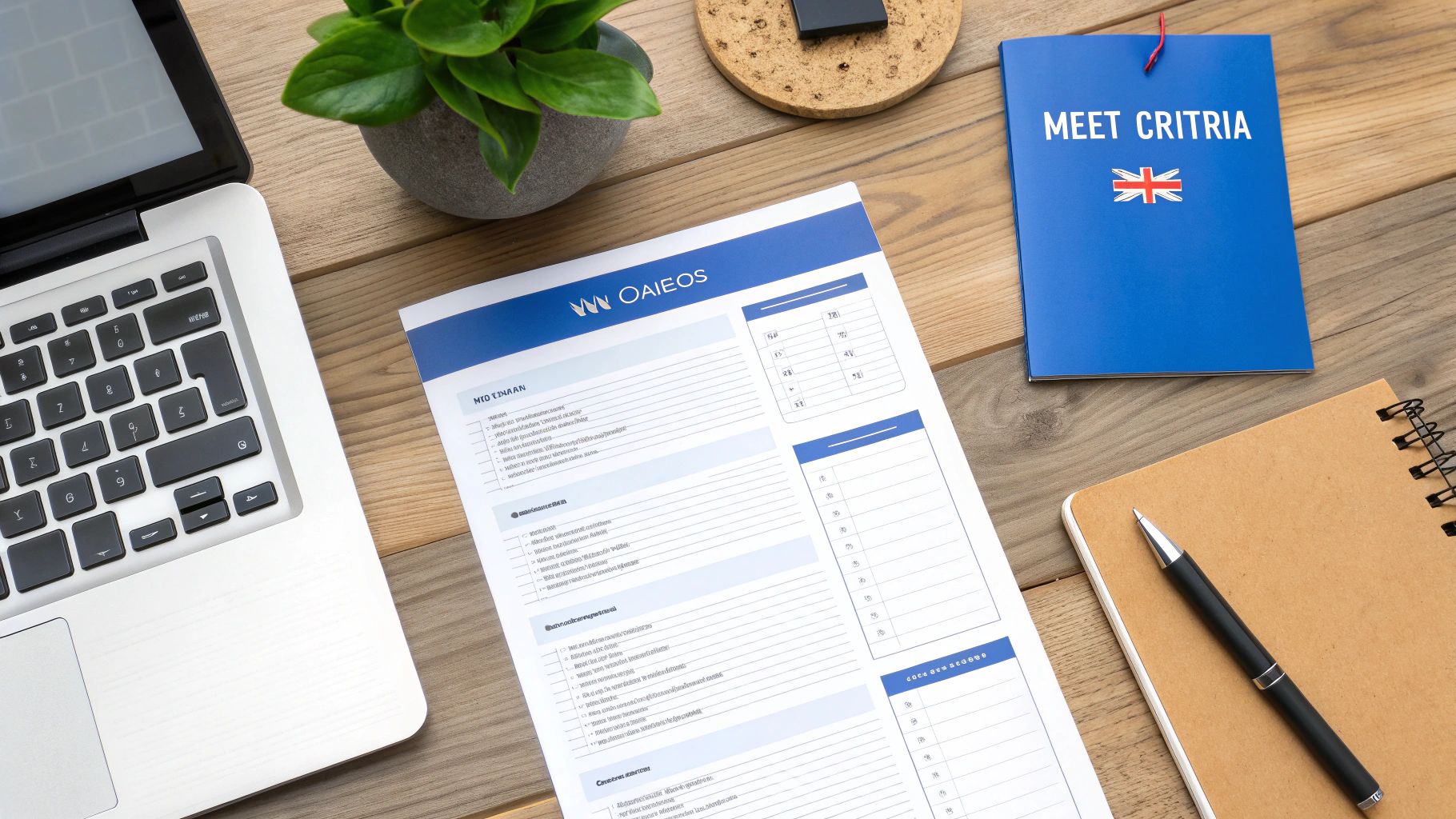
When it comes to the UK visit visa requirements for Nigeria, everything boils down to one simple idea: proving you are a genuine visitor. Honestly, this is the entire game. Your main task is to convince the Entry Clearance Officer (ECO) that you have every intention of leaving the UK when your visit is over.
Think of the ECO as being naturally cautious. It’s their job. Your application needs to be so solid, so full of credible proof, that approving your visa is the only logical choice. You do this by clearly showing two things: your deep roots in Nigeria and your financial stability.
Showing You Have Strong Ties to Nigeria
"Ties to home" is visa-speak for the important stuff in your life that you simply wouldn't walk away from. We’re not talking about casual friendships; we’re talking about the big, life-defining responsibilities and assets that anchor you to Nigeria.
Let's paint a picture. Imagine you're a branch manager at a major bank in Abuja. You're married with two kids in secondary school, and you own your family home. Now that's a story. Your senior-level job, your family who depends on you, and your property ownership create a powerful narrative of a life firmly established in Nigeria.
Here’s what you need to gather evidence for:
- Your Job: Get an official letter from your employer. It must confirm your position, salary, and—crucially—that your leave for the specific dates of your trip has been approved. If you run your own business, you'll need your CAC registration documents, business bank statements, and proof that your company is an active, trading entity.
- Your Family: Having a spouse, children, or even elderly parents who rely on you is a very strong tie. Back this up with marriage certificates, your children's birth certificates, and maybe a short, clear note explaining your role as a caregiver or provider.
- Property & Assets: Do you own land or a house? Get the title deeds or other official ownership documents ready. Proof of significant investments or savings held in Nigeria also helps build a stronger case.
The ECO needs to see your life in Nigeria in sharp focus. Your application should make it obvious that your UK trip is just a short holiday, and you have a stable, full life waiting for you back home.
Getting Your Financials Right
This is about more than just showing a healthy bank balance. The ECO is trained to look at the story behind the money. They care deeply about the source and consistency of your funds because their biggest fear is that the money isn't really yours.
A huge red flag, and a common reason for refusal for Nigerian applicants, is something called "funds parking." This is when a large chunk of cash mysteriously appears in your account right before you apply, often from a relative trying to "help." To an ECO, this looks suspicious.
To avoid this trap, provide bank statements for the last six months. They need to show a clear, consistent pattern. If your salary is ₦500,000 a month, they should see that amount coming in regularly. Any large, out-of-the-ordinary deposits must be explained with solid proof. If your uncle sent you ₦2 million for the trip, you need a letter from him explaining the gift, plus evidence showing where he got the money.
Here's how to tailor your proof to your specific situation:
- Students: If your parents are sponsoring your trip, you'll need their bank statements, a formal letter of sponsorship from them, and proof of their own income (like their employment letter and payslips).
- Business Owners: You should submit both your personal and your business bank statements. This demonstrates that your business is healthy and provides you with a steady personal income.
- Retirees: Provide your pension statements or documents showing income from investments. The goal is to show your financial situation is stable and can easily cover the costs of your UK visit.
By carefully documenting your ties and being completely transparent about your finances, you build a case based on trust. This approach tackles the ECO's main worries head-on, making it much easier for them to stamp your visa with an "Approved."
Your Ultimate Document Checklist
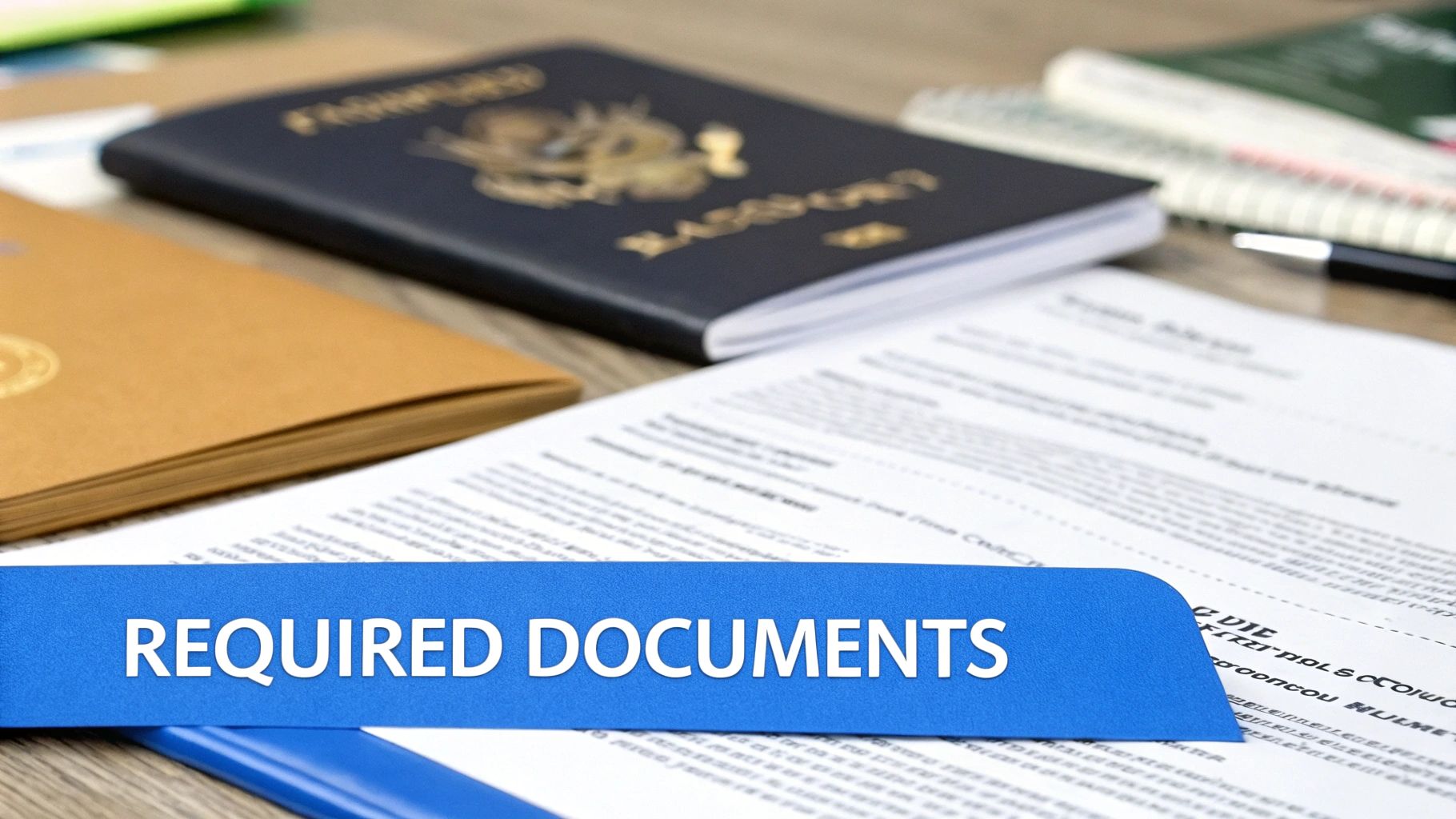
So, you’ve shown that you're a genuine visitor with solid reasons to return to Nigeria. What’s next? It's time to gather the documents that prove your story. Think of your application as a conversation with the visa officer. Your documents are your evidence, backing up every single claim you make. Getting this part right is absolutely critical.
A neatly organised pile of documents makes the officer’s job easier and instantly signals that you’re a serious, well-prepared applicant. It’s not just about having the right papers, but presenting them in a way that’s clear, logical, and leaves no room for doubt. This checklist is built specifically for Nigerians, covering the must-haves and the extras that can truly make a difference.
The Non-Negotiable Core Documents
These are the absolute essentials. Without them, your application is a non-starter, plain and simple. Make sure every document is up-to-date and in the correct format before you even think about submitting.
- Your International Passport: This needs to be valid for your entire planned stay in the UK. Just as importantly, it must have at least one completely blank page for the visa sticker (vignette).
- Proof of Financial Capacity: You’ll need to provide personal bank statements for the last six consecutive months. These statements should tell a clear story, showing a consistent flow of income (like your salary) and enough funds to comfortably cover your flight, accommodation, and spending money. Be warned: sudden, large deposits will raise a red flag, so be prepared to explain them with solid proof.
- Evidence of Accommodation and Travel Plans: While the official advice is not to pay for flights or hotels until you have the visa, you still need to show you've planned your trip. This means providing flight reservations (not paid tickets) and hotel bookings. Pro-tip: look for hotels with free cancellation policies.
Proving Your Employment or Business Status
This is where you demonstrate to the visa officer what you do for a living in Nigeria. It's a massive part of proving your "ties to home." The documents you'll need will depend on whether you're an employee or a business owner.
If you’re on a company's payroll, you'll need:
- A Letter from Your Employer: This has to be on official company letterhead. It should clearly state your role, how long you've worked there, your current annual salary, and confirm that your leave for the specific trip dates has been approved. The company’s contact details must be on it, too.
- Payslips: Provide your payslips for the last six months. These should perfectly match the salary deposits you've highlighted in your bank statements.
If you run your own business, you must provide:
- CAC Business Registration Documents: Gather your Certificate of Incorporation, Memorandum and Articles of Association, and any other relevant CAC forms.
- Business Bank Statements: Just like your personal account, provide six months of statements for your business to show it’s active and financially healthy.
- Company Tax Clearance Certificate: This is crucial. It proves your business is compliant with Nigerian tax laws, which adds a huge layer of credibility.
Your employment or business documents aren't just pieces of paper; they are proof of your stability and professional life in Nigeria. They tell the officer that you have a compelling reason to return home after your visit. To effectively prepare your documents for the visa application, it's beneficial to have a foundational grasp on understanding legal documents in plain English.
The demand for UK visas from Nigeria is undeniable. Between June 2023 and June 2024, the UK government processed over 225,000 applications from Nigerians, earning over $24 million in fees. This highlights Nigeria's importance as a source country for UK visitors and the significant economic ties between the two nations. To explore more about these figures and what they mean for applicants, you can discover more insights about Nigerian visa application statistics on imperialcitizenship.com.
Powerful Supporting Documents
While the documents above are the bare minimum, these supporting items can add serious weight to your application. They add extra layers of proof to your story and are fantastic for showing deep-rooted ties to Nigeria.
Think about including these:
- A Letter of Invitation: If you're visiting a friend or family member, a letter from them is essential. It should confirm they are inviting you, state where you will be staying, and explain the reason for your visit. Your host must also include a copy of their passport bio-data page or UK residence permit to prove their legal status.
- Property Ownership Documents: Own land or a house in Nigeria? Providing the Certificate of Occupancy (C of O) or Deed of Assignment is powerful evidence of a major asset you wouldn't just abandon.
- Evidence of Family Ties: Documents like your marriage certificate and your children’s birth certificates are vital. They paint a picture of family responsibilities that tie you firmly to Nigeria. For a deeper look at the evidence you might need, check out our guide on the complete https://blog.japachat.com/uk-visa-requirements-for-nigerian-citizens/.
- Cover Letter: Though not always mandatory, a well-written cover letter is your chance to speak directly to the visa officer. You can summarise your application, clearly explain your purpose for visiting, and proactively address any potential weak spots. It's your personal introduction.
How to Complete Your Online Application and Biometrics
Alright, you’ve gathered all your paperwork. Now it’s time to bring your application to life on the official UK government portal. This is a two-part dance: first, filling out the online form with absolute precision, and second, attending an in-person appointment to give your biometric information. Let's break down how to handle it like a pro.
The entire process begins and ends on the GOV.UK website. I can't stress this enough: this is the only official platform. Steer clear of any third-party sites promising shortcuts. Think of that online form as your digital handshake and first impression with the visa officer. You need to make it count.
Navigating the GOV.UK Online Form
The application form is long and detailed for a very good reason—it’s the backbone of your entire case. The Home Office needs a complete picture of who you are and why you want to visit. Honesty and consistency are everything here. Whatever you state in this form must be a perfect mirror of the documents you’ve so carefully prepared.
Don't rush it. This isn't a speed test. A simple typo or a rushed answer could be the very thing that leads to a refusal. Block out a couple of hours, sit down with your pile of documents, and meticulously check every single entry before clicking 'next'.
Here are some pointers for the trickiest sections:
- Travel History: Be brutally honest. List all your previous travel, particularly to the UK, USA, Canada, Australia, New Zealand, or any Schengen country. If you’ve ever had a visa refused for any country, you must declare it. Briefly explain what happened. Trying to hide a past refusal is one of the fastest ways to get another one.
- Financial Details: This section is all about the numbers. You’ll state your income, your savings, and how much you expect to spend on your trip. These figures must line up exactly with your bank statements and payslips. If you say you earn ₦400,000 a month, your bank statements had better back that up to the kobo.
- Purpose of Visit: Get specific. "Tourism" is too vague. Paint a picture for them. Something like, "A 10-day trip to London to see Big Ben and the Tower of London, catch a Chelsea match at Stamford Bridge, and visit my cousin in Manchester for two days." is much more convincing.
The golden rule? Consistency. If your application form tells one story and your documents tell another, it creates doubt. Doubt leads to refusals. Make sure every detail—from your monthly salary to your planned travel dates—is identical across the board.
The process is designed to walk you through each step logically, from filling in your details to the final decision. This visual gives you a great overview of the journey.
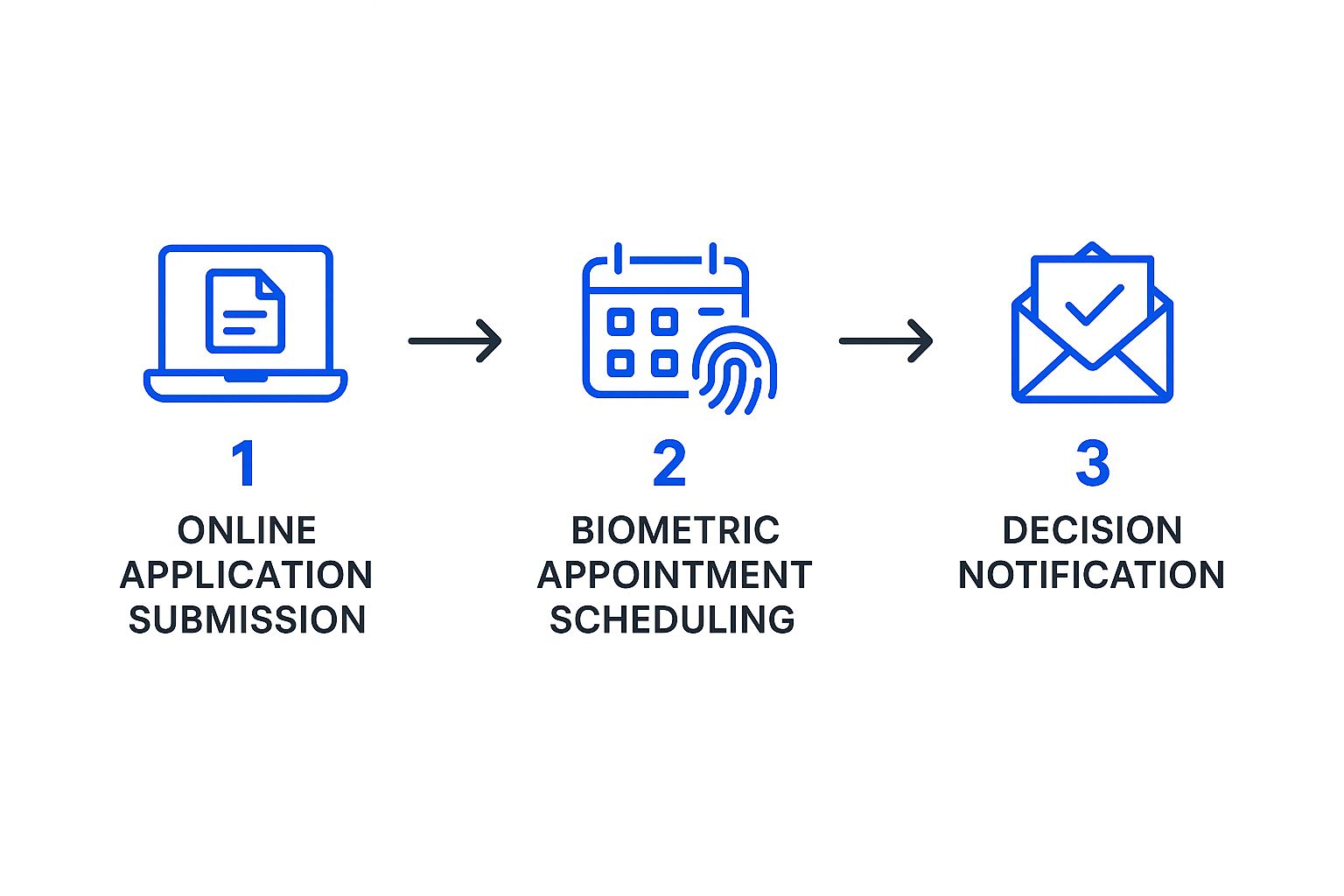
As you can see, once you submit and pay, your next crucial stop is the biometrics appointment. This is the final step before your application goes off for a decision.
Booking and Attending Your Biometrics Appointment
After you've submitted the online form and paid the visa fee, the system will automatically pass you over to the website for TLScontact. They are the UKVI's official partner in Nigeria for handling biometrics.
TLScontact has Visa Application Centres (VACs) in a few key cities, including Lagos (both Victoria Island and Ikeja) and Abuja. You’ll need to pick the location that’s easiest for you to get to and book an available time slot.
On the day of your appointment, you only need to show up with three things:
- Your Valid International Passport: The very same one you used in your online application.
- Your Appointment Confirmation Letter: You'll get this via email after booking your slot. Print it out.
- Your Document Checklist: This is a list generated by the GOV.UK website after you submit your form.
The process at the VAC is simple and clinical. A staff member will quickly check your documents, then you’ll have your fingerprints scanned and a digital photo taken. That’s it. No interview, no questions about your trip.
It's important to remember that the TLScontact staff are administrators, not decision-makers. They have zero influence on whether your visa gets approved. Their only job is to collect your biometrics and documents and ship them securely to the UKVI team. Once you walk out of that centre, your part is done. All that’s left is to wait for the decision.
Understanding UK Visa Fees and Processing Times
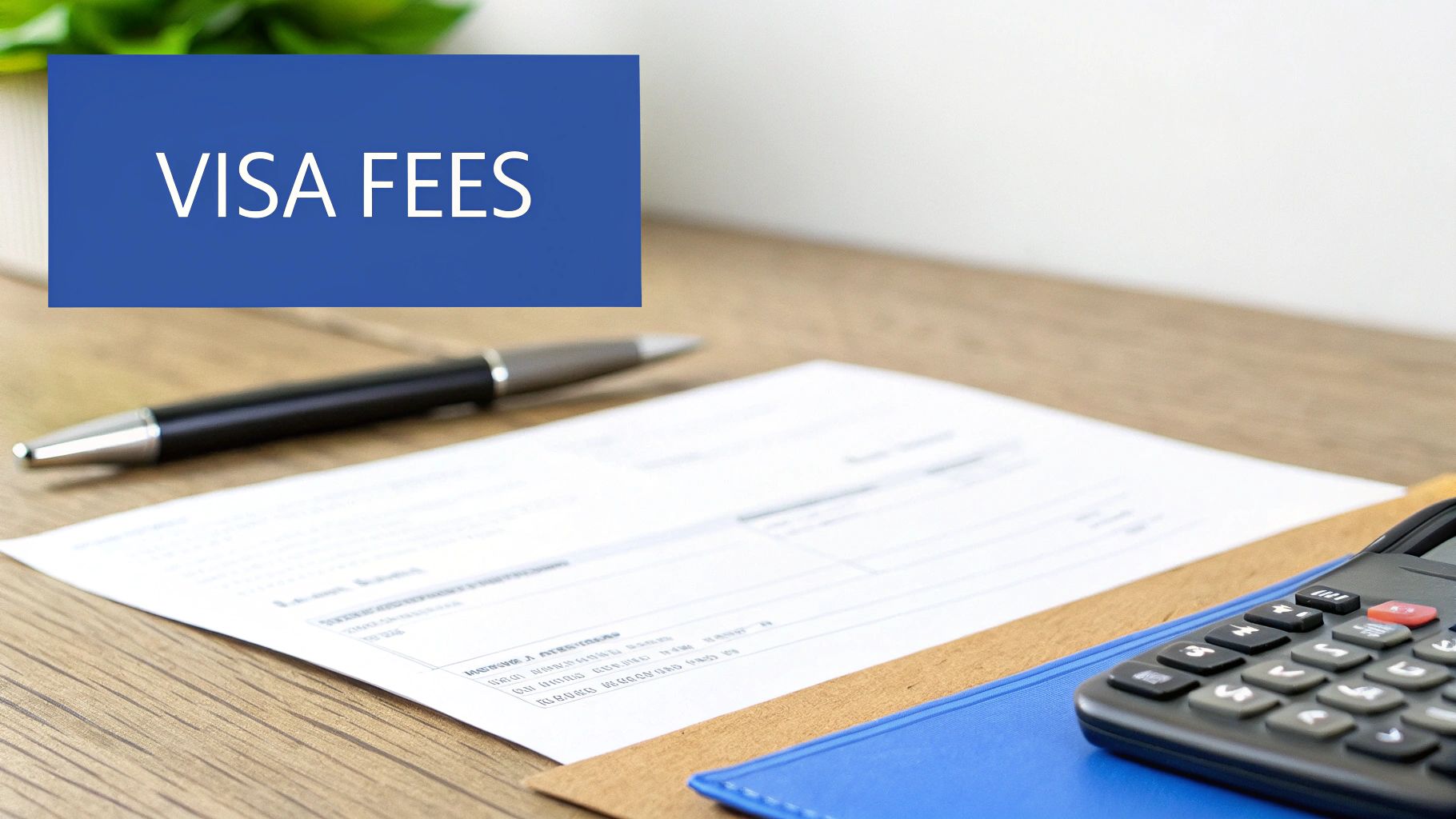
Getting your UK visa application right involves two big questions: how much will it cost, and how long will it take? A bit of planning here goes a long way. Budgeting isn't just about the main application fee; you've also got to think about other services that could speed things up if you're in a hurry.
Let's break down the costs and timelines so you can map out your application with zero stress.
A Clear Breakdown of UK Visit Visa Fees
The price tag on your UK visit visa is tied directly to how long you want it to be valid for. It's a simple case of the longer the visa, the higher the fee.
One key thing to remember is that the official fees are set in British Pounds (£). This means the amount you pay in Naira will shift depending on the exchange rate on the day of your payment.
Here’s the current fee structure for standard visit visas:
- Short-term (up to 6 months): The go-to option for most travellers, this costs £115.
- Long-term (up to 2 years): If you see yourself making frequent trips, this one costs £400.
- Long-term (up to 5 years): For regular visitors, the fee is £771.
- Long-term (up to 10 years): The longest-term visa available will set you back £963.
Need a Faster Decision? Optional Priority Services
If you're pressed for time and can't wait the standard period, you can pay extra to fast-track your application. The Priority Visa service aims to get you a decision within 5 working days for an additional £500.
For truly urgent travel plans, the Super Priority Visa service targets a decision by the next working day for an extra £1,000. These services are totally optional and only affect the processing speed, not the final decision itself.
Crucial Point: Paying for a priority service doesn't guarantee your visa will be approved. It only guarantees you’ll get a decision faster. Your application still has to be solid and meet all the usual requirements.
Standard Processing Times and What Might Slow Things Down
After you’ve given your fingerprints and photo (biometrics) at the TLScontact centre, the real wait begins. Typically, you can expect a decision on a standard UK visitor visa from Nigeria in about 3 weeks, which is 15 working days.
But, this is just an estimate. Life happens, and delays can pop up. That’s why it’s always smart to wait until you have the visa stamped in your passport before booking flights or accommodation you can't cancel.
So, what can cause a delay?
- You might be asked to attend an interview.
- The Home Office may need more time to verify your documents.
- If you have a past immigration or criminal issue, they will need to look into it more closely.
It’s also worth keeping an eye on the bigger picture. The UK is currently tightening its immigration rules, and this has led to applications from Nigeria coming under closer review. These changes, part of a wider effort to control immigration, can sometimes add to the processing time. You can learn more about how UK immigration new rules could affect your application.
Because of this increased scrutiny, it’s more important than ever to submit a complete, well-supported application that leaves no room for doubt.
Common Reasons Your Visa Might Be Refused (And How to Avoid Them)
Getting a visa refusal is a tough pill to swallow. It’s not just the disappointment; it’s the time and money you’ve lost. The good news is that most refusals for Nigerian applicants come down to a few common mistakes that are entirely avoidable.
Think of the visa officer's job: they need to be convinced you're a genuine visitor. Any doubt can lead to a "no." By understanding what raises red flags, you can build a much stronger application from the start.
Weak Finances and Vague Travel Plans
This is a classic trip-up. If your financial documents don't paint a clear, believable picture of your situation, you're heading for trouble. The most common issue is "funds parking"—when a large, unusual sum of money suddenly appears in your account right before you apply. To a visa officer, that screams "borrowed money."
Likewise, a travel plan that just says "for tourism" is too vague. It doesn't show you've put any real thought into your trip, and it makes it hard for them to believe you can afford it.
Here’s how to get it right:
- Show a 6-Month History: Your bank statements need to show a consistent flow of income and savings over the last six months. No shortcuts here.
- Explain Any Big Deposits: If a large sum did come in (like a gift from a relative), don't hide it. Include a signed letter from the person who gave you the money, plus proof of where their money came from.
- Create a Day-by-Day Itinerary: Be specific. Instead of "see London," write "Day 1: Arrive at Heathrow, check into hotel. Day 2: Visit the Tower of London and Tower Bridge." This shows you're a serious traveller.
Pro Tip: A well-written cover letter is your secret weapon. Use it to briefly explain the purpose of your trip and to get ahead of any questions about your bank statement. Being upfront builds trust.
Not Proving You'll Come Back to Nigeria
This is probably the biggest reason for refusals. The visa officer's number one question is: "Will this person leave the UK at the end of their visit?" Your application must provide undeniable proof of your strong ties to Nigeria. For a deeper dive, check out our guide on the top UK visa rejection reasons.
The UK's immigration landscape is getting tighter. Home Office data for 2024 revealed a 14% drop in sponsored study visa applications from Nigeria. Even more telling, dependent visa applications plummeted by 84%. This points to much stricter checks on every applicant's personal situation and intent.
To prove your ties, you need solid evidence of what’s waiting for you back home:
- Stable Employment: Get a formal letter from your employer. It should be on company letterhead and state your job title, salary, and confirmation that your leave has been approved for the trip.
- Family Commitments: Show them you have a family to return to. Include your marriage certificate and the birth certificates of your children.
- Property Ownership: If you own property, this is powerful evidence. Documents like a Certificate of Occupancy (C of O) show you have major assets in Nigeria that you wouldn't just walk away from.
Got Questions? We've Got Answers
https://www.youtube.com/embed/ZMByWenSRdI
Getting into the details of the UK visit visa requirements for Nigeria always brings up a few tricky questions. Let's tackle some of the most common ones we hear from Nigerian applicants, so you can get your application sorted with confidence.
Can My Family in the UK Sponsor Me?
Absolutely. A family member in the UK can provide a letter of invitation, plus proof of their own financial and immigration status, to support your application.
But here’s the crucial part: that sponsorship doesn't replace the need for you to prove your own ties to Nigeria. The UK Visas and Immigration (UKVI) officer is most interested in your personal situation.
Think of it this way: your sponsor’s support is a bonus, but the main story is about you. The UKVI needs to see clear evidence that you have a life—a job, family, or property—to come back to in Nigeria.
What if I'm Unemployed but Have Savings for the Trip?
It's definitely possible to get a visa without a formal job, but you’ll face more scrutiny. You have to be crystal clear about where your money comes from and how you support yourself back home.
You'll need solid proof, which could look like:
- Documents showing income from other sources, like rental properties or business dividends.
- Bank statements that show a consistent and healthy savings history over time, not just a sudden large deposit.
- Proof that a sponsor (like a spouse or parent) is funding you, backed by their own financial records.
Should I Buy My Flight Ticket Before I Apply?
No, please don't! You should never book non-refundable flights or pay for hotels until the visa is stamped in your passport. The UKVI themselves warn against this.
All you need to submit are flight reservations or itineraries and hotel bookings. Many travel agents in Nigeria can provide these for a small fee. Another great option is to find hotels online that offer free cancellation.
How Much Money Do I Really Need in My Account?
There isn't a fixed amount set in stone. The key is having "sufficient funds" to cover your trip's entire cost without needing to work or access public funds in the UK.
First, create a realistic budget: estimate your flight costs, accommodation, daily food and transport, and any tourist activities. The amount in your bank account should comfortably cover this total, plus have a little extra left over. This shows the visa officer you won't be financially stranded after your trip.
For example, proving you have funds for a £2,000 one-week holiday is very different from showing you can afford a £5,000 month-long stay. It all comes down to what makes sense for your travel plans.
Navigating the visa process can feel like a maze, but you’re not on your own. For quick, reliable answers to all your immigration questions, have a chat with JapaChat, Nigeria's AI immigration expert. It's the perfect way to get clear on your next steps. Start your free chat today!
-

How to Apply for Canadian Work Visa from Nigeria: Step-by-Step Guide
Getting your application for a Canadian work visa off the ground in Nigeria really boils down to one thing: a valid job offer from a Canadian employer. Think of this as your golden ticket.
Most of the time, this job offer needs to be backed by a document called a Labour Market Impact Assessment (LMIA). This is something your employer gets, and it basically proves to the Canadian government that no Canadian citizen or permanent resident was available to do the job. Once you have these two key pieces, you can start gathering your own documents and get your application submitted online.
Your Starting Point for a Canadian Work Visa
Trying to figure out the Canadian work visa process from Nigeria can feel like a maze, but it all starts with understanding your options. The whole journey depends on which work permit stream fits your situation. Getting this right from the beginning is absolutely crucial because it determines exactly what you need to do and what documents you'll have to provide.
This first phase is all about matching your skills and background to Canada's immigration rules. It's not just about wanting a job in Canada; it’s about showing you meet the specific criteria for a programme that's designed to bring in the talent the country needs.
Understanding the Main Work Permit Streams
For the majority of Nigerians, the path to working in Canada begins with an employer-specific work permit. Just as the name suggests, this permit ties you to a single employer and a specific job. To even apply for this, your prospective employer typically has to secure a positive LMIA. It’s their way of showing that hiring you won’t have a negative impact on local workers.
Then there's the open work permit. These are much harder to come by and are usually for people in very specific situations. For example, you might be eligible if you're:
- The spouse or common-law partner of an international student or a skilled worker.
- A recent graduate from a designated Canadian post-secondary institution.
- A participant in a special programme, like International Experience Canada (though this is less common for Nigerians).
An open work permit is fantastic because it gives you the freedom to work for nearly any employer in Canada. But be warned, the eligibility rules are incredibly strict.
Key Canadian Work Permit Types for Nigerian Applicants
To make it clearer, here’s a quick look at the most common work permit streams available to Nigerians and what each one really hinges on.
Permit Type Key Requirement Best For Employer-Specific (LMIA-based) A valid job offer supported by a positive Labour Market Impact Assessment (LMIA) from the employer. The most common route for skilled workers who have secured a specific job in Canada. LMIA-Exempt A job offer in an occupation that is exempt from the LMIA process (e.g., under an international agreement). Individuals with job offers in very specific, high-demand fields or under special programmes. Open Work Permit Meeting strict criteria, often related to your spouse's status in Canada or having recently studied there. Spouses of international students/skilled workers or recent graduates from Canadian schools. Each pathway has its own unique set of rules, so it's vital to know which one you're aiming for before you start pulling your documents together.
My Two Cents: Your job offer is everything. A solid, legitimate offer that comes with all the required employer paperwork (especially that LMIA) is the bedrock of your application. Without it, you're not going anywhere.
The journey itself can be broken down into three main stages, which this graphic illustrates quite well.
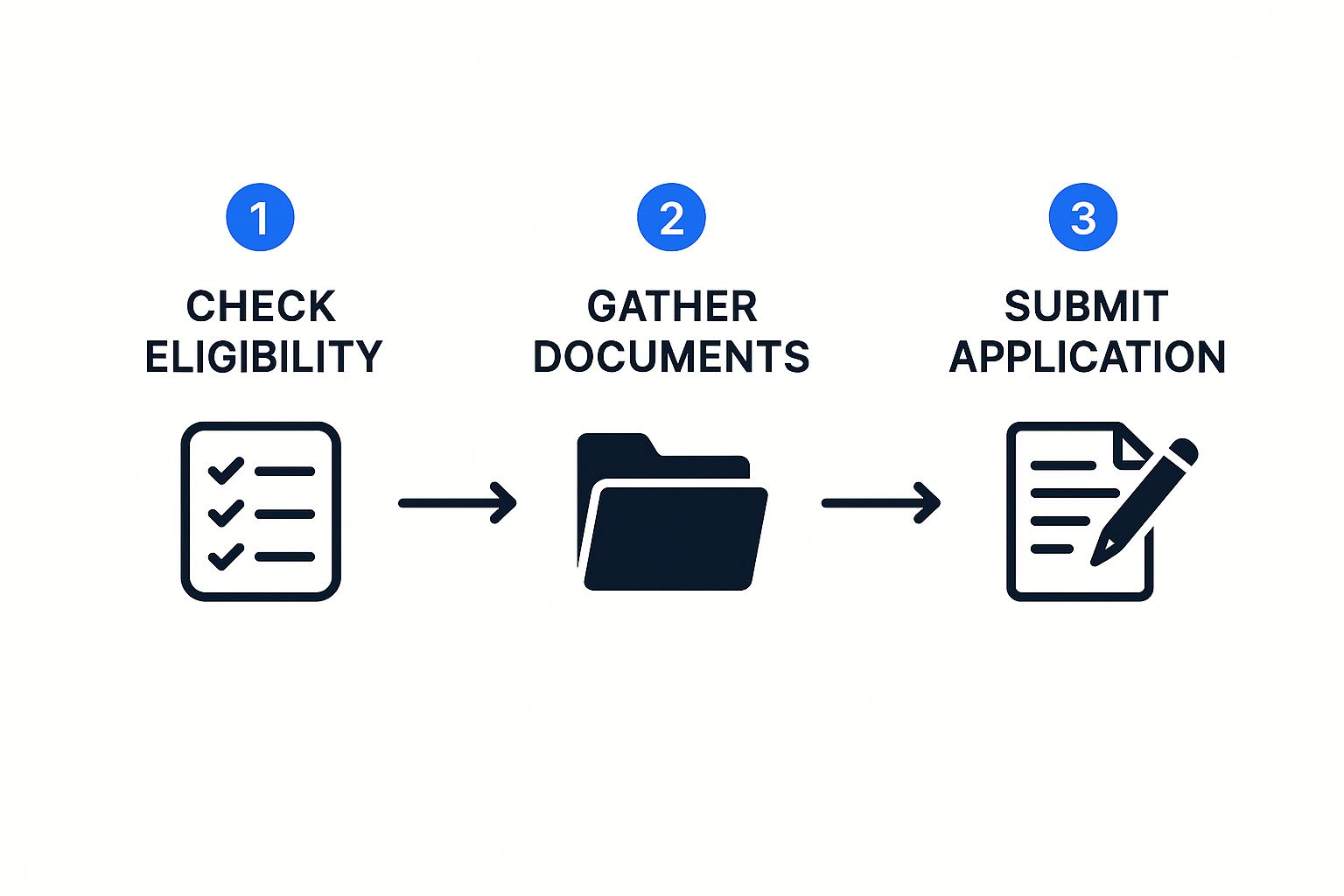
This visual just reinforces that you have to follow the steps in order. Checking your eligibility comes first, then you gather your documents, and only then do you submit. Trying to jump ahead will only cause problems.
Setting Realistic Expectations
It’s also smart to understand the bigger picture. Canada is looking to welcome a lot of new people, and many will come through economic pathways like work permits, as outlined in Canada's Immigration Levels Plan. For Nigerians, this is a double-edged sword: it means Canada wants skilled workers, but it also means the competition is fierce.
The Canadian government is working to process 80% of applications within its standard service times, but you need to do your part. You can learn more about Canada's immigration targets on canadavisa.com.
What does this mean for you? Your application has to be perfect. A single missing document or a confusing answer can lead to massive delays or, worse, a refusal. Take your time, understand the specific path you're on, and prepare your application with care. It's the best thing you can do to set yourself up for success.
Meeting Canada's Eligibility Criteria

Before you even think about filling out a single form, let's get one thing straight: you have to be absolutely sure you meet Canada's core eligibility standards. Think of this as the foundation of your application. If it’s shaky, the whole thing will come crashing down.
An immigration officer will be going through your file with a fine-tooth comb. They're not just checking if you’re a good fit for the job; they're trying to determine if you’ll be a credible temporary resident who respects the rules. At the end of the day, they are asking one simple question: "Does this person meet all our legal requirements, and will they actually leave when their visa expires?"
The Non-Negotiable Requirements
No matter what kind of work permit you’re applying for, there’s a set of universal criteria everyone has to meet. These are the absolute basics. Fail to meet even one, and you’re looking at an automatic refusal.
You need to prove to the visa officer that you:
- Will leave Canada once your work permit expires. This is probably the most critical point and the trickiest to prove.
- Have enough money to support yourself and any family coming with you, plus enough to get back home.
- Are in good health. This usually means getting a medical exam from an IRCC-approved doctor in Nigeria.
- Have a clean record with no criminal or serious immigration offences. You'll need a police clearance certificate for this.
- Don’t pose a security risk to Canada.
- Are being completely honest and have provided all the necessary documents.
Everything in your application should be geared towards reinforcing these points. You want to leave no room for doubt in the officer’s mind.
Proving You Intend to Return Home
This is the hurdle where so many Nigerian applications fall flat. The Canadian immigration officer needs to be convinced that you see your time in Canada as temporary. The best way to do that is by showing strong ties to Nigeria—basically, giving them compelling reasons why you have to come back.
So, what counts as a strong tie? It’s not just one thing, but a combination of factors. The more you have, the better your chances.
- Family Ties: Are you leaving a spouse, children, or elderly parents behind in Nigeria? These are powerful anchors.
- Employment: Do you have a good job to come back to? A letter from your current Nigerian employer granting you a leave of absence is solid gold.
- Property and Assets: Owning property, land, or having major financial investments in Nigeria shows you're planted there for the long term.
- Financial Stability: Established bank accounts and business interests in Nigeria prove you have a life and responsibilities to return to.
Real-World Scenario: Let's look at two applicants. Funke owns a flat in Lekki, her husband and two kids are staying in Nigeria, and she has an official letter from her company approving a one-year sabbatical. On the other hand, Ade is single, rents his apartment, and has just quit his job. Whose application looks more convincing? Funke’s, by a long shot. She has clearly demonstrated her strong ties to home.
Your mission is to paint a clear picture for the visa officer. Don't just tell them you'll leave; show them why you will. It’s a subtle but crucial difference. For a deeper look at the specific documents you'll need, our guide on how to apply for a work visa breaks it all down.
Showing You Have Enough Money
Another pillar of your application is proving you can support yourself financially. The Canadian government needs assurance you won't end up needing public assistance. There’s no single magic number for "proof of funds," as it depends on how long you're staying, if you're bringing family, and which city you'll be living in.
You must be able to show you can cover your initial expenses before that first Canadian paycheque comes in. This includes things like:
- Your flight to Canada.
- The first month's rent and a security deposit.
- Everyday living costs for the first few weeks.
You’ll need to provide clear, verifiable proof. We’re talking about official bank statements from the last four to six months, not just a letter from the bank with your closing balance. These statements need to show a stable financial history, not a huge sum of money that suddenly appeared last week. That’s a massive red flag for any visa officer.
A Practical Checklist for Required Documents
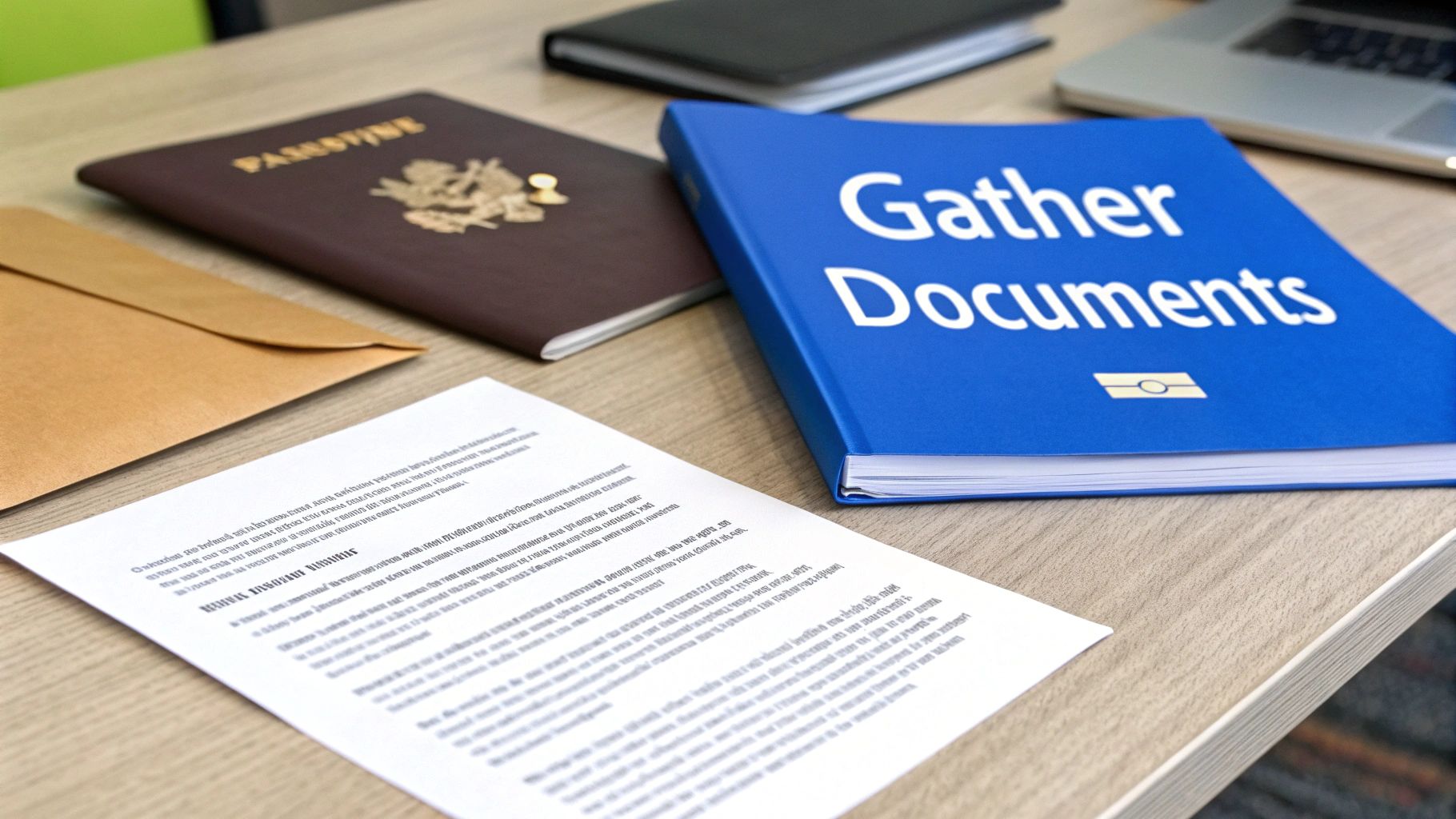
Getting your documents right is the foundation of a strong Canadian work visa application. I’ve seen it time and again: a single mistake, like an expired passport or a blurry scan, can bring the whole process to a screeching halt. This section is your hands-on guide to putting together a flawless package.
Think of yourself as a project manager, and this application is your baby. Every document is a crucial task you need to nail. It’s this attention to detail that often separates an approval from a refusal.
Core Personal Documents Everyone Needs
Let’s start with the basics. These are the non-negotiables—the documents every single applicant from Nigeria must have, no matter the job or permit type. Get these in order, and you're already on the right track.
First up, your Nigerian international passport. This is your most important travel document. It absolutely must be valid for the entire time you plan to be in Canada. If your passport is getting close to its expiry date, my advice is to renew it before you even think about starting your application.
You’ll also need two recent passport-sized photos. Make sure they meet IRCC's very specific rules for size, background, and even your facial expression. Don't dig up old ones; it's worth getting new photos taken just for this.
- Proof of Financial Support: You'll need to show bank statements from the last four to six months. What they're looking for is a consistent history of funds, not a huge lump sum that just appeared last week. For a deeper dive, check out our guide on the requirements for proof of funds in Canada.
- Police Clearance Certificate: This is an official document from the Nigerian Police Force that shows you have a clean record. You should apply for this early, as it can sometimes take a while to come through.
- Medical Examination: You must have a medical exam done by a panel physician in Nigeria approved by IRCC. You can't just go to your family doctor for this; it has to be one of their designated professionals.
Documents Related to Your Job Offer
Once your personal file is sorted, the next set of papers is all about your Canadian job offer. This is the proof that connects you to a specific employer and role in Canada.
The main piece of evidence here is your signed employment contract or official job offer letter. It needs to be on company letterhead and clearly spell out your job title, duties, salary, and working conditions. Leave no room for ambiguity.
Just as critical is the Labour Market Impact Assessment (LMIA) number. Your employer will give this to you. If your job is one of the few that are LMIA-exempt, your employer needs to provide the offer of employment number instead. Your application can't move forward without one of these numbers.
Expert Tip: Go through your job offer letter with a fine-tooth comb. Does the salary match what you discussed? Are the duties what you expected? An immigration officer will compare this letter against the LMIA details, and any little difference can raise a red flag.
Proving Your Work Experience and Qualifications
Finally, you have to prove you can actually do the job you’ve been hired for. This is where you provide solid evidence of your past work experience and education. Your mission is to convince the visa officer that you have exactly the skills the Canadian employer needs.
This means you'll need to gather reference letters from previous employers. A strong reference letter is on company letterhead, clearly states your job title and dates of employment, and lists your key responsibilities. Vague, one-sentence letters won't cut it.
- Educational Credentials: Have copies of your degrees, diplomas, or any relevant certificates ready. If you've gone through an Educational Credential Assessment (ECA), definitely include it, though it isn't always mandatory for a temporary work permit.
- Professional Designations: If your profession requires a specific licence or certification (like for engineers or nurses), you must provide proof that you hold it.
- Language Test Results: While not always a strict requirement for a work permit, strong English or French test scores (from a test like IELTS or CELPIP) can seriously boost your application. It shows you can easily fit into the Canadian workplace.
Remember to keep the bigger picture in mind. Canada has recently made shifts to its immigration policies that affect temporary residents, including work permit holders. These changes are designed to manage population growth and labour demands, which can mean tighter eligibility criteria. This makes submitting a perfectly prepared, thorough application more important than ever.
Getting Around the IRCC Online Portal
Alright, let's talk about the main event: the Immigration, Refugees and Citizenship Canada (IRCC) online portal. This is where you’ll pull everything together and officially submit your application. For anyone applying from Nigeria, getting comfortable with this portal isn't just a tech chore—it's your chance to present a clean, organised, and professional case.
Think of it this way: a sharp, well-managed online submission shows the visa officer you’re serious and detail-oriented. Every document correctly labelled and every form perfectly filled speaks volumes before they even read a word.
This is the IRCC homepage, your starting line for this whole digital process.
Get familiar with its layout. Knowing where to find the right forms and how to create your account will save you a ton of headaches later.
First Things First: Creating Your Secure IRCC Account
Your first real move is to set up a secure IRCC account. You'll see a couple of sign-in options, but for most applicants in Nigeria, the best route is to register with a GCKey. This is just a secure username and password that acts as your key to Government of Canada online services.
During setup, you'll need to create security questions. Please, don't just breeze through this part. Write down your answers and keep them somewhere safe. Trust me, the last thing you want is the stress of getting locked out of your account because you can't remember your first pet's name.
Building Your Personalised Document Checklist
Once you're in, the system won't just hand you a generic list of documents. It's smarter than that. You'll go through a questionnaire that builds a checklist tailored specifically to you. This is a make-or-break moment.
The questionnaire will ask about things like:
- Your country of citizenship (Nigeria)
- Your age, spouse, and children
- The exact type of work permit you’re after
- Your LMIA number or offer of employment number, if you have one
Your answers here are everything. They determine exactly which forms and supporting documents you need to upload. One wrong answer could send you down a completely incorrect application path.
My Advice: Before you even start that questionnaire, have your passport, job offer letter, and LMIA confirmation sitting right next to you. This helps you enter every date, name, and reference number with 100% accuracy. A tiny typo here can snowball into a massive problem.
Filling Out the Application Forms the Right Way
The portal will generate several forms for you, but the big one is the Application for Work Permit Made Outside of Canada (IMM 1295). You have to download this form, fill it out on your computer using a PDF reader, and then—this is crucial—validate it.
When you click the "Validate" button, a page of barcodes will appear at the end of the document. You must upload the version of the form that includes these barcodes. They hold all your entered data, allowing the IRCC system to process your info quickly. Submitting an unvalidated form is a classic mistake that can get your application sent right back to you.
Be clear and concise in your answers. If a form asks for your work history for the last 10 years, give them exactly that—no more, no less. Don't leave any time gaps. If you were studying or unemployed for a period, just say so. For a deeper dive into visa types, our guide on the differences between a Canada work visa and a work permit is a great resource.
Uploading Your Documents and Paying the Fees
The portal creates specific upload slots for every document on your checklist. Pay close attention to the file requirements. They usually accept PDF, JPG, or PNG files, but the maximum size is typically 4 MB per file.
If your document is too large, you'll have to compress it. Just make sure it's still perfectly legible. A blurry bank statement is as useless as no bank statement at all.
Finally, you'll be sent to the payment gateway to cover the application and biometrics fees. Make sure you use a credit or debit card that's approved for international payments. Once the payment goes through, you can hit submit.
Keep in mind that IRCC processes hundreds of thousands of work permit applications every year. While they aim to meet service standards for 80% of applications, the sheer volume can lead to delays. A complete and accurate submission is your best strategy for a smooth journey. You can learn more about IRCC's application processing capacities on their official site.
So, You've Submitted Your Application. Now What?

That feeling when you finally hit "submit" on your IRCC application is incredible, isn't it? But hold on, the journey isn’t quite over. Now comes the part that tests your patience, a phase of waiting and a few more crucial steps. Knowing what's coming next can make this period a whole lot less stressful.
The very first thing to do is keep a close eye on your IRCC account. Usually within 24 hours of submission, you should see a message pop up with your Biometric Instruction Letter (BIL). This is the document you absolutely need to move forward, as it’s your official invitation to provide your fingerprints and photo.
Don't Delay Your Biometrics Appointment
Once that BIL is in your hands (or, well, on your screen), your next move is to book an appointment at a Visa Application Centre (VAC) in Nigeria. You'll find them in major cities like Lagos and Abuja, and they are the only places officially authorised to handle biometrics for the Canadian government.
This step is time-sensitive. You have just 30 days from the date on your BIL to get your biometrics done, so don't put it off.
When you go to book your slot online, you'll need the reference number from your BIL. On the day, make sure you have these three things with you:
- Your valid Nigerian international passport.
- A printed copy of your Biometric Instruction Letter (BIL).
- The confirmation letter for your appointment.
The actual process is quick and painless. An official will take your digital fingerprints and a photo. It’s purely administrative, not an interview, so there’s no need to stress about being asked questions about your application.
The Real Deal on Processing Times
After your biometrics are in the system, the real waiting game begins. This is where you have to manage your expectations. While IRCC does provide estimated processing times on their website, think of them as general guidelines, not guarantees.
Your personal timeline can vary quite a bit. A super-clean application for an in-demand job with a well-known employer might sail through. But if your case has some complexities—maybe a previous visa refusal or documents that require extra verification—it’s naturally going to take longer.
Expert Tip: The processing clock doesn't start the moment you submit your application. It officially begins after your biometrics are completed. This is a common point of confusion that causes a lot of unnecessary worry for applicants.
How to Keep Tabs on Your Application Status
The best way to monitor your application's journey is by logging into your secure IRCC account. The status updates can be a bit generic, but they do give you a rough idea of where your file is in the queue. Don't expect to see changes every day; updates often happen in batches as your application moves from one stage to the next.
Here’s a quick rundown of what those common status updates really mean:
Status Update What It Usually Means Submitted IRCC has successfully received your application. Biometrics Completed Good news! The VAC has sent your biometrics to IRCC. Review of Eligibility An officer is now going through your documents to see if you qualify. Background Check Your information is being checked for any security or criminal flags. Final Decision A decision has been made. You'll get a message with the outcome soon. Seeing your status shift to "Background Check" is generally a positive sign—it confirms your file is actively being worked on. The "Final Decision" update will be followed by a message in your account. This will either be a passport request for visa stamping (congratulations!) or a letter explaining why the application was refused. For now, stay patient and check your account every so often for that all-important update.
Common Questions About the Canadian Work Visa
When you're deep in the process of applying for a Canadian work visa from Nigeria, a lot of "what if" questions pop up. It's completely normal. Even the best guides can't cover every single personal scenario.
Let's tackle some of the most frequent questions we get from applicants just like you, so you can have the clarity to keep moving forward.
Can I Bring My Family With Me on a Work Visa?
This is a big one, and the short answer is yes, you absolutely can. If you secure a valid work permit, your spouse or common-law partner can typically apply for an open work permit. This is fantastic because it means they can work for almost any employer in Canada, giving your family a lot more flexibility.
Your dependent children can join you as well. Depending on their age, they'll need either a visitor record or, if they'll be in school, a study permit. A key piece of advice: try to submit their applications at the same time as yours. If that's not possible, do it right after your own work permit gets approved to keep the process smooth.
What Happens if My Work Visa Application Is Refused?
Getting a refusal notice is tough, but it doesn't have to be the end of your Canadian dream. Don't panic. The very first thing you need to do is read that refusal letter, word for word. The immigration officer is required to explain exactly why they said no.
For many Nigerian applicants, the reasons often boil down to a few common issues:
- Weak ties to Nigeria: The officer wasn't convinced you have strong enough reasons (family, property, a career path) to return home once your work permit expires.
- Shaky proof of funds: Your financial documents might not have shown a stable, sufficient amount of money to support yourself.
- Doubts about the job offer: Sometimes, the officer might question if the job offer is genuine or if you're truly qualified for the role.
Once you pinpoint the problem, you can plan your next move. You can reapply, but only if you can provide new, compelling evidence that directly addresses the officer's concerns. Just sending the same old documents back is a surefire way to get another refusal.
How Much Money Do I Need for Proof of Funds?
There's no single magic number that works for everyone. The amount you need really depends on your situation—are you coming alone or with family? The goal is to prove to the visa officer that you can handle your initial costs when you land in Canada, well before you get your first salary.
Think about what you'll need to cover right away:
- Your flight to Canada.
- The first month's rent plus a security deposit.
- Basic living expenses like groceries, transport, and setting up utilities for a few weeks.
A good benchmark to aim for is at least $2,500 to $3,500 CAD for a single person. If you're bringing family, add about $2,000 CAD for each person. But here’s the real expert tip: the history of your funds is more important than the final balance. A large sum of money that suddenly appears in your account looks suspicious. Consistent savings over several months looks credible.
Can I Work for a Different Employer on My Visa?
This is a critical point to understand. It all comes down to the type of work permit you have. Most first-time work permits issued to Nigerians are employer-specific. This means your permit is tied to the single employer who gave you the job offer.
If you get a new job offer and want to switch employers, you can't just quit and start the new role. You must apply for and receive a brand new work permit that names your new employer. Starting a new job before that new permit is approved is a serious violation of your visa conditions and could get you into a lot of trouble, potentially even ruining your future in Canada.
Ready to take the guesswork out of your immigration planning? JapaChat is Nigeria’s first AI immigration expert, designed to give you instant, accurate answers to all your relocation questions. Get started for free and join over 10,000 Nigerians planning their move with confidence. Start your journey today at https://japachat.com.
-

How to Apply for UK Visa in Nigeria: Complete Guide
Navigating the UK visa application process in Nigeria really boils down to three core things: filling out the online form correctly on the GOV.UK website, paying the right fees on time, and showing up for your biometric appointment at a TLScontact centre.
Ultimately, your success hangs on providing strong supporting documents that clearly prove you have the funds for your trip and a genuine reason for visiting.
Your UK Visa Application Roadmap From Nigeria
So, you're planning a trip to the UK from Nigeria. The whole process can feel a bit overwhelming at first glance—a mountain of paperwork and steps that aren't always crystal clear. But if you break it down into a clear plan, it's far more manageable. I like to think of it as a roadmap with distinct milestones: getting ready, hitting submit, and waiting for the final decision.
It helps to know who you're dealing with. The final "yes" or "no" comes from UK Visas and Immigration (UKVI), which is part of the UK government. Here in Nigeria, they work with a commercial partner, TLScontact, which runs the Visa Application Centres (VACs). This is where you'll go to give your fingerprints and have your photo taken.
Key Milestones on Your Journey
Let's walk through the main phases of your application journey. Getting these right from the start makes a world of difference.
-
Figuring Out Your Visa Type: This is ground zero. You absolutely have to choose the correct visa category for your trip, whether you're going as a tourist, student, worker, or to join family. Picking the wrong one is an easy way to get an automatic refusal, so double-check you're on the right track.
-
Nailing the Online Application: This is your official pitch to the visa officer, all done through the GOV.UK portal. Be meticulous. Every detail needs to be accurate, and honesty is non-negotiable.
-
Assembling Your Evidence: This is where you back up all the claims you made on your form. You'll need to pull together a solid portfolio of documents—think bank statements, letters from your employer, proof of ties to Nigeria, and your travel history.
-
Booking and Attending Your Appointment: Once the online form is submitted and you've paid the fees, you'll need to book an appointment at a TLScontact centre. This is a mandatory step to provide your biometric information.
To give you a clearer picture, here’s a quick summary of the main stages you'll go through.
UK Visa Application Stages at a Glance
Stage What It Involves Key Tip 1. Preparation Choosing the right visa type and gathering all necessary supporting documents. Start collecting documents before you even touch the online form to avoid last-minute stress. 2. Online Submission Completing the application form on the official GOV.UK website and paying the visa fee. Double-check every single entry for accuracy before you submit. A small mistake can cause big delays. 3. Biometrics Appointment Booking and attending an appointment at a TLScontact centre to give your fingerprints and photo. Arrive at the centre at least 15 minutes before your scheduled time. 4. Decision Waiting for UKVI to assess your application and make a final decision. You can track your application status online, but be patient as processing times can vary. Following these stages logically is the key to a smooth process.
This visual breaks down how these core phases connect.
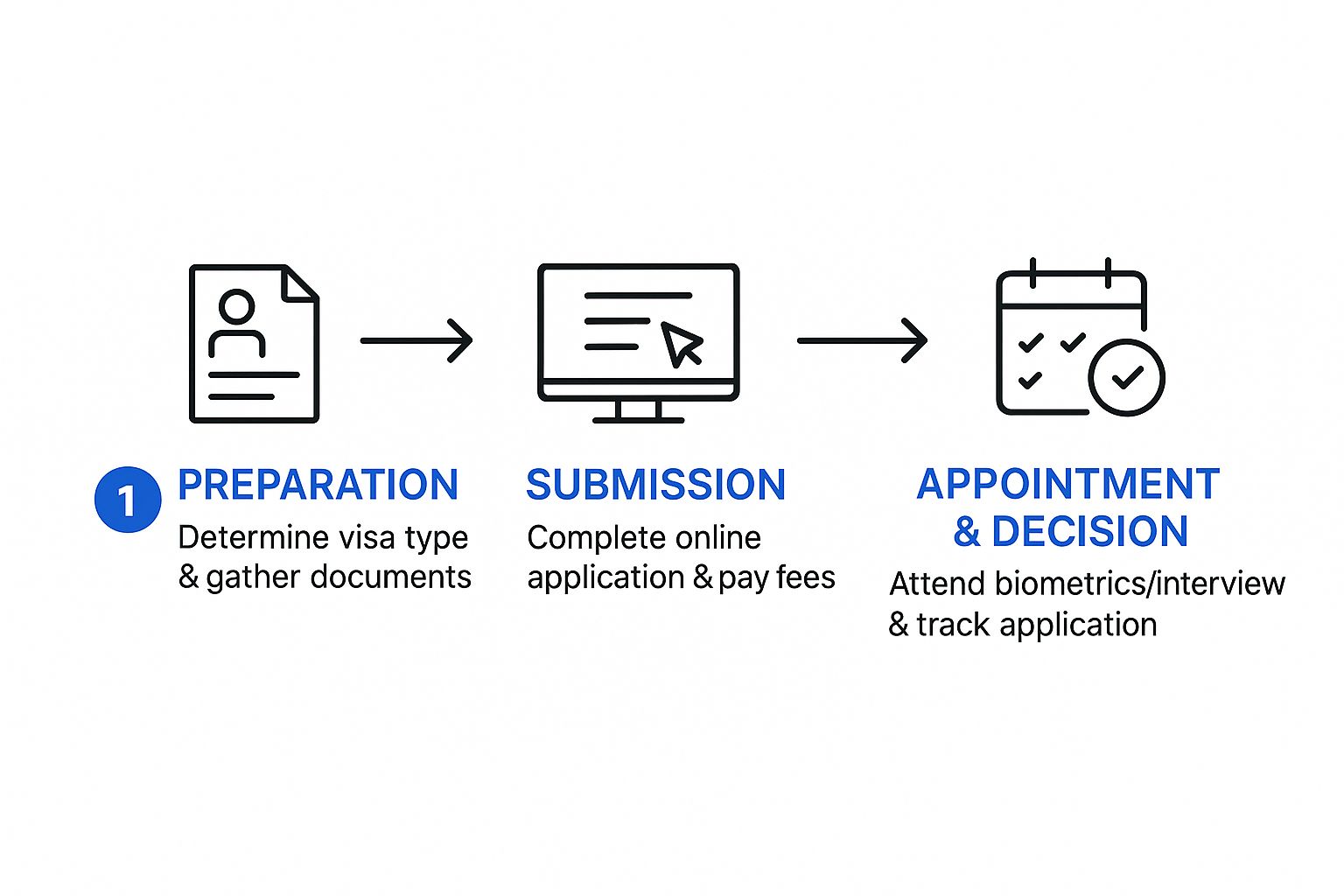
As you can see, it all flows from solid preparation right through to your appointment.
Pro Tip: If I could give just one piece of advice, it would be this: start gathering your documents before you even begin the online application. Honestly, this simple step saves so much last-minute panic and ensures you have strong, compliant evidence ready to go when it’s time to submit.
Choosing the Right UK Visa for Your Trip

The very first, and most crucial, step in this entire process is picking the correct visa. I can't stress this enough. Getting it wrong isn't a simple mistake you can fix later—it’s an automatic refusal. You lose your time, effort, and all that non-refundable application money.
The UK visa system is incredibly specific. You absolutely must choose the category that perfectly matches your reason for travelling. For most Nigerians, the choice will boil down to one of three main visa types. Let's break them down with some real-life examples so you can be sure you're starting off on the right foot.
The Standard Visitor Visa
This is the go-to visa for almost all short trips to the UK. It covers a surprisingly wide range of activities, but the golden rule is that your visit must be temporary.
You'll need a Standard Visitor Visa if you’re planning to:
- Be a tourist: You’re heading to London to see the sights, maybe catch a football match, or explore the Scottish Highlands.
- Visit family or friends: This could be for a short holiday with your sibling in Manchester or to attend a friend's wedding in Birmingham.
- Handle short-term business: You’re flying in for a three-day industry conference or a crucial meeting with a client. This is a common point of confusion—you do not need a work visa for these kinds of brief business activities.
- Get private medical treatment: You have pre-arranged appointments at a UK hospital or clinic.
The most important thing to remember is that you cannot do any paid work for a UK company on this visa. The Home Office needs to be convinced that you fully intend to return to Nigeria when your visit is over.
The Student Visa
This one is pretty straightforward. It's designed exclusively for people who have a confirmed offer to study at a licensed UK educational institution.
The absolute key to this application is your Confirmation of Acceptance for Studies (CAS). This isn't just a letter; it's a unique reference number given to you by your university or college after you've accepted their admission offer. You simply cannot apply without a valid CAS. It's the official proof to the UK Visas and Immigration (UKVI) that you're a genuine student with a legitimate place on a course.
The Skilled Worker Visa
If you've landed a job with a UK-based company, this is the visa for you. The Skilled Worker route is a long-term visa that allows you to live and work in the UK for the employer who hired you.
For this application, your employer provides the most critical piece of the puzzle: the Certificate of Sponsorship (CoS). Your employer must hold a special sponsor licence from the Home Office to issue this. The CoS is an electronic record with its own unique number, detailing your personal information and everything about the job you've been offered. It’s essentially your employer's official guarantee to the government that you're the right person for the job.
Immigration rules can and do change, sometimes quite suddenly. To get a better grasp on recent policy updates that might impact your application, it's worth reading up on the new UK immigration white paper and what every Nigerian should know.
Making sure your travel plans perfectly align with one of these three routes is the foundation of a successful UK visa application from Nigeria. If there's a mismatch, your application is destined to fail before a visa officer even looks at your bank statements.
Navigating the Online Form and Financial Rules
This is it. The official GOV.UK application form is where your UK visa journey truly begins. Think of this online portal as your first—and most important—conversation with the visa officer. Everything you put here needs to be precise, honest, and paint a consistent picture of who you are.
Every single field matters. From your personal details to your travel history, accuracy is king. Be ready to list every country you’ve set foot in over the past 10 years. Even forgetting a short weekend trip to a neighbouring country can create inconsistencies that raise red flags and make the officer question your credibility. Your goal is simple: present a clear, truthful account of yourself.
Tackling the Application Form
First things first, you’ll need to create an account on the official UK government visa portal. The good news is that the system saves your progress, so you don't have to do it all in one stressful sitting. You can log in and out as you gather your information.
This screenshot shows you exactly what the official starting page looks like. This is where you'll select your visa type and get the ball rolling.
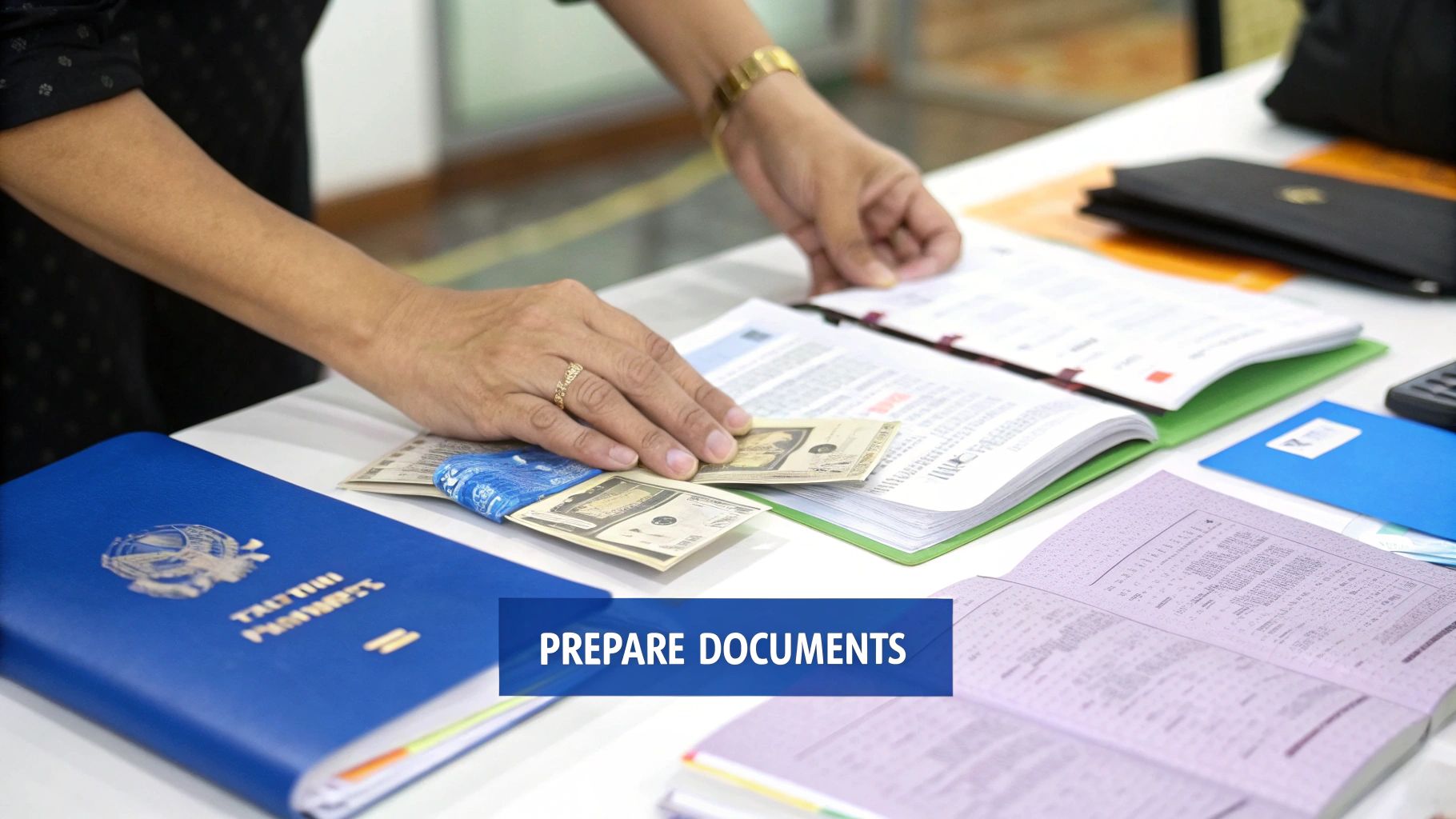
Make no mistake, this is the only legitimate website to start your application. Using this ensures you’re on the correct, secure government service and not a third-party site.
Understanding the Financial Requirements
Let's be blunt: this is where many applications fall apart. Getting the financial rules wrong is one of the most common reasons Nigerians get refused a UK visa. The visa officer needs to be completely convinced that you can support yourself during your stay without needing to access public funds.
This proof comes down to what's known as maintenance funds. How much you need depends entirely on the type of visa you’re applying for.
- Visitor Visa: You have to prove you have enough cash to cover every reasonable cost of your trip—flights, accommodation, food, sightseeing—without working or relying on UK benefits. There's no magic number; it just has to be credible for your planned itinerary.
- Student Visa: The calculation here is more specific. You must show you can pay for one full academic year of your course fees, plus a set amount for living costs. This is £1,023 per month if you're studying outside London, or £1,334 per month inside London, for up to 9 months.
- Skilled Worker Visa: Generally, you'll need to show you have at least £1,270 in your bank account. The only exception is if your UK employer is an A-rated sponsor and has officially stated on your Certificate of Sponsorship that they will cover your maintenance costs for the first month.
The 28-Day Rule: Don't Get Caught Out
For Student and Skilled Worker visas, this is non-negotiable. The full amount of required funds must have been in your bank account for at least 28 consecutive days. The statement you submit must show that this 28-day period ended no more than 31 days before you submit your application. It’s a strict rule with no wiggle room.Recent policy changes have put an even bigger spotlight on an applicant’s financial stability. While rule changes led to a staggering 84% drop in dependent visas issued to students, the actual rejection rate for genuine student visas remained incredibly low at just 3-5%. This tells us one thing: applicants who meet the tough financial rules are still very likely to be approved. You can find more data on these visa trends to see the bigger picture.
Presenting Your Financial Evidence
Just having the money isn’t enough; you must present the evidence in the exact format UK Visas and Immigration (UKVI) requires. They will only accept official bank statements. No letters from the bank manager, no screenshots—just the proper statements.
Your bank statements must clearly show:
- Your name (or the account holder's name, if it's a parent/sponsor)
- The account number
- The date the statement was issued
- The bank's name and logo
- A clear running balance showing the funds available
A word of advice: avoid sudden, large cash deposits right before you apply. This is a classic red flag for visa officers, as it suggests the money might not genuinely be yours ("funds parking"). They want to see a history that shows the money has been built up or has been sitting in your account for a while. Providing clear, compliant, and credible financial documents is the best way to clear this major hurdle.
Preparing Your Essential Supporting Documents

Think of your supporting documents as the backbone of your entire visa application. Everything you've stated on your online form is just a claim until you provide the hard evidence to back it up. This is where you prove your case.
A well-organised, complete set of documents tells the visa officer a clear, credible story about who you are and why you should be granted a visa. A messy, incomplete file? That just creates doubt and raises red flags. It’s not just about ticking boxes; it's about building a compelling argument for your trip.
The Non-Negotiables: Core Documents for Nigerian Applicants
No matter which UK visa you’re applying for, a few documents are almost always required. Get these right from the very beginning, as any mistake here can be an instant deal-breaker.
- Your International Passport: This is obvious, but check the details. It must be valid for your entire planned stay in the UK and have at least one completely blank page for the visa sticker.
- Proof of Financial Capacity: You'll need six months of official, stamped bank statements. They have to clearly show your full name, account number, and the bank’s logo. The goal is to prove you can comfortably cover all the costs of your trip.
- Tuberculosis (TB) Test Certificate: This is mandatory if you intend to stay in the UK for more than six months. You can't just go to any clinic; it must be done at a UK Home Office-approved centre in Nigeria.
These three are your foundation. Once you have them sorted, you can move on to the specific evidence your visa type requires.
Tailoring Documents to Your Specific Visa
This is where the real work begins. The documents you need will change drastically depending on whether you’re going as a tourist, a student, or for work.
Applying for a Standard Visitor Visa?
Your primary mission here is to convince the visa officer that you have strong ties to Nigeria and will definitely return home after your visit.
- Letter of Employment: Get an official letter from your employer on company letterhead. It should state your job title, salary, how long you've worked there, and confirm that your leave for the trip has been approved.
- Payslips: Provide your last six months' payslips. This directly supports the salary figure mentioned in your employment letter.
- Proof of Assets: If you own property or have significant investments in Nigeria, include the documents. This is powerful evidence that you have a life to come back to.
Applying for a Student Visa?
For students, the focus shifts entirely to your academic intentions and your ability to fund your education and living expenses without issues.
- Confirmation of Acceptance for Studies (CAS): This is the single most critical document for a student visa. It's a unique reference number issued by your UK university after you've accepted their offer.
- Academic Records: Include the transcripts and certificates for the qualifications that got you admitted into your UK course.
- Proof of Maintenance Funds: You must provide bank statements showing you have enough money to cover your first year's tuition fees and the required living costs. The rules for this are very strict.
It's worth noting that the Home Office is paying very close attention to applications from Nigeria. For instance, demand for UK study visas from Nigeria shot up by a massive 64% in the first quarter of 2025. This surge means every document is being scrutinised more intensely than ever. Your evidence needs to be solid and easy to verify.
A Quick Tip from Experience: Never assume a document speaks for itself. If someone else is sponsoring your trip, for example, don’t just submit their bank statement. You need a signed sponsorship letter, a copy of their passport’s data page, and their bank statements to create a clear, undeniable link.
The specific visa you're applying for also affects the cost, which can in turn influence the financial documents you need to show. For a full breakdown of the expenses involved, you can check out our guide on the complete UK work visa cost.
What to Expect at Your Biometric Appointment
You've done the hard part—filling out the forms and paying the fees. Now comes the in-person bit: your biometric appointment. This is where you’ll give your fingerprints and have your photo taken at a TLScontact Visa Application Centre (VAC), which you'll find in Lagos and Abuja.
This step is non-negotiable; without your biometrics, your visa application simply can't move forward.
Once your payment is confirmed, the UK government website will automatically push you over to the TLScontact portal. You'll need to create an account there to see the appointment calendar and pick a slot. A word of warning: standard appointments are free, but they vanish fast, particularly during the summer rush or before Christmas.
Choosing Your Appointment Service Level
On the TLScontact site, you’ll see a menu of options beyond the standard booking. It's easy to get overwhelmed, but here's a simple breakdown of what these paid services actually offer.
- Standard Appointment: This is the basic, free option included in your visa fee. You show up at your allotted time and wait your turn. It gets the job done.
- Premium Lounge: For an extra fee, you get access to a separate, more comfortable lounge. Think fewer crowds, complimentary drinks, and more personalised assistance. It’s a bit of an upgrade for your comfort.
- Walk-in Service: Can't find a slot that works for you? Some centres let you walk in on a specific day for a fee. This is great if you're in a real hurry, but it comes at a price.
It's crucial to understand that paying more for these services has zero impact on whether your visa is approved. You're purely paying for a more convenient or comfortable experience at the VAC itself. If you're on a budget, stick with the standard appointment—it works just fine.
My Two Cents: The premium services are all about saving time and reducing stress. If you have a demanding job and can't afford to spend hours at the centre, or if you just want a calmer process, the extra cost for a premium lounge can be money well spent.
On the Day: What to Bring and How to Prepare
A little preparation goes a long way in making your appointment day a breeze. Plan to arrive at the TLScontact centre at least 15 minutes before your scheduled time. You don't want to be flustered by traffic or last-minute delays.
You actually don't need to carry a mountain of paperwork with you. Just bring the essentials:
- Your valid international passport.
- Your appointment confirmation letter (a printout or just the email on your phone is fine).
- The document submission checklist, especially if you uploaded your documents yourself.
Once you're inside, you’ll clear a quick security check. A TLScontact agent will then call you up to check your passport and appointment letter before guiding you to the biometrics booth. In the booth, they'll scan your fingerprints and take a digital photo.
The whole thing is usually over pretty quickly. Just listen to the instructions from the staff, and you'll be out of there before you know it.
Common UK Visa Questions From Nigerians
Even with the best preparation, the UK visa process can throw a few curveballs. Knowing what to expect and having answers to the most common questions can save you a world of stress and help you sidestep simple mistakes that could sink your application.
Let's walk through some of the queries that pop up most often for Nigerians, so you can move forward with confidence.
What Are the Top Reasons UK Visas Are Refused for Nigerians?
Getting that refusal notice is a punch to the gut, but it almost always boils down to a few common, avoidable issues. The number one reason, by far, is failing to prove you have enough money for your trip. This isn't just about the amount in your account; it's about proving the funds are legitimately yours and have been stable for the required period.
Another major red flag for visa officers is what they call "lack of ties to home country." If they aren't convinced you have solid reasons to return to Nigeria—think a steady job, business ownership, family commitments, or property—they might suspect you intend to overstay.
Finally, a surprisingly common reason for refusal is simply submitting incomplete, inconsistent, or even fake documents. Every detail has to line up perfectly.
Key Takeaway: A successful application hinges on proving two things beyond doubt: your financial stability and your genuine intention to return to Nigeria after your visit.
How Long Does a UK Visa Decision Take in Nigeria?
This is the hard part—the waiting game. After you've done your biometrics, the standard processing time for most non-settlement visas, like for visiting or studying, is officially 15 working days. That's about three weeks, not including weekends or public holidays.
But remember, that's a guideline, not a guarantee. The actual timeline can shift depending on how busy the decision-making centres are.
If you're in a rush, you can pay extra for faster services:
- Priority Visa: Usually gets you a decision in 5 working days.
- Super Priority Visa: Aims for a decision by the next working day.
Always check the latest processing times on the official GOV.UK website before you finalise your plans.
Can Someone Else Sponsor My Visa Application?
Yes, absolutely! Having a sponsor, either in Nigeria or the UK, pay for your trip is perfectly normal and very common. The key is to provide crystal-clear evidence that leaves the visa officer with no questions.
You'll need to arm yourself with solid proof:
- A signed letter of sponsorship from the person funding your trip, explaining their relationship to you and what costs they will cover.
- Their official bank statements, which must meet the same strict standards as your own would.
- A copy of the bio-data page of their passport (or other official ID).
- Proof of your relationship to them—a birth certificate for a parent, a marriage certificate for a spouse, etc.
The responsibility is on you to prove the sponsor has the money and that your relationship is genuine. For a deeper dive into all the paperwork you might need, you can review our detailed guide on UK visa requirements for Nigerian citizens.
Feeling overwhelmed by the paperwork? JapaChat is here to help. As Nigeria's first AI immigration expert, we provide instant, accurate answers to your specific questions about visas, documents, and relocation planning. Sign up for free and start your journey with confidence at https://japachat.com.
-
-

Canada Visa Requirements for Students Guide
Securing your spot to study in Canada really comes down to ticking three major boxes. You’ll need an acceptance letter from an approved school, solid proof that you can pay your way, and strong evidence of your ties back home to Nigeria. It's important to remember that you're applying for a study permit, not a visa—think of it as your official pass to a Canadian education.
Starting Your Journey to Study in Canada
Welcome to your complete guide on what it takes for a Nigerian student to get a Canadian study permit. Before we get into long checklists, it’s really helpful to understand the thinking behind the whole process. When a Canadian immigration officer looks at your file, they're essentially trying to answer three big questions. Your job is to make sure your application tells a clear and convincing story.
The entire process rests on three pillars, and your success hinges on how well you build up each one. You have to prove you're a genuine student, show you won't become a financial burden in Canada, and convince them you'll respect the rules and head back home after your studies. Every single document you submit is there to support one of these pillars.
The Three Pillars of Your Application
Let’s break down exactly what each pillar means for you as an applicant from Nigeria:
-
Academic Legitimacy: This is all about your Letter of Acceptance (LOA) from a Designated Learning Institution (DLI). It’s the official document that shows you have a legitimate reason to come to Canada.
-
Financial Capacity: You must prove you have enough money to cover your tuition and living costs for at least the first year. This gives the visa officer peace of mind that you can actually focus on your schoolwork without financial stress.
-
Intent to Return: This is often the trickiest part for many students. You need to show that you have strong ties to Nigeria—like family, property, or a promising career path—that give you a very good reason to return after you graduate.
Think of your study permit application like building a house. Your acceptance letter is the foundation, your proof of funds are the strong walls, and your ties to home are the solid roof. Without all three, the structure is incomplete and simply won't get approved.
To give you a quick overview before we dive into the nitty-gritty details, here’s a table that pulls together the main document categories and what each one proves to the immigration officers.
Core Requirements for a Canada Study Permit At a Glance
Requirement Category What It Proves Key Documents Acceptance & Identity You are a genuine student with a valid reason to be in Canada. Letter of Acceptance (LOA), Valid Passport Financial Support You have the funds to cover tuition and living expenses. Bank Statements, GIC, Sponsorship Letter Ties to Home Country You intend to leave Canada after completing your studies. Family Documents, Property Deeds, Job Offers This table acts as a great starting point, but we'll explore each of these requirements in much more detail to ensure you're fully prepared.
Confirming You're Eligible to Apply

Before you spend a single Naira on application fees or start chasing down documents, the very first thing you need to do is confirm you actually meet the basic Canada visa requirements for students. Think of it as the security check before you even get to the airport; if you don't have the right papers, the journey stops before it begins.
Immigration, Refugees and Citizenship Canada (IRCC) lays out a clear set of criteria for every international student. These aren't just suggestions or friendly tips—they are strict, mandatory requirements that will make or break your application. Your goal is to tick every single box with confidence before you fill out a single form.
Essentially, the main requirements fall into a few key areas. You'll need an acceptance letter from the right kind of school, enough money to support yourself, a clean bill of health, and no serious criminal history. Let's dig into what each of these really means for you as a Nigerian applicant.
Your School Must Be a Designated Learning Institution
That acceptance letter is your golden ticket, but not all schools are created equal in the eyes of Canadian immigration. The institution you plan to attend must be a Designated Learning Institution (DLI). Simply put, a DLI is a school that has been approved by the government to host international students.
If your school isn't on the official DLI list, you cannot get a study permit. It’s that black and white. Always double-check your school's DLI status on the official Government of Canada website before you even think about paying a tuition deposit.
I can't stress this enough: this step is non-negotiable. Applying with a letter from a non-DLI school is a guaranteed refusal and a complete waste of your time and money.
Proving You Have Sufficient Financial Support
This is often the biggest hurdle for Nigerian students. You have to prove to the visa officer, beyond any doubt, that you can cover your tuition fees and living expenses without needing to work illegally or rely on Canadian public funds.
For 2024, a single student applying to study anywhere in Canada (except Quebec) must show they have funds for:
- Your first year of tuition fees (the exact amount will be on your Letter of Acceptance).
- CAD $20,635 to cover your living expenses for the first year.
So, if your tuition is CAD $18,000, you need to show proof of at least CAD $38,635. But it's not just about having the money in an account. It's about proving where it came from. Large, last-minute deposits into your bank account just before applying are a massive red flag for visa officers.
A strong financial profile tells a story of stability. The visa officer wants to see that these funds are genuinely yours (or your sponsor's) and have been sitting in the account for a reasonable amount of time—not just borrowed for the application.
Meeting Health and Character Requirements
Canada is serious about protecting the health and safety of its people. As an applicant, you have to show that you're in good health and are a law-abiding individual.
This usually comes down to two main checks:
- A Medical Examination: You will most likely need to do an upfront medical exam with an IRCC-approved doctor (called a panel physician) in Nigeria. The exam checks for any health conditions that could be a risk to public health or put a heavy strain on Canada's healthcare system.
- Police Certificates: You must prove you don't have a serious criminal record that would make you inadmissible to Canada. While you might not need this right away, be prepared to provide police clearance certificates from Nigeria and any other country where you've lived for six months or more since you turned 18.
Nailing these basic eligibility points is the foundation of your entire application. For a wider view of the entire process, have a look at our comprehensive guide on how to relocate to Canada from Nigeria, which covers more aspects of the journey.
Your Essential Document Checklist
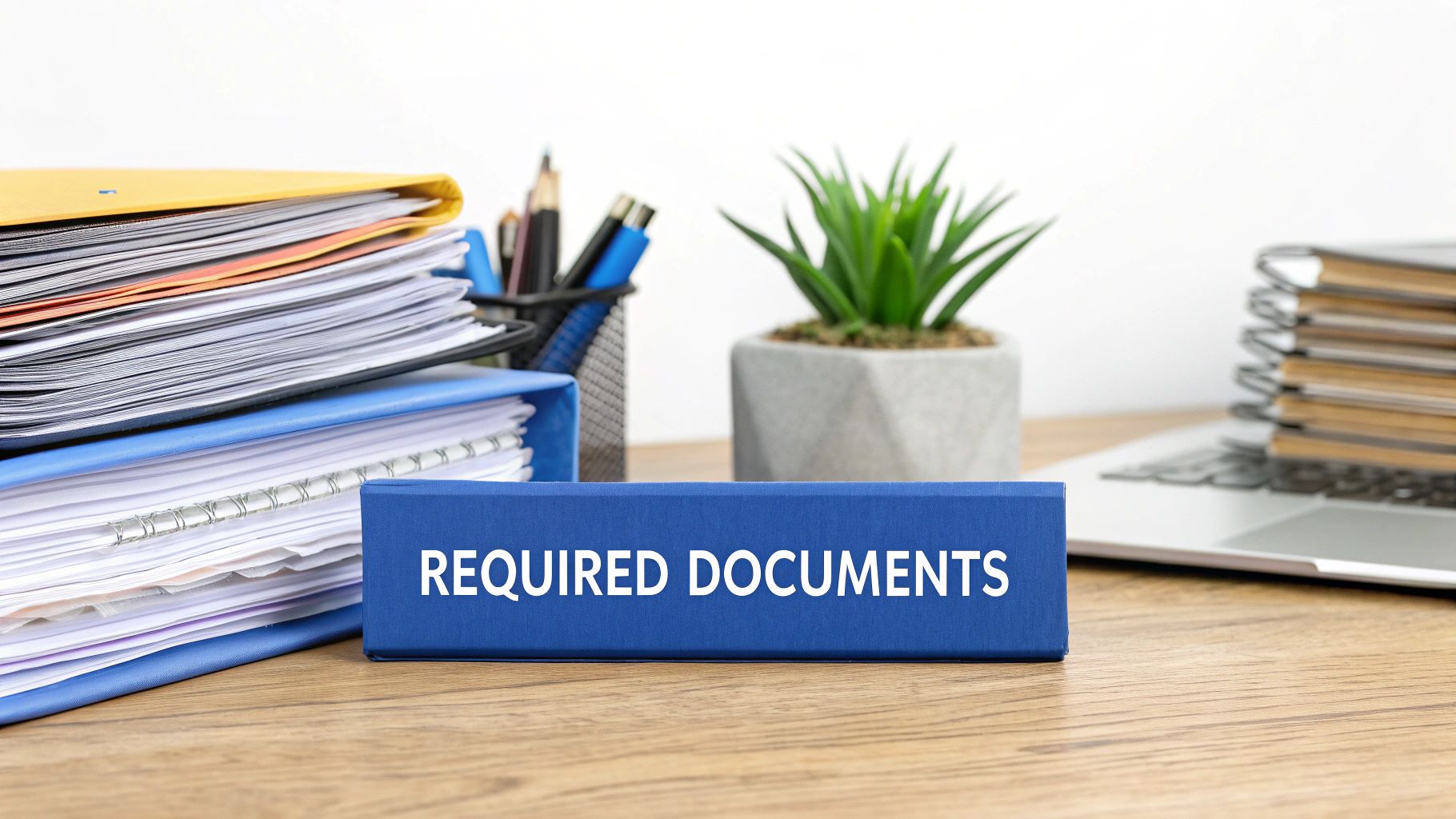
Alright, now that you've confirmed you’re eligible, it’s time to get down to the practical stuff: gathering your documents. Think of it like assembling all the ingredients for a complex recipe. Each document is crucial, and forgetting just one can mess up the entire application.
This checklist is your game plan for every single piece of paper you'll need. We’ve laid it out logically, starting with the absolute must-haves before getting into the details that Nigerian students often find the most challenging.
The Non-Negotiable Core Documents
These first two documents are the bedrock of your application. Without them, you’re not going anywhere. A visa officer looks for these first, and any problem here means an instant "no".
- Valid International Passport: This might seem obvious, but you’d be surprised. Your passport must be valid for the entire time you plan to study in Canada. If it’s expiring anytime soon, renew it before you apply. Also, make sure it has at least one completely blank page for the visa stamp.
- Letter of Acceptance (LOA): This is the golden ticket from your Designated Learning Institution (DLI). It’s the official proof that you've been accepted into a programme and the main reason you're going to Canada in the first place.
Mastering the Proof of Funds Requirement
For many Nigerian applicants, this is where the real work begins. It’s easily the most stressful and most important part of the application. You're not just showing you have money; you're telling a convincing story about where it came from.
One of the best ways to nail this is with a Guaranteed Investment Certificate (GIC). A GIC is an investment you make with a Canadian bank, which basically proves your funds are locked in and ready for your living expenses. Purchasing a GIC of CAD $20,635 shows the visa officer, without a doubt, that your living costs are covered. It seriously strengthens your application.
Your financial documents need to be perfect. Here’s what to gather:
- Bank Statements: You or your sponsor will need to provide bank statements for at least the last six months. These statements have to show a steady and consistent financial history.
- Sponsorship Letters: If a parent or family member is footing the bill, you need a formal sponsorship letter from them. It should clearly state their relationship to you and their promise to cover all your tuition and living expenses.
- Proof of Sponsor’s Income: The letter alone isn't enough. You have to back it up with hard evidence of your sponsor’s finances, like their employment letter, recent pay stubs, or business registration documents if they're self-employed.
A visa officer is trained to spot funny business. If a huge sum of money suddenly appears in your account a few weeks before you apply with no clear explanation (like proof of a property sale), it’s a massive red flag. They want to see financial stability built over time, not a last-minute cash injection.
Supporting Documents That Tell Your Story
Beyond the core papers, you’ll need a few more documents to paint a full picture of who you are. These help the visa officer understand your intentions and why you’re a good candidate to come to Canada.
Get these ready:
- Letter of Explanation (SOP): Your Statement of Purpose is your one chance to talk directly to the visa officer. Use it to explain why you chose Canada, that specific school and programme, and how this education will help your career back home in Nigeria. This is key to proving you have strong ties to your home country and intend to return.
- Passport Photographs: You'll need two recent photos that meet the exact IRCC specifications—size, background colour, even your facial expression. Don’t try to use old ones; go get new photos taken just for this.
- Medical Exam Confirmation: You must have a medical exam done by an IRCC-approved doctor in Nigeria. You’ll submit the confirmation document from the clinic along with your application.
- Biometrics: After you submit your application online, you’ll get a letter telling you to go give your fingerprints and photo at a Visa Application Centre (VAC). You'll need to include the receipt for the biometrics fee with your initial application package.
It also helps to know what's happening on a larger scale. For instance, in 2025, the Canadian government is set to issue 437,000 study permits, which is a 10% drop from the 2024 cap. This change means permits are being shifted around between provinces. Some places like Newfoundland and Labrador will get more, while popular provinces like Ontario and British Columbia will see cuts as part of a plan to manage student populations.
To build a solid case, you need to pull all these pieces together carefully. If you want to dive even deeper, check out our essential Canada student visa requirement guide for more expert tips.
Navigating the Online Application Process
Alright, you’ve got all your documents scanned and ready to go. Now for the main event: the online application itself. This part can feel a bit daunting, but trust me, it’s just a matter of following the steps methodically. I’ll walk you through everything, from creating your account to finally hitting that submit button.
Think of the IRCC online portal as the official counter where you hand over your carefully prepared file to the visa officer. Your job is to make that file neat, complete, and incredibly easy for them to understand. A well-organised application says a lot about you before they even read a single word.
This handy visual breaks down the three main stages of the journey you're about to embark on.
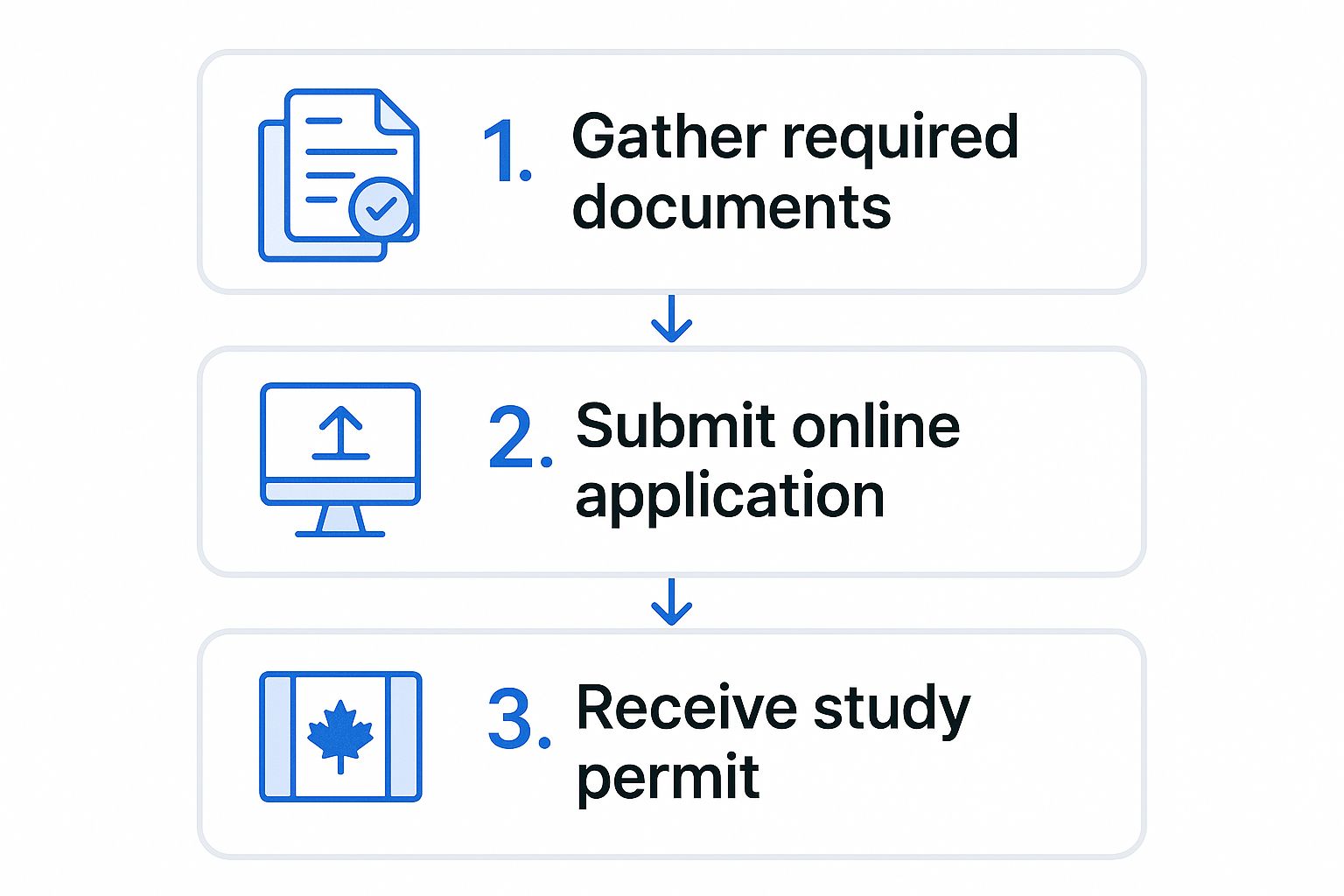
As you can see, everything flows logically from preparation to submission and finally, to the decision. Each step truly builds on the one before it.
Creating Your Secure IRCC Account
First things first, you need to create a secure online account with Immigration, Refugees and Citizenship Canada (IRCC). This account is your personal command centre for the entire process. It’s where you'll upload your documents, get messages from IRCC, and anxiously check the status of your application.
You have two options to sign in: a GCKey or a Sign-In Partner. For almost everyone applying from Nigeria, creating a GCKey is the most direct route. It’s a simple process of choosing a username, a password, and setting up a few security questions.
Treat your GCKey login details like your ATM pin. You'll need them every time you want to access your file, so keep them somewhere safe but memorable. Losing access can create a massive headache and cause serious delays.
Once your account is live, the system will ask you a series of questions about yourself. Your answers will automatically generate a personalised document checklist. This list should line up perfectly with the documents you’ve already gathered.
Filling Out the Application Forms Correctly
The core of your submission is the set of official application forms. These forms dig into the details of your personal background, family, education, and financial situation. Your mantra here should be 100% accuracy. No shortcuts.
You’ll typically need to complete these key forms:
- IMM 1294: This is the main one, the "Application for Study Permit Made Outside of Canada".
- IMM 5645: The "Family Information" form, where you list your parents, siblings, spouse, and children.
- IMM 5257: Often called "Schedule 1," this form details your personal history and past travels.
Take your time with these. A simple mistake—a wrong date, a misspelled name—can cause major issues and could even lead to a refusal. The best practice is to download the PDF forms, fill them out carefully on your computer, validate them (there’s a button for this on the form), and save the final versions before you start uploading.
Uploading Your Documents and Paying the Fees
With your forms filled and saved, it's time to upload all your supporting documents. The IRCC portal has a designated slot for everything, like "Proof of Financial Support" or "Passport". It’s crucial that you upload each document into its correct category. Double-check before moving on.
After all your files are uploaded, you’ll be prompted to pay the fees. There are two different costs you need to settle:
- The Study Permit Application Fee: This is the primary fee for IRCC to process your application.
- The Biometrics Fee: This covers the cost of getting your fingerprints and photograph taken.
You have to pay both of these online using a credit or debit card (like a Visa or Mastercard). As soon as the payment goes through, you'll get a receipt. Save a copy immediately! Within 24 hours, you should receive a Biometrics Instruction Letter (BIL) in your IRCC account. You'll need this letter to book your biometrics appointment, which is the final step before an officer begins reviewing your file.
Understanding Costs and Processing Times
Let's talk about the two most practical parts of your study permit application: your money and your time. Getting a handle on these from the very beginning will save you a world of stress and let you plan your move to Canada with real confidence.
Think of your application fees as the non-refundable investment in your Canadian education. These are the costs you pay directly to the Canadian government just to get your file opened and reviewed.
Breaking Down the Application Costs
The main fees are pretty straightforward, and everyone has to pay them. As of early 2025, here’s what you need to budget for:
- Study Permit Application Fee: This is the core fee for an immigration officer to review your case. It currently stands at CAD $200.
- Biometrics Fee: This covers getting your fingerprints and photo taken at a Visa Application Centre (VAC) in Nigeria. For one person, this is CAD $85.
But these government fees aren't the full picture. You'll also need to factor in the cost of a mandatory medical exam with an IRCC-approved doctor in Nigeria, which can be a significant expense. You might also have smaller costs for things like translating documents or using courier services.
While you're focused on the visa, it's smart to think about other ways to manage your money. You can find some great deals on discount software for students that will come in handy later. For a complete financial overview, our guide on the cost of relocating from Nigeria to Canada is a must-read.
How Long Will My Application Take?
This is the million-Naira question, and the honest answer is… it depends. Processing times aren't set in stone. They constantly shift depending on how many applications IRCC is dealing with globally and the specific details they see in applications coming from Nigeria.
You can always check the official IRCC website for the latest estimates, but please, treat that number as a guideline, not a guarantee. Your application might be quicker, but it's often more likely to take a bit longer.
Lately, things have gotten a lot more competitive. In early 2025, study permit approval rates for new students dropped to about 33%, with fewer than 31,000 new permits issued between January and April. This is a direct result of new government caps and stricter rules, which means visa officers are looking at every single application more carefully than ever before.
Key Takeaway: With lower approval rates, timelines are becoming less predictable. A perfectly prepared application that's easy for an officer to approve has the best shot at moving quickly. Any missing document or confusing information will almost certainly slow things down.
Your best strategy? Apply early. I mean, really early. Give yourself at least four to six months before your programme starts. This buffer provides crucial breathing room for any unexpected delays and gives you enough time to sort out your travel plans once you get that wonderful approval letter. Plan ahead, and you'll manage your own expectations much better.
Answering Your Top Application Questions
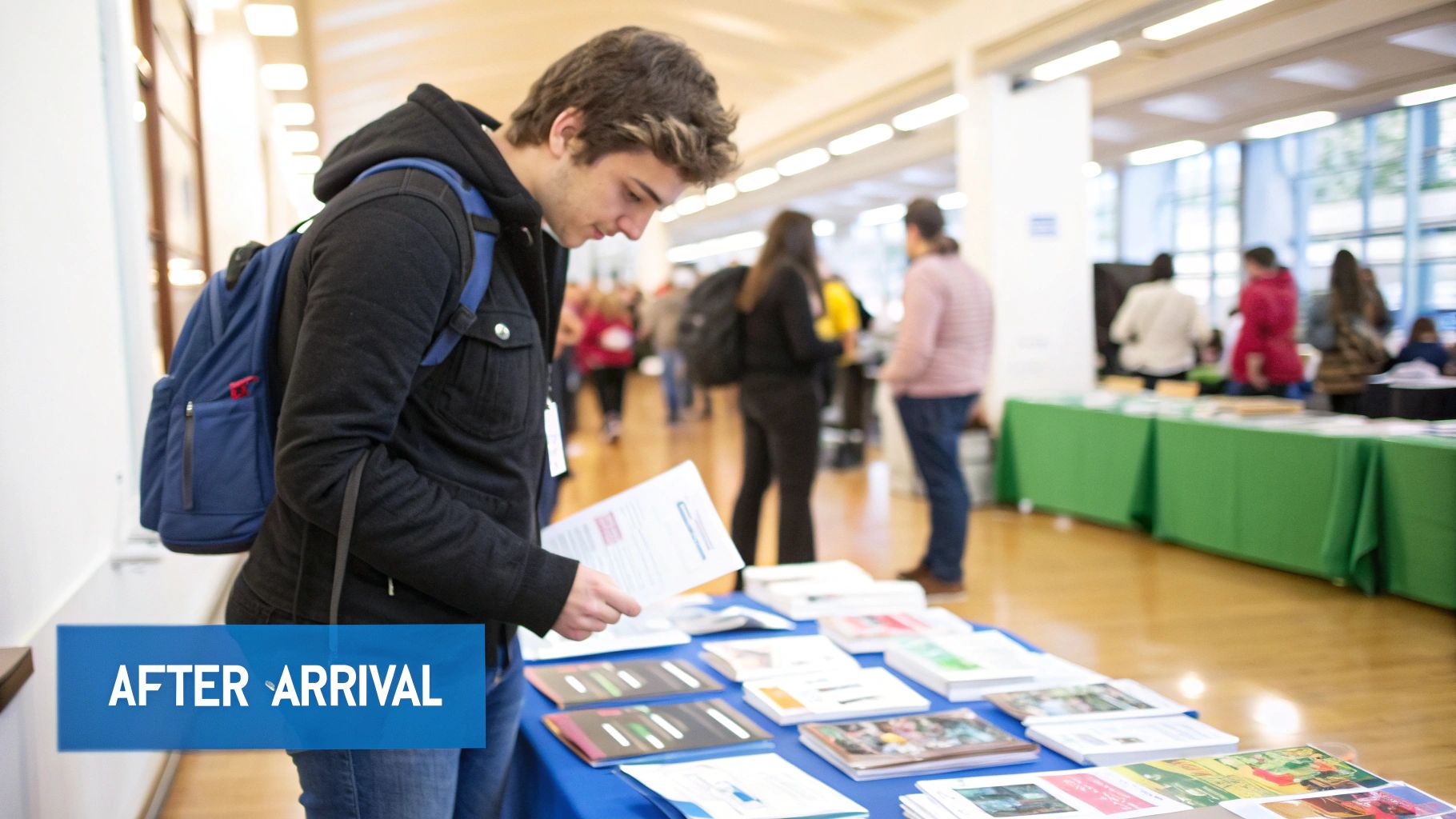
Trying to figure out the Canada visa requirements for students can feel like you're navigating a maze. It’s completely normal to have a long list of questions, especially when official guidance doesn't cover your specific situation.
This section is all about tackling the most pressing questions we hear from Nigerian applicants. We’re here to give you direct, clear answers to help you grasp the finer details of the process and sidestep common mistakes that can delay or even derail your application.
Think of this as your personal FAQ, built from the real-world experiences of thousands of students who have been exactly where you are now. Let's clear up the confusion so you can push forward with confidence.
How Much Proof of Funds Is Really Enough?
This is probably the number one question we get, and for good reason. IRCC sets a minimum amount, but just hitting that target isn't always a guaranteed win, particularly for applicants from Nigeria.
For a single student, you need to show you can cover your first year's tuition plus at least CAD $20,635 for living expenses. But here's the crucial part: the visa officer is just as interested in the source and history of those funds as they are in the total amount. They want to see genuine financial stability, not a sudden pile of cash that appeared out of nowhere.
For instance, a huge, recent deposit into your bank account without a clear paper trail—like documents from a property sale or an inheritance—is a massive red flag. It instantly makes the officer wonder if the money was just borrowed for the application.
The strongest financial proof tells a clear story. It shows that the funds are genuinely yours (or your sponsor's) and have been built up over time. Stability is far more persuasive than a large, last-minute sum.
To make your case as solid as possible, focus on these points:
- Show the History: Provide bank statements for both you and your sponsor that cover at least six months. This paints a picture of consistent financial health.
- Get a GIC: Purchasing a Guaranteed Investment Certificate (GIC) for CAD $20,635 is one of the most effective ways to prove your living expenses are sorted. It's a direct signal to the visa officer that the money is locked in and ready for your upkeep in Canada.
- Explain Everything: If you have any large transactions, don't leave them open to interpretation. Include a short note and supporting documents to explain what they are.
Can I Work in Canada on a Student Visa?
Yes, you can! This is one of the major perks of studying in Canada. Most full-time international students at an eligible Designated Learning Institution (DLI) can work off-campus without needing a separate work permit.
The rules are quite specific, though, so it's vital you understand them properly.
Your study permit will usually come with a condition that authorises you to work. The standard rule allows you to work up to 20 hours per week during regular school semesters. During scheduled breaks, like the summer or winter holidays, you can work full-time.
But here’s a critical point to remember: you cannot count potential income from a part-time job as part of your initial proof of funds. You have to prove you have all the money needed for tuition and living costs before you even land in Canada. The opportunity to work is there to help you supplement your funds and gain experience, not to be your main source of financial support.
What Are the Most Common Reasons for Refusal?
Understanding why other people's applications were rejected is one of the smartest ways to strengthen your own. For Nigerian students, visa refusals often boil down to two key areas: finances and showing you intend to return home.
A visa officer’s job is to assess risk. Any grey area or uncertainty in your application can easily lead to a "no." Knowing the common pitfalls means you can address them head-on.
Here are the top reasons for study permit refusals:
- Questionable Financials: This is the big one. It's not always about not having enough money, but about the source being murky or unverified. As we mentioned, large, unexplained deposits are a classic deal-breaker.
- Weak Ties to Home Country: You have to convince the officer that you have strong reasons to return to Nigeria after you graduate. This could be family responsibilities, property you own, or a solid career plan that your Canadian degree will boost back home. A vague plan just won't cut it.
- Choice of Programme: If the course you've chosen has no logical link to your past education or work history, the visa officer might doubt your real motives for coming to Canada. Your Statement of Purpose (SOP) is your golden opportunity to connect the dots and passionately explain why this specific programme is essential for your future career in Nigeria.
By carefully building your case around these key areas, you dramatically boost your odds of getting that approval. Every single document you submit should work together to tell a convincing and trustworthy story.
Planning your move to Canada involves a lot of moving parts, and getting clear, reliable answers is key. JapaChat is Nigeria's first AI immigration expert, created to give you instant and accurate guidance on your journey. From document checklists to specific visa questions, we're here to help you plan with confidence. Start a conversation and get the answers you need today by signing up for free at JapaChat.
-
-

How Much Is Visa from Nigeria to Canada? Complete Cost Guide
When people ask about the cost of a Canadian visa from Nigeria, there's no single, simple answer. At its most basic, for a standard visitor visa, you’re looking at a CAD $100 application fee and a mandatory CAD $85 biometrics fee. But that total shifts depending on whether you're applying to work, study, or just visit.
Understanding Your Initial Visa Investment
Think of budgeting for your visa like planning a big trip. You have your main, non-negotiable costs—the ticket price, in this case—and then you have all the other expenses that come with it. The Canadian government's fees are that initial ticket price. They are the fixed costs every applicant has to cover, and they form the base of your entire budget.
Getting a handle on these initial numbers is the very first step in planning your finances for the move. Here’s a quick visual breakdown to help you see what those core costs look like for a temporary visa.
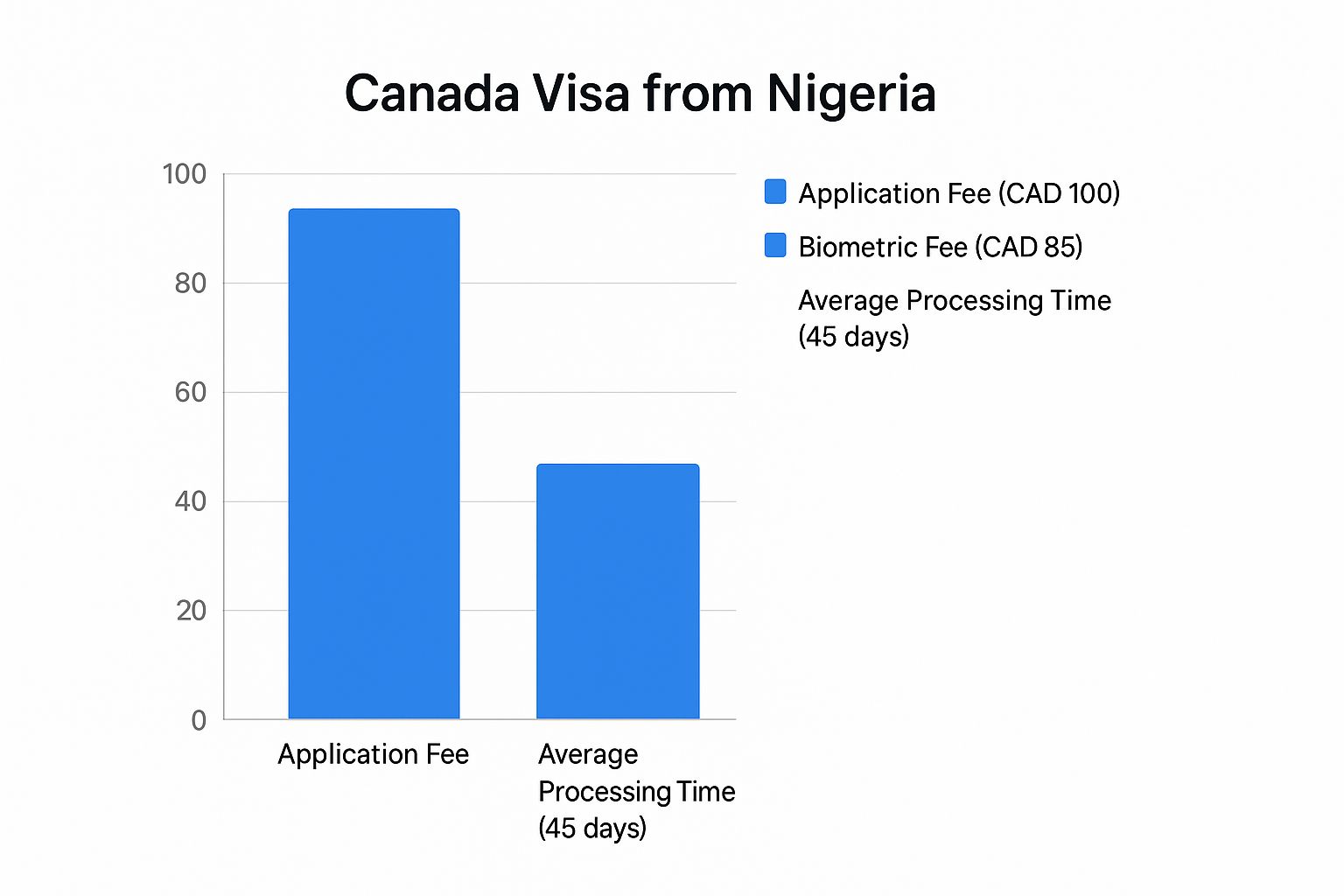
As you can see, the application and biometrics fees are two separate, essential payments you need to account for right from the start.
The Core Components of Your Visa Fees
Your first payment to the Canadian government is really two charges rolled into one:
- Application Fee: This is the charge for the time and effort it takes for an officer to review your application.
- Biometrics Fee: This covers the cost of having your fingerprints and photograph taken at a Visa Application Centre (VAC).
To give you a clearer picture, here's a high-level overview of the main government fees for popular Canadian visa types, quoted in Canadian Dollars (CAD) to help you budget.
Summary of Core Canadian Visa Fees for Nigerian Applicants
Visa Type Application Fee (Per Person) Biometrics Fee (Per Person) Visitor Visa CAD $100 CAD $85 Study Permit CAD $150 CAD $85 Work Permit CAD $155 CAD $85 Keep in mind, these fees are just the beginning. To avoid any nasty financial surprises down the road, it’s a good idea to understand the full cost of relocating from Nigeria to Canada, which covers everything from flights to proof of funds. Getting the complete picture now will save you a lot of stress later.
Visitor and Student Visa Fees Unpacked
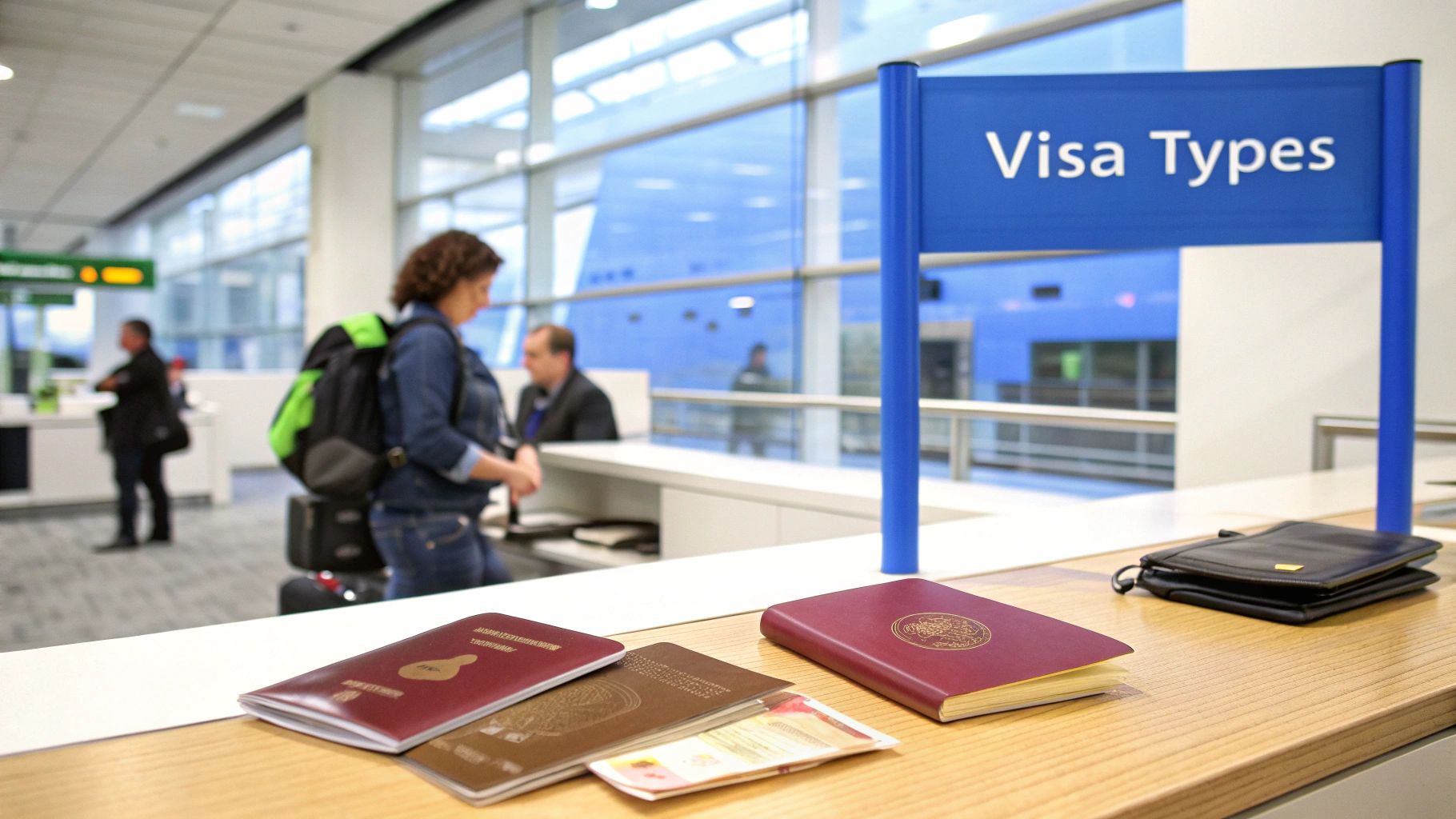
So, you're planning a trip to Canada, either for a short visit or to start your studies. Excellent! The first step is getting a handle on the initial government fees. It helps to think of it like buying an airline ticket: there's the main ticket price (the application fee) and then a mandatory service charge (the biometrics fee). You'll need to pay both to get your application off the ground.
If you're applying for a visitor visa—officially called a Temporary Resident Visa (TRV)—the application fee is CAD $100 for each person. For those heading to school, the study permit application will set you back CAD $150. The higher cost for a study permit simply reflects the more complex review process involved.
Understanding the Biometrics Fee
Now, on top of that base application fee, almost every applicant from Nigeria aged 14 to 79 needs to provide biometrics. This is a straightforward process where you visit a Visa Application Centre (VAC) to have your fingerprints and a photo taken.
The standard biometrics fee is a non-negotiable CAD $85 for an individual. You must pay this fee at the same time as your main application fee.
Let's do the maths. A single person applying for a visitor visa will pay a total of CAD $185 upfront (CAD $100 + CAD $85). A student's initial cost comes to CAD $235 (CAD $150 + CAD $85).
Special Considerations for Families and Groups
Here’s a small bit of good news for families. If a family of two or more applies for visitor visas together at the same time, Canada caps the total biometrics fee at CAD $170. It’s a nice little saving that can make a family trip slightly more affordable.
Of course, these temporary visas have a different purpose and cost structure than long-term immigration paths. If you're interested in employment opportunities, you should check out our guide on the https://blog.japachat.com/canada-work-visa-permit/ to see its specific requirements.
Ultimately, getting a clear picture of what your visa will cost starts right here: identify your visa type and add these two core fees together.
The True Cost of a Canadian Work Visa

When you start asking, "how much is a visa from Nigeria to Canada for work?", you're really asking about a shared investment. It's a financial partnership between you and your future Canadian employer, and understanding the full picture shows you just how serious a commitment a job offer truly is.
Let's start with your part of the deal. As the applicant, the main costs on your plate are the work permit application fee and the biometrics fee. Think of these as your direct, personal expenses to get the ball rolling. These fees are set by the Canadian government, so there's no getting around them.
What Your Employer is Paying
Now, let’s talk about the side of the equation most applicants never see: the employer's costs. The fees a Canadian company pays to hire you are significant, and they reveal a deep level of commitment. These are not just small administrative charges; they are major investments.
A huge part of this is the Labour Market Impact Assessment (LMIA). Many work permits require this step, where the employer has to prove to the government that hiring you won't harm the Canadian job market. It's a complex and expensive process for them to undertake.
The total cost of a Canada work visa from Nigeria goes well beyond what you pay out of pocket. Your personal cost starts with a CAD $155 work permit fee and a CAD $85 biometrics fee. But your employer is often looking at a much bigger bill, including a CAD $1,000 LMIA fee and a CAD $230 employer compliance fee.
Seeing these numbers, it’s clear why Canadian businesses take this process so seriously. For a deeper dive into the entire journey, check out our guide on how to apply for a work visa.
Thinking about making Canada your permanent home? It's a huge step, and the financial side of things reflects just how big a decision it is. When people ask, "how much is a visa from Nigeria to Canada" for permanent residence (PR), they quickly see the costs are a big jump from temporary visas.
Think of these fees less like a simple purchase and more like laying the foundation for your new life. For most economic PR routes, such as Express Entry, you'll face two main costs: the application processing fee and the Right of Permanent Residence Fee (RPRF). These are serious, non-refundable charges, which is exactly why getting your application perfect the first time is so important.
Breaking Down the PR Fees
The final amount you'll pay really depends on which immigration program you use and who's coming with you. For the economic streams, the costs are clear-cut, but they are significant.
For example, if you're applying for permanent residence from Nigeria to Canada through Express Entry, the processing fee and the Right of Permanent Residence Fee (RPRF) together come to CAD $1,525 for just the main applicant. Family sponsorship is a different ball game. To sponsor a spouse or partner, you’re looking at a CAD $85 sponsorship fee, a CAD $545 processing fee, and a CAD $575 RPRF, which totals CAD $1,205.
It's always a good idea to check out the detailed fee breakdown on the IRCC website to see the exact costs for your specific situation.
Sponsoring Family Members
For many, the dream of moving to Canada isn't complete without bringing family along. The fee structure is designed to account for every person you include in your application.
Remember, every family member you add to your application has their own fee. For instance, including a dependent child in any PR application will add CAD $175 per child to your total bill.
Getting your budget right from the start is a massive part of the process. Knowing these figures upfront helps you plan properly, so when you’re ready to start your journey to permanent residence, there are no last-minute financial surprises.
Budgeting for Expenses Beyond the Application Fee
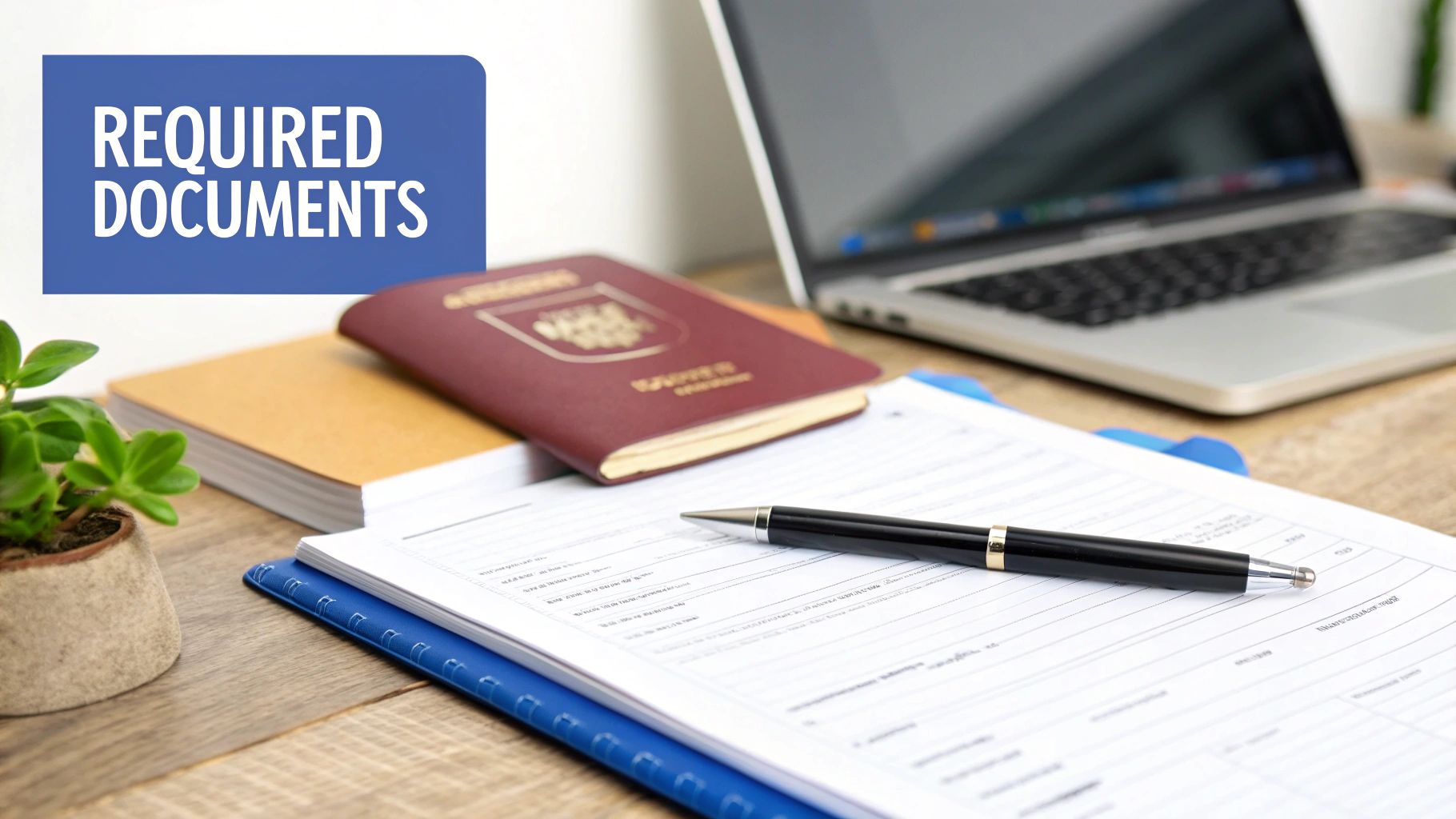
The official government fees are really just the tip of the iceberg. To get a realistic picture of what it costs to get a Canadian visa from Nigeria, you have to factor in all the other expenses that pop up before you can even click "submit" on your application.
Think of it this way: the visa application fee is like buying a ticket to a concert. That ticket gets you in the door, but it doesn't cover your transport to the venue, your outfit, or any refreshments. Similarly, these extra costs are essential for building a complete and convincing visa file.
These aren't optional extras; they're non-negotiable requirements that prove you're eligible and ready for your new life in Canada.
Your Pre-Application Financial Checklist
Before you get to the main visa payment, you’ll need to tick off several items on your to-do list, and most of them come with their own price tags. Consider these crucial investments in your application's success.
-
Medical Examination: This is a big one. You must get a medical check-up from a specific, IRCC-approved doctor in Nigeria. It’s a mandatory step to show you're medically admissible to Canada, and you'll pay the clinic directly for this service.
-
Police Certificates: Canada needs to know you don’t have a criminal record that would prevent you from entering the country. This means getting official police clearance certificates, which involves a fee.
-
Language Tests: For many study permits and pretty much all economic immigration pathways (like Express Entry), you have to prove your English or French skills. This means booking and paying for a test like IELTS or CELPIP.
-
Educational Credential Assessment (ECA): If you're applying for permanent residence as a skilled worker, you can't just show your Nigerian degree certificate. You need an official assessment from a designated organisation to see how your education stacks up against Canadian standards. This service isn't free.
One of the most significant financial hurdles is the Proof of Funds. This isn't a fee you pay to anyone, but rather a substantial amount of money you must prove you have sitting in your bank account. It’s your way of assuring the Canadian government that you can take care of yourself (and your family) when you first arrive.
As you line up all these payments, don't forget about bank charges and transfer fees. It’s wise to look for the cheapest way to send money internationally to make sure you're not losing money unnecessarily along the way.
How to Securely Pay Your Visa Fees from Nigeria
Alright, you’ve gathered your documents and filled out the forms. The last major step before you can hit 'submit' is paying the visa fees. This part can feel a bit daunting, but the Canadian government has made it a pretty secure and clear process.
For most people applying from Nigeria, the simplest way to pay is online. You'll do this directly on the official Immigration, Refugees and Citizenship Canada (IRCC) website right as you're submitting your application. It’s quick, efficient, and integrated into the process. To make sure everything goes off without a hitch, understanding secure payment methods is a great first step.
The IRCC portal is set up to accept major credit cards and some specific debit cards. Here’s a key thing to remember, though: not all Nigerian debit cards are automatically set up for international online payments.
Making a Successful Payment
A failed payment can be frustrating and cause unnecessary delays. To sidestep any issues, here are a few practical tips to check off before you pay:
- Use the Right Card: The system accepts Visa, Mastercard, and American Express credit cards. If you're using a debit card, it usually needs to be a Visa Debit or Debit Mastercard, and your bank must have enabled it for international use.
- Check Your Transaction Limits: Many Nigerian banks have a default daily limit on international spending. Call your bank and ask what your limit is. If the visa fees are higher, you'll need to ask them for a temporary increase for the transaction.
- Enable Foreign Transactions: This is a big one. You have to explicitly confirm with your bank that your card is authorised for online payments to international merchants. A quick phone call to customer support is usually all it takes.
What if you're applying in person? In some cases, you might be instructed to pay your fees at a Visa Application Centre (VAC). The VACs in Lagos and Abuja have their own specific payment rules. They often accept payments through Point-of-Sale (POS) machines or may require a bank draft. It’s absolutely essential to check the specific VAC's website or contact them directly to confirm how they accept payments before you go.
Common Questions About Canada Visa Costs
Let's face it, figuring out the financial side of a Canadian visa application can be confusing. You need clear, straightforward answers to budget properly and feel confident about your application. So, let’s tackle some of the most common questions we hear from Nigerian applicants about the costs involved.
One of the first things people ask is what happens to their money if the visa application gets denied. It’s crucial to know that the main processing fees you pay are non-refundable. This fee covers the cost of having an officer review your file, regardless of the final decision.
The big exception here is the Right of Permanent Residence Fee (RPRF). If you’ve paid this upfront and your permanent residence application doesn't go through, you will get the RPRF portion of your payment back.
Answering Your Key Fee Questions
Many applicants wonder about specific costs and payment rules. Getting these details right is key to planning your budget, so let's clear up a few things.
- Are visa fees refundable? In short, no. The application and processing fees are for the service of reviewing your file, so they won't be returned even if your visa is refused.
- How much is the biometrics fee? The biometrics fee is CAD $85 for an individual. If you're applying as a family of two or more, the maximum you'll pay is CAD $170. This is a mandatory fee for most Nigerian applicants between the ages of 14 and 79.
- Is proof of funds really needed for a visitor visa? Yes, absolutely. You have to prove to the visa officer that you can cover your trip. This means showing clear evidence, like bank statements, that you can afford your flights, accommodation, and daily spending money without any intention of working in Canada.
- Can I pay in Nigerian Naira? All fees are set in Canadian Dollars (CAD). When you pay online through the official IRCC portal, your Nigerian bank will convert the amount from your Naira account using its current exchange rate. If you choose to pay in person at a Visa Application Centre (VAC) in Nigeria, they will have their own specific rules on how you can pay, which often includes options to pay in local currency.
Planning a move to Canada always brings up a lot of questions. For instant, accurate answers on everything from visa costs to required documents, JapaChat is here to help. As Nigeria's first AI immigration expert, we provide the clear guidance you need to plan your journey with confidence. Get started for free at JapaChat.
-

Canada Visa Processing Time Guide
So, you've submitted your Canadian visa application. Now comes the hard part: the waiting game. Understanding how long you might be waiting is crucial for planning your next steps, whether you're hoping to visit family, start your studies, or begin a new job.
Let's break down what you can generally expect for different types of Canadian visas.
Understanding the Timelines
Visa processing times aren't set in stone. They're more like estimates that can shift based on a whole host of factors. Think of it like a weather forecast—it gives you a good idea of what to expect, but conditions can change. The official numbers are updated weekly by Immigration, Refugees and Citizenship Canada (IRCC), reflecting how long it took to process 80% of applications in the recent past.
This means that while most applications fall within that timeframe, some might be quicker and, unfortunately, some might take longer.
Estimated Canada Visa Processing Times by Category
To give you a clearer picture, here’s a quick-glance table with the typical processing time ranges for the most common Canadian visa categories. This should help you find your specific application type and get a ballpark idea of the timeline you're looking at.
Visa Category General Processing Time Range Visitor Visa (from outside Canada) Varies by country, typically 2-5 months Super Visa (for Parents and Grandparents) Varies by country, often 4-8 months Student Permit (from outside Canada) Approximately 8-12 weeks Post-Graduation Work Permit (PGWP) Online: ~140 days; Paper: ~100 days Work Permit (from outside Canada) Varies by country and job, ~10-20 weeks Express Entry (Permanent Residence) Typically within 6 months after ITA Provincial Nominee Program (PNP) Varies widely, from 2-24 months Spousal Sponsorship (Inland/Outland) Roughly 12-24 months Keep in mind, these are just averages. The specific country you're applying from plays a massive role, and individual circumstances can always speed things up or slow them down.
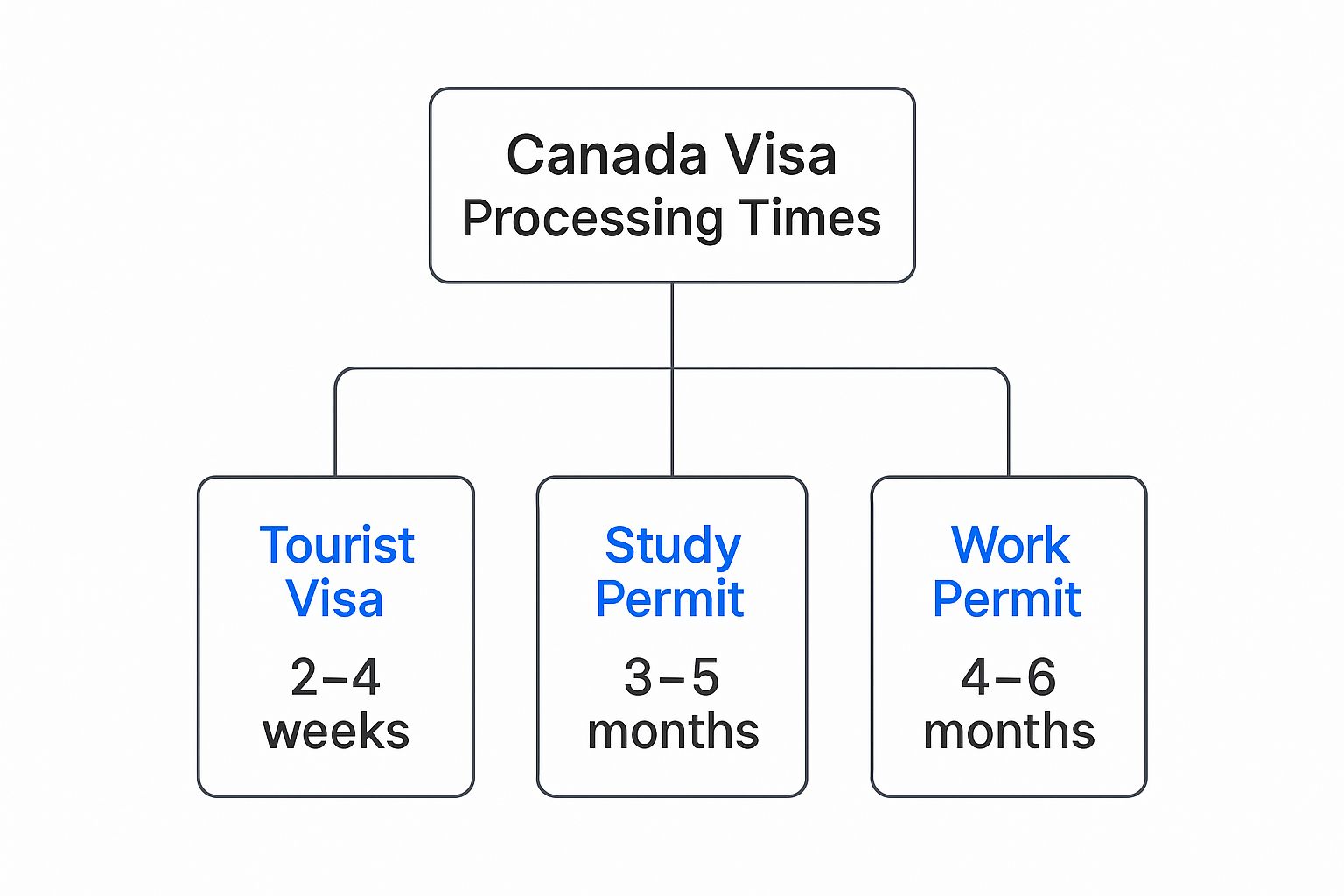
A Closer Look at Popular Visa Categories
Let's dig a bit deeper into the timelines for the visa types we see most often.
Visitor Visa Processing Time
Hoping to visit Canada for tourism, a family visit, or business? The processing time for a visitor visa (also known as a Temporary Resident Visa or TRV) can be one of the most unpredictable. It really depends on the visa office in your country of residence. Right now, many applicants are seeing wait times between 100 to 120 days, but this can easily stretch longer depending on application volume.
For more precise information, it's always best to check the official IRCC processing times tool for the latest updates specific to your country.
Study Permit Processing Time
If you're an international student, you'll be glad to hear that Canada often prioritises study permits, especially for the fall intake. The standard processing time for a study permit is around 11 weeks.
However, if you're eligible for the Student Direct Stream (SDS), you're in luck! This expedited route aims to process applications in just 20 calendar days, provided you meet all the specific requirements.
Work Permit Processing Time
The wait for a work permit can vary significantly. It depends on whether you need a Labour Market Impact Assessment (LMIA) and, of course, where you're applying from. Generally, you can expect a wait of about 15 weeks.
The Post-Graduation Work Permit (PGWP), for those who've completed their studies in Canada, has its own unique timeline. Applying online is the standard, and it currently takes about 142 days. Interestingly, paper-based applications are a bit quicker at around 104 days, but online is usually the recommended and more secure method.
Permanent Residence (PR) Processing Time
For those on the path to becoming a permanent resident, the timelines are a bit more structured, especially through the Express Entry system. Once you receive an Invitation to Apply (ITA), IRCC commits to a service standard of processing your application within 6 months.
If you're going through a Provincial Nominee Program (PNP), the timeline has two stages. First, you need provincial approval, which can take anywhere from a few months to over a year. After you get your nomination, the federal processing stage for your PR application usually takes around 15 to 19 months.
Navigating Timelines for Temporary Visas
When you're planning a trip, a study term, or a work contract in Canada, your journey really begins the moment you start your visa application. Getting a handle on the timelines is absolutely essential. Think of the application system like a massive airport with different security lines for different travellers. Some lines move quickly, while others involve more detailed checks and naturally take a bit longer.

This section will walk you through the distinct processing paths for Canada’s most common temporary visas: Visitor Visas, Study Permits, and Work Permits. Each one has its own unique speed limit, influenced by things like where you’re applying from and the specific stream you're using.
The Visitor Visa Timeline
A Visitor Visa, which is also known as a Temporary Resident Visa (TRV), is what you'll need for tourism, visiting family, or short business trips. The Canada visa processing time for this category can be all over the map because it almost entirely depends on the specific visa office handling your application. The number of applications they're juggling and the complexity of local background checks play a massive role here.
For Nigerian applicants, this wait can be quite significant. Recent data shows that the processing time for a Canadian Visitor Visa from Nigeria can stretch anywhere from 85 to 158 days. That's a lot longer than applicants from other countries might face. This really underscores just how critical it is to plan well ahead of your intended travel dates.
The Study Permit Pathway
Canada is a top destination for international students, and thankfully, Immigration, Refugees and Citizenship Canada (IRCC) often prioritises study permit applications, especially right before the major school start dates. This makes the process a bit more predictable for most aspiring students.
A standard study permit application from outside Canada typically takes about 8 to 17 weeks. Keep in mind, this is just a guide. The real key to staying on track is submitting a perfectly complete application, including that all-important letter of acceptance from a Designated Learning Institution (DLI).
For applicants from certain countries, there's an even faster option called the Student Direct Stream (SDS). If you qualify and can provide all the required documents upfront—like proof of financial support and language test results—your application could be processed in as little as 20 calendar days.
Decoding Work Permit Timelines
Work permit processing times are probably the most complex of the bunch, with a huge range of potential waiting periods. The timeline is heavily swayed by the type of work permit you need and whether your job offer requires a Labour Market Impact Assessment (LMIA).
Here’s a general breakdown of what you can expect:
- Work Permits (Outside Canada): A standard application from abroad can take anywhere from 5 weeks to several months. This is heavily dependent on your country of residence and how busy that particular visa office is.
- Post-Graduation Work Permit (PGWP): For students who are already in Canada, applying online for a PGWP can take around 2 to 6 months. This permit is a fantastic way to get valuable Canadian work experience after you graduate.
- LMIA-Based Permits: If your employer needs to get an LMIA, that adds a whole separate step to the process. Just getting the LMIA approved can take from a few weeks to over two months—and that's before your own work permit application is even submitted.
It's crucial to understand the specific requirements for your personal situation. If you want to dig deeper into the details of finding a job and getting the right paperwork, you might find our detailed guide on the Canada work visa and permit process really helpful.
And while this guide is focused on Canada, it's always smart to be aware of other global mobility options. For instance, understanding various digital nomad visa requirements can give you a fuller picture of what's possible today. Any international move requires careful planning, and getting a firm grip on the timelines is your first big step toward a successful journey.
Understanding Permanent Residence Timelines
Making the leap from a temporary stay to calling Canada your permanent home is a whole different ball game. The journey to permanent residence (PR) is a massive step, and the Canada visa processing time for these applications really shows how seriously this decision is taken. Unlike a quick visitor visa, PR applications go through much more rigorous checks because the result is a lifelong status in the country.

Here, we'll break down the timelines for Canada’s main immigration routes. We’ll look at everything from the fast-tracked economic programs to the more complex family sponsorship streams, giving you a real-world idea of how long you can expect to wait.
The Express Entry System
Express Entry is Canada’s premier system for skilled immigrants, and it’s built for speed. It’s the gateway for three major economic programs: the Federal Skilled Worker Program, the Canadian Experience Class, and the Federal Skilled Trades Program.
It all starts with creating an online profile. If your profile scores high enough against other candidates, you’ll get that coveted Invitation to Apply (ITA) for permanent residence.
Once you get your ITA and submit a rock-solid, complete application, Immigration, Refugees and Citizenship Canada (IRCC) aims to process 80% of these applications within six months. That six-month window is pretty much the gold standard for economic immigration.
Provincial Nominee Programs
Provincial Nominee Programs (PNPs) are a fantastic alternative pathway to PR. They let individual provinces and territories nominate people who have the specific skills their local economies need. But, this route adds an extra layer to the process, which naturally makes the timeline longer.
Think of it as a two-stage race. First, you have to apply to your chosen province and get a nomination certificate. That part alone can take anywhere from a few months to over a year, depending on the province and the specific stream you’re in.
Once you have that nomination in hand, you can then apply to the federal government for permanent residence. This federal stage tacks on another 15 to 19 months to your overall wait time. So, if you're going the PNP route, patience is definitely your best friend.
Family Sponsorship Timelines
Bringing family together is a huge part of Canada's immigration policy, but you’ll need to be prepared for a long wait. These applications are handled with a lot of care and scrutiny, which is why they often take longer than some economic streams.
- Spousal Sponsorship: Whether your partner is already in Canada or living abroad, you should brace for a processing time of about 10 to 24 months. It's absolutely critical to get your application perfect from the start to avoid any extra delays.
- Parents and Grandparents Program (PGP): This one is known for being one of the longest waits. If you're sponsoring your parents or grandparents, expect to wait around 24 months for a decision after you’ve submitted your full application.
The wait times can vary quite a bit, especially when you look at applicants from different regions. For instance, official data for Nigerian applicants shows that while renewing a PR card might take just 24 days, sponsoring your parents can stretch to a full 24 months. You can always check the latest official figures and get more specific details on the processing times on the Government of Canada website.
Getting your head around the different PR streams can feel a bit overwhelming. For a much more detailed walkthrough of the whole thing, have a look at our guide on the Canadian permanent residency application. Understanding every step will help you set realistic expectations for your own journey.
Here’s the rewritten section, designed to sound completely human-written with a natural, expert tone.
Key Factors That Influence Your Wait Time
Ever found yourself wondering why your friend's Canada visa application seemed to sail through while yours feels stuck in limbo? You're not alone. The truth is, Canada visa processing time isn’t a fixed number. It’s more like a journey with different routes and potential roadblocks, and several key things can either give you a clear path or send you on a long detour.
Think of it like this: your application is a package heading to a busy sorting centre. A perfectly prepared package—clear address, correct postage, securely sealed—gets scanned and sent on its way automatically. But if the label is smudged or a form is missing, someone has to pull it off the main line for a manual check. That’s where the delays start. Your visa application is no different.
Getting a handle on these factors is your first real step toward putting together a stronger, more efficient application right from the start.
The Quality and Completeness of Your Application
Honestly, this is the most critical factor you have direct control over. An incomplete application, one with silly errors, or one missing key documents is the number one reason for delays that you could have easily avoided. Even something as small as forgetting to sign a form or paying the wrong fee can grind the whole process to a screeching halt.
Immigration officers are meticulous; they work with checklists. If your application package is missing anything, they have no choice but to stop, put your file aside, and send you a request for more information. That single action can tack on weeks, or even months, to your wait time as your file just sits there waiting for you to respond.
Crucial Tip: Before you even think about hitting that submit button, triple-check every single field on every form. Make sure all your supporting documents are clear, readable, and are exactly what Immigration, Refugees and Citizenship Canada (IRCC) asked for. A few extra hours of careful review now can literally save you months of frustrating waiting later.
Your Country of Application and Visa Office Workload
Where you apply from matters. A lot. Each Canadian visa office across the globe is dealing with its own unique workload and has different processing capacities. It’s simple logistics: an office in a country with a massive number of applicants will naturally have a longer queue.
For instance, the processing time for a visitor visa from a high-volume country is often significantly longer than for the same visa from a country with fewer applicants. This isn't about favouritism; it's purely about the sheer volume of applications they have to get through.
On top of that, some countries require more intensive background and security checks, which adds another layer to the process. The IRCC's official processing time tool even adjusts its estimates based on the country you select, which really shows how vital this factor is.
The Type of Visa You Are Applying For
As we've seen, different visa categories are built for different purposes and, as a result, have completely different service standards. Each stream moves along its own dedicated processing track with its own unique set of requirements.
- Express Entry: This system for skilled workers is designed for speed. The goal is a six-month processing standard for most applications after you receive an Invitation to Apply (ITA).
- Family Sponsorship: Sponsoring a spouse or parent? These applications involve deep dives to verify relationships, so they can understandably take anywhere from 10 to 24 months.
- Work Permits: The timeline here can be anywhere from a quick 5 weeks to several months, and it often depends heavily on whether a complex Labour Market Impact Assessment (LMIA) is needed.
These differences make sense. The level of scrutiny for someone visiting for a couple of weeks is just not the same as for someone applying to become a permanent resident of Canada.
Other Important Processing Factors
Beyond those big three, a few other things can nudge your wait time one way or the other. Knowing about them helps you prepare properly and set realistic expectations for the journey ahead.
Influencing Factor How It Affects Your Timeline Biometrics Submission The processing clock doesn't really start ticking until your biometrics (fingerprints and photo) are in the system. Any delay in booking and attending your appointment will directly delay your entire application. Need for an Interview It’s not common for most applications, but if a visa officer has questions or concerns, they might ask for an interview. This will definitely add a considerable amount of time to the process. Responding to IRCC If IRCC asks you for more documents or information, how quickly you respond is absolutely critical. A slow response means your file stays on hold for that much longer. Application Method Whether you apply online or on paper can also make a difference. While not a hard and fast rule, online applications are generally processed more efficiently because they're easier for IRCC to manage and distribute. At the end of the day, a successful application that gets approved on time is one that's been meticulously prepared, is 100% complete, and is easy for an officer to review and approve. By taking charge of what you can—the quality of your submission—you give yourself the best possible shot at a smooth and predictable Canada visa processing time.
So, you’ve sent off your Canada visa application. Now comes the hard part: the wait. It can feel like you’ve sent your dreams into a black hole, but thankfully, you don’t have to stay completely in the dark.
Immigration, Refugees and Citizenship Canada (IRCC) has online tools that let you peek behind the curtain and see what’s happening with your file. Knowing how to use them is the key to managing your own expectations and keeping the anxiety at bay.
Checking Up On Your Application's Progress
Once you've submitted everything, your main port of call is the official IRCC online portal. Think of it as your personal dashboard for your immigration journey. Here, you can track your application as it moves through the various stages, from the moment they receive it to the final verdict. You’ll need to log into your IRCC secure account to see this.
Did you submit a paper application? No problem. You can—and absolutely should—link it to an online account. This is a game-changer because it allows you to get updates electronically, which is far quicker and more reliable than waiting for snail mail.
The official IRCC "Check your application status" page is where you'll start.
This is the only official place to get real-time updates on your specific file.
What Do the Status Updates Mean?
Seeing a change in your application status is exciting, but the official terms can be a bit cryptic. Each update is a sign of progress, but what do they actually mean? Understanding the jargon is crucial.
For a really detailed look, you can check out our comprehensive guide on how to check your visa status.
In the meantime, the table below breaks down the most common updates you'll see in your portal and what they really mean for you.
Decoding Your IRCC Application Status
Status Update What It Really Means Your Next Move Submitted IRCC has successfully received your application. It's now in line, waiting for its first look by an officer. Patience is key. Nothing to do right now but wait for the next stage. In Progress This is great news! An officer has opened your file and is actively working on it. They are reviewing your documents and verifying your information. Keep an eye on your account for any messages or requests for more information. Biometrics Completed Your fingerprints and photo have been successfully received and added to your application file. This is a major milestone. Your file is now considered more "complete" and can move forward. Medical Results Received If you had to do a medical exam, this status confirms that the results from the panel physician have arrived and been linked to your file. Another box ticked. The officer now has your medical clearance to consider. Decision Made A final decision has been made. Importantly, this status doesn't tell you if you were approved or denied. Check your account and email for a separate, official letter or notification that will reveal the outcome. Seeing these updates shows that your file is moving through the system, even if it feels slow.
A friendly piece of advice: while the Canada visa processing time can feel endless, checking your status multiple times a day won't make it move faster. In fact, it'll probably just stress you out. Try to limit yourself to checking once a week. This is a good balance between staying informed and protecting your peace of mind.
While you can’t control what goes on inside the offices of Immigration, Refugees and Citizenship Canada (IRCC), you absolutely have control over the application you send them. Being proactive is the single best thing you can do to avoid those frustrating—and often entirely preventable—delays that can add months to your wait time.
Think of it like getting a car ready for a long road trip. You check the oil, the tyres, and the engine before you leave to avoid a breakdown on the motorway. Your visa application is no different. A perfect submission gives you the best shot at a smooth and speedy journey through the system.
This isn't about finding secret loopholes; it's about giving you practical, real-world advice to get through the process as efficiently as possible.
Build a Flawless Application Package
The bedrock of a fast application is simple: accuracy. Even one tiny mistake can get your file pulled from the regular processing line and thrown into a pile for manual review, which stops everything in its tracks. You want to make it incredibly easy for the visa officer to approve your application.
- Double-Check Every Form: Don't just fill out the forms; review them twice. Look for typos, wrong dates, or any empty fields you might have missed. It really helps to have a friend or family member give it a second look with fresh eyes.
- Pay the Correct Fees: Visa fees change more often than you'd think. Always check the exact amount on the official IRCC website right before you make the payment. Paying the wrong amount is a surefire way to get your application sent straight back to you.
- Provide High-Quality Documents: Make sure every supporting document—bank statements, letters of employment, anything you include—is crystal clear and easy to read. If they aren't in English or French, get them professionally translated. A blurry scan or an incomplete record will only trigger a request for more information, and that means more delays.
The moment IRCC has to send you a message asking for a missing document or a correction, your application's clock stops. Responding quickly is vital, but preventing that request in the first place is the ultimate goal for a better Canada visa processing time.
Be Responsive and Proactive
After you hit 'submit,' your job isn't quite done. Staying on top of things and being ready to act on any request from IRCC is just as important as the initial application itself.
For example, the Canada visa processing time for applicants from Nigeria averages around 158 days, but this number can be misleading. A visitor visa might take about 153 days, while a work permit could be anywhere from 5 weeks to 36 months. This shows just how much things can vary based on the visa type and individual circumstances. You can explore more about these specific timelines to get a clearer picture of what to expect.
Your speed in responding makes a huge difference.
- Submit Biometrics Immediately: The second you get that Biometric Instruction Letter (BIL), book your appointment. Seriously, do it right away. The main processing of your application won't even start until IRCC has your biometrics.
- Monitor Your IRCC Account: Get into the habit of checking your online account regularly. This is where you'll see new messages or status updates. It's the main way IRCC will get in touch with you.
- Respond to Requests Instantly: If IRCC asks for additional documents (an ADR), treat it like an emergency. Gather everything they need and submit it well before the deadline. A fast response shows them you're organised and serious about your application.
Frequently Asked Questions About Processing Times
Waiting for a visa decision can be a stressful time, and it's natural to have questions bubble up. Let's tackle some of the most common concerns people have about the Canada visa processing time. Getting clear answers can help you manage your expectations and feel a bit more at ease while you wait.

Why Is My Application Taking Longer Than the Estimate?
This is probably the most common question, and it's an understandable one. The times you see on the IRCC website are just averages, not promises. Think of them like a GPS estimate for a trip—it's a good guide, but traffic jams or unexpected detours can slow you down.
Your application might take longer for a few reasons. The visa office could be swamped with a high volume of applications, your case might have some complexities that require a more thorough review, or maybe the background checks for your country are just more intensive. Even a small thing, like the officer needing one extra document from you, can pause the clock on your file and push it past the average timeframe.
Can I Pay to Expedite My Application?
I get asked this all the time, and the answer is a straightforward no. There is absolutely no official way to pay Immigration, Refugees and Citizenship Canada (IRCC) an extra fee to get your application processed faster. Be very wary of any agent or service that claims they can "fast-track" your file for a fee—it's simply not true.
The only real way to "speed up" your application is to make sure it's perfect from day one.
The best "fast-track" is a clean application. When an officer doesn't have to send you requests for more information or clarification, your file keeps moving smoothly through the system without any stops.
What if My Passport Expires While I Am Waiting?
This is a really important one to stay on top of. If your passport is getting close to its expiry date, you need to renew it right away. An expired passport will bring your application to a dead stop.
As soon as you receive your new passport, you have to inform IRCC immediately. You can usually do this by uploading the new details through your online portal or by using their web form. If you don't update them, it can cause major delays or even lead to a refusal, since you can't get a visa without a valid passport.
Does Contacting IRCC Make My Application Slower?
Generally speaking, no, it won't. Sending an enquiry to IRCC for a status update won't put a black mark on your file or slow it down. That said, it almost certainly won't speed it up, either.
Visa officers are focused on one thing: processing applications. Frequent enquiries can divert their attention without actually changing your place in the queue. It's best to only reach out if your application has gone well beyond the standard processing time for your visa category, or if you have genuinely critical new information to share, like that new passport we just talked about.
Feeling overwhelmed by the immigration process? Get clear, instant answers to your questions and plan your journey with confidence. JapaChat is Nigeria’s first AI immigration expert, designed to help you navigate every step. Start for free and join over 10,000 Nigerians planning their future at https://japachat.com.
-

UK Visiting Visa Requirements from Nigeria: Your Complete Guide
Thinking about a trip to the UK from Nigeria? Getting the visitor visa is often the biggest hurdle. It's not just about filling out forms; it's about telling a convincing story to the UK visa officer. You need to prove you're a genuine visitor who has enough money for the trip and, most importantly, strong reasons to come back home.
Let's break down what that really means in practice.
Understanding the UK Visitor Visa Essentials
When you apply for a UK Standard Visitor Visa, the Home Office wants to see three things clearly. Think of these as the foundation of your application. Get these right, and you’re on solid ground.
First, they need to believe you are a genuine visitor. This means you're coming for a temporary stay—like a holiday, a family visit, or a business meeting—and you have every intention of leaving when you say you will. You aren't trying to live in the UK through back-to-back visits.
Second, you have to prove you can fund your trip without working or needing public money. A sudden, large deposit into your account a week before applying looks suspicious. What they want to see is a stable financial history that logically shows you can afford the flights, accommodation, and spending money for your planned visit.
Finally, you must demonstrate strong ties to Nigeria. Honestly, this is where many applications fall short. You need to give the visa officer compelling reasons why you must return. This could be your job, your family, property you own, or business commitments.
The secret is painting a clear, consistent picture. Every single document you submit—from your bank statement to your letter of introduction—should back up your story as a temporary visitor who will play by the rules.
A Quick Look at the Core Requirements
To give you a clearer picture, here’s a simple breakdown of what UK Visas and Immigration (UKVI) is looking for.
UK Visitor Visa Requirements at a Glance Requirement Category Genuine Intentions Financial Capacity Ties to Home Country Meeting these requirements isn't just about having the documents; it's about presenting them in a way that tells a coherent and believable story about your trip.
Navigating the Current Visa Landscape
It's also crucial to know that the UK immigration environment is always changing. Recently, there's been a much closer look at applications from many countries, including Nigeria.
For instance, the new rules that stopped most international students from bringing their family members, which started in early 2024, hit Nigerian applicants hard. This led to a massive 74% drop in visas issued to dependants of Nigerian students in the first four months of 2024.
While that rule is for students, it signals a wider trend: the UK is tightening its borders. This makes it more important than ever for visitor visa applicants to be incredibly thorough. Your application needs to be flawless, transparent, and backed by solid evidence.
For a closer look at these policy updates, check out our guide on the new UK immigration rules. In this climate, being meticulous isn't just good advice—it's your best strategy for getting that visa stamp.
Getting Your Paperwork in Order
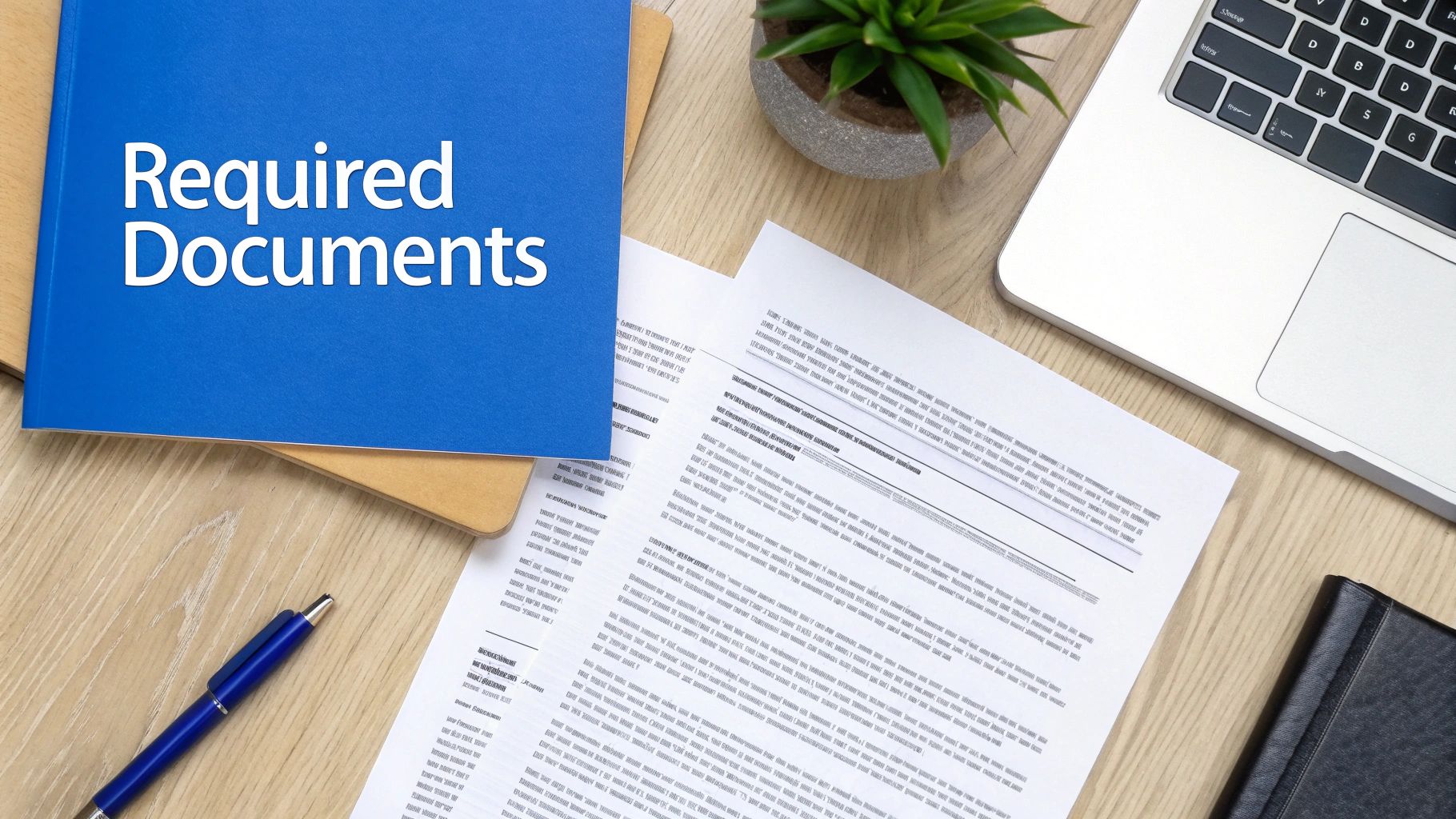
Let's be honest, a successful UK visitor visa application is all about the paperwork. The strength of your supporting documents is everything. It's not about submitting a mountain of papers; it's about telling a consistent, believable story. Every single document must have a purpose—to prove you are a genuine visitor who fully intends to return to Nigeria.
Imagine you're making a case to a judge you’ll never get to meet. The visa officer reviewing your file has only the evidence you provide to make their decision. If your documents are disorganised or incomplete, you create doubt, and doubt is the quickest way to get a visa refusal.
The Must-Have Documents
While your personal situation might call for a few extra documents, almost every applicant from Nigeria will need to start with this core set. Think of this as the foundation of your entire application.
- Your Current Passport: Make sure it’s valid for your whole trip and has at least one completely blank page for the visa sticker. No ifs, ands, or buts.
- Proof of Financial Stability: This is where many applications fall apart. You'll need six months of bank statements for all your accounts. They need to show a history of consistent income and a stable balance, not a sudden, unexplained lump sum that appeared last week.
- Evidence of Your Ties to Nigeria: You have to prove you have strong reasons to come back home. This could be a letter from your employer, documents showing you own property, or proof of close family ties and responsibilities in Nigeria.
Getting a full picture of the general UK visa requirements for Nigerian citizens will help you understand how each document plays its part.
Expert Tip: It's not just about having the money; it's about showing where it came from and that it has been stable over time. A huge amount of cash deposited right before you apply is a massive red flag. Visa officers will immediately question the source of the funds and your credibility.
Making Sure Your Documents Tell the Right Story
Let's break down why these papers are so critical by looking at what a visa officer sees. They are trained to spot anything that doesn't add up.
A Strong Application (Funke's Story):
Funke, a project manager, wants to go on a two-week holiday to London. She submits:
- A letter from her company confirming her job, salary, and importantly, her approved leave dates.
- Six months of statements from her salary account, clearly showing her monthly pay arriving like clockwork.
- Statements from a separate savings account with a healthy, steadily growing balance.
- Booked return flights and hotel reservations that match her leave dates and are affordable based on her income.
This paints a perfect picture. Funke has a good job and a life to come back to. Her finances make sense for the trip she’s planned. It’s a low-risk, easy approval.
A Weak Application (Chidi's Story):
Chidi, who is self-employed, applies for a visa. He provides:
- A business account statement with erratic, large cash deposits and no clear paper trail.
- A personal bank statement showing a massive deposit of ₦5 million that landed just one week before he applied, with zero explanation.
- A very vague itinerary with no confirmed hotel bookings.
This application is full of red flags. Where did that ₦5 million come from? Is his business legitimate? The lack of clear, consistent evidence makes it almost impossible for the visa officer to say "yes".
Your goal is simple: make your application look like Funke's, not Chidi's. Every document should work together to prove you are a credible visitor who will play by the UK's rules.
Time to Submit: The Online Form and Your Biometrics Appointment
You've got all your paperwork sorted. Now it's time to move things online, and this is where every detail counts. You'll be heading to the official GOV.UK portal to fill out your application before booking your biometrics appointment.
The golden rule here is consistency. Every piece of information you enter on that online form—from your salary to your travel dates—must match your supporting documents exactly. A small slip-up, like mentioning a different reason for your trip than what's in your invitation letter, can raise a red flag for the visa officer.
This image gives a great overview of the journey ahead.
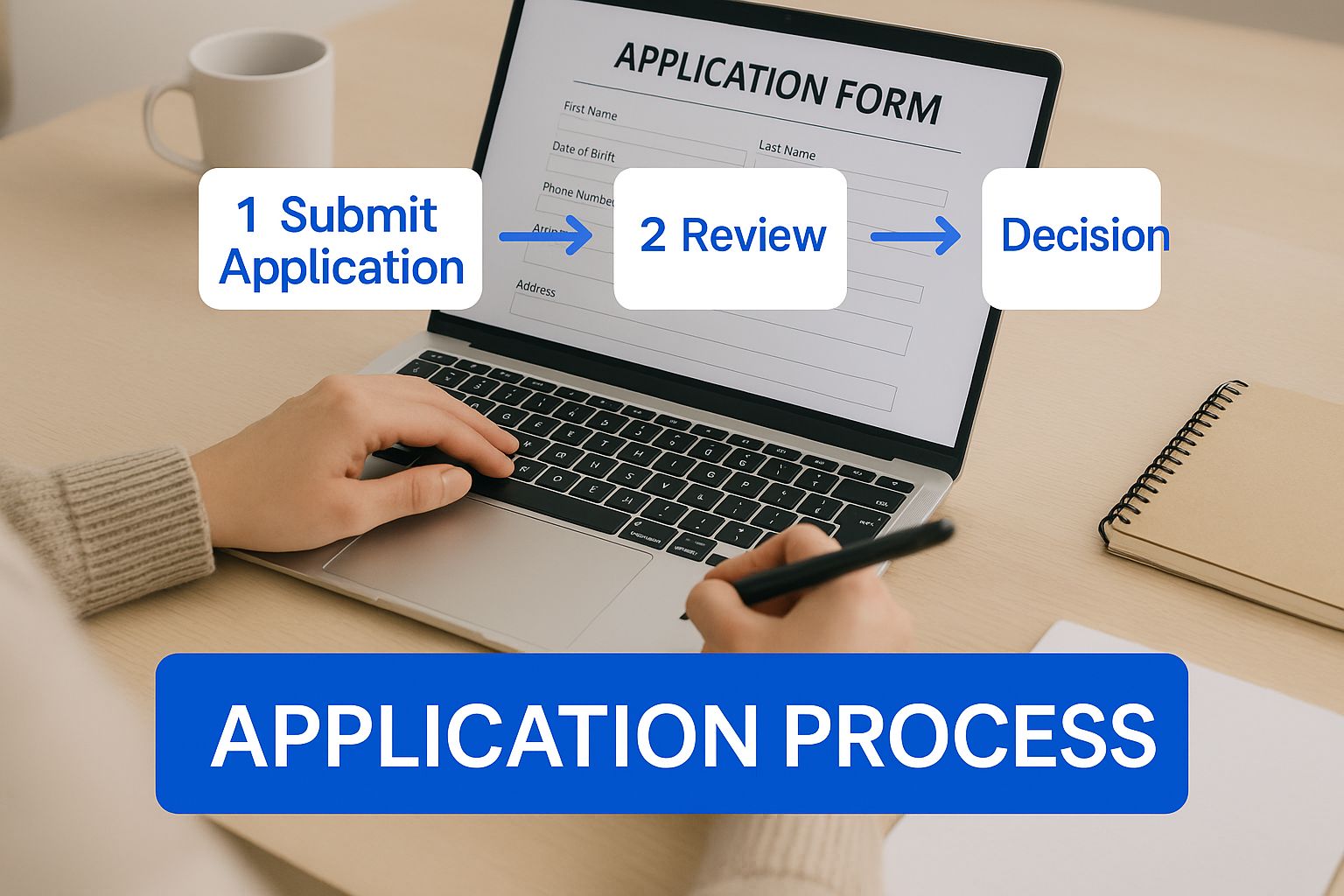
As you can see, it all starts with that online form. It’s the foundation of your entire application.
Tackling the GOV.UK Application Portal
The only legitimate place to start your UK visa application is the official government website. Get ready for a deep dive; the form asks for everything from your personal details and financial standing to your complete travel history and the nitty-gritty of your UK trip.
Don't rush it. A common pitfall I see is people breezing through the travel history section. You absolutely must declare all international trips from the last 10 years. This includes any visa refusals you've ever had, from any country. Failing to mention a past refusal is a major red line and can result in an instant rejection, or worse, a 10-year ban.
The same goes for your finances. When you state your income and savings, use the exact figures from your bank statements and payslips. No rounding up, no guessing. Precision is everything.
Think of the online form as your sworn statement. The system is built to catch inconsistencies, and a visa officer will scrutinise your answers against your documents. Treat every field with the seriousness it deserves.
Booking Your Biometrics at TLScontact
Once you've triple-checked everything, paid the visa fee, and hit submit, you'll be directed to the TLScontact website. They are the official partner for UK Visas and Immigration (UKVI) in Nigeria, handling the collection of documents and biometric data. You’ll need to book an appointment at one of their Visa Application Centres (VACs) in Abuja or Lagos.
Here’s a breakdown of what to expect:
- Getting an Appointment: Standard slots are free, but they get snapped up fast. If you're in a hurry, you might need to pay for a premium appointment, like a "prime time" slot, to get seen sooner.
- Handling Your Documents: You have two choices. You can scan and upload your documents yourself before the appointment (self-service), or you can pay a fee for the TLScontact staff to do it for you at the centre (assisted service). The self-service option saves you money, but you need a good scanner and must follow their digital guidelines to the letter.
- What to Expect at the VAC: On the day, a staff member will review your documents, scan your fingerprints, and take a digital photo. They will also take your passport, which gets forwarded to the UKVI decision-making centre.
Remember, this is not an interview. The staff at the centre are purely administrative and have no influence over whether your visa is approved. Your job is simply to show up on time with your passport and ensure all your documents have been submitted correctly.
Showing You Can Afford Your Trip and Will Return to Nigeria
Let's be honest, this is where most UK visa applications from Nigeria either succeed or fail. The visa officer is looking for rock-solid proof of two things: first, that you can comfortably pay for your entire trip, and second, that you have very strong reasons to come back home. Getting this part right is absolutely critical.
Showing you have enough money isn't just about the closing balance on your bank statement. In fact, a huge lump sum of cash showing up right before you apply is one of the biggest red flags you can raise. What they really want to see is a stable financial picture over the last six months. This proves the money is yours and that you have a steady, legitimate income.
How to Paint a Convincing Financial Picture
Your bank statements are the star of the show here. They need to tell a clear story of financial responsibility. This means your salary should be seen crediting your account every month, and if you have savings, they should ideally grow steadily over time.
Are you self-employed? Your job is a bit tougher because you need to prove your business is real and profitable. Bank statements alone won't cut it. You'll need to back them up with:
- Business Registration Documents: Show that your company is properly registered with the Corporate Affairs Commission (CAC).
- Tax Clearance Certificates: This proves you're a responsible citizen who pays their taxes.
- Invoices or Contracts: A selection of recent invoices or client contracts demonstrates that your business is active and making money.
When you put all this together, you create a believable narrative of a successful business that can easily fund your travel plans.
A visa officer’s main job is to scrutinise the source of your funds. If they see a large, unexplained deposit, they will immediately doubt your story. Be ready to explain any significant transaction that looks out of place.
Proving Your Strong Ties to Nigeria
Just as crucial as your finances are what we call "home ties." The UK Home Office must be completely convinced you won't disappear after your visa expires. You need to show them that your life is firmly planted in Nigeria – personally, professionally, and financially.
So, how do you prove these unbreakable ties?
- Your Job: Get a letter from your employer. It should state your position, salary, how long you've worked there, and—this is key—that your leave for the trip has been approved and they expect you back at work on a specific date.
- Your Family: Having dependents in Nigeria is a very strong tie. Include your marriage certificate and your children's birth certificates to show you have major family responsibilities to return to.
- Your Property: If you own property, this is a powerful anchor. Documents like a Deed of Assignment or a Certificate of Occupancy are excellent proof of a significant financial and personal investment in Nigeria.
It's also worth noting how wider economic issues can be perceived. For example, the floating of the Naira in mid-2023 led to a massive drop in its value. While this mainly hit students hard—their UK tuition fees jumped by about 80% in Naira terms—it shows that visa officers are aware of economic pressures that might make a UK trip seem less affordable. A British Council analysis dives deeper into these effects.
Ultimately, your goal is to build a case so compelling that the visa officer has zero doubt about your plans to return home. Once you've submitted everything, the waiting game begins. You can learn how to keep tabs on your application's progress with our guide on effective visa application tracking.
What to Expect After You Apply

So, you’ve done your biometrics at the TLScontact centre. You’ve submitted everything and now… you wait. This part is often the most nerve-wracking, but understanding the process can take some of the edge off. Your application, passport, and all those carefully prepared documents are now in the hands of a UK Visas and Immigration (UKVI) decision-maker.
The Waiting Game and Tracking Your Application
Officially, the standard processing time for a UK visitor visa from Nigeria is around three weeks, which translates to 15 working days. Think of this as a guideline, not a guarantee. I've seen applications sail through, while others take longer, especially during peak travel times like summer or Christmas. If your case has a few complexities or they need to double-check something, expect a bit of a delay.
You're not completely in the dark, though. You can keep an eye on your application's progress using the tracking portal on the TLScontact website. You’ll need the reference number they gave you at your appointment. It’s a simple tool, but it will tell you when your application is with UKVI and, crucially, when it’s back at the visa centre waiting for you.
Getting the Decision: The Big Reveal
The email you've been waiting for will eventually land in your inbox. It will be from TLScontact, informing you that a decision has been made and your passport is ready to be collected. But here's the catch: the email won't reveal the outcome. The suspense continues until you have your passport back in your hands.
If your application was successful, a visa sticker (called a vignette) will be placed on one of the pages of your passport. It's a fantastic feeling, but don't start celebrating just yet. Before you even leave the collection centre, check it for errors. Seriously.
- Your Details: Is your name spelled correctly? Is your passport number and date of birth accurate?
- The Dates: Look at the "valid from" and "valid to" dates. This is the window you have to make your first entry into the UK.
- Visa Type: Ensure it says "Visit" and notes the correct duration, which is usually for a six-month stay.
Finding a mistake after you've left can be a real headache. If something is wrong, report it immediately to the staff on-site.
A visa refusal can be a massive disappointment, but it isn't a dead end. Treat it as a tough but valuable lesson. The refusal letter is your key to understanding what went wrong and how to fix it next time.
What if It’s a Refusal?
If you open your passport and there's no visa, you'll find a formal refusal letter instead. This letter is incredibly important. It will lay out the specific reasons why the Entry Clearance Officer wasn't satisfied with your application.
Common reasons for refusal often circle back to two main things: doubts about your financial situation or concerns that you might not return to Nigeria after your visit.
Read that letter multiple times. The biggest mistake people make is rushing to re-apply with the exact same documents, hoping for a different outcome. That almost never works. You must directly address every single point raised by the officer, strengthening your case with new and more convincing evidence to overcome their initial objections. This is your blueprint for building a stronger, more successful application in the future.
Got Questions? We've Got Answers on the UK Visa Process
Let's be honest, the UK visiting visa process from Nigeria can feel like a maze. It's only natural to have a lot of questions. Getting the right information is the difference between a successful application and a frustrating refusal. Here are some of the most common queries I hear from applicants.
How Much Money Do I Really Need for a UK Visa?
This is probably the number one question on everyone's mind, but there’s no magic number. Forget what you've heard about needing a specific amount in your account. What the visa officer truly wants to see is that you can comfortably pay for your entire trip—flights, where you're staying, and your daily spending money—without touching UK public funds.
What’s more powerful than a huge lump sum? Six months of bank statements that tell a clear story. They should show your regular income, how you save, and that the money for your trip has been built up over time. A large, unexplained deposit just before you apply is a major red flag. Consistency is king here; it proves your financial situation is stable and believable.
Can I Get a UK Visitor Visa if I'm Unemployed?
Yes, you absolutely can, but you have to be extra thorough with your application. Since you don't have a job to prove your ties to Nigeria, you need to build an exceptionally strong case in other ways. Your main goal is to show who is funding your trip and give solid proof that you have every reason to return home.
Here’s what that could look like:
- A detailed sponsorship package, including your sponsor's bank statements, a letter explaining their relationship to you, and a formal declaration of support.
- Proof of significant assets back home, like property ownership documents or business registration details.
- Evidence of deep family roots, such as being the primary caregiver for an elderly parent.
- Documentation showing you're enrolled in a course or have promising job interviews lined up, proving your plan is to return.
What Are the Top Reasons Nigerians Get Refused for a UK Visa?
From my experience, most visa refusals for Nigerian applicants boil down to a handful of recurring mistakes. The biggest culprits are weak financial evidence, failing to convince the visa officer you'll leave the UK at the end of your visit, and inconsistencies across your application documents.
A classic error is having money in your account without being able to show where it came from legitimately. Another is submitting a travel itinerary that just doesn't add up with your financial standing—like planning a luxury trip on a shoestring budget. Honesty and careful preparation are your best tools to avoid these pitfalls.
Is an Invitation Letter a Must-Have?
No, an invitation letter isn't technically mandatory. However, if you're visiting friends or family, it can make a real difference. A good letter from your host in the UK adds credibility to your trip, confirms your accommodation, and provides a clear purpose for your visit.
But remember, while it’s a great supporting document, it doesn’t replace the core requirements. The visa officer's decision will ultimately hinge on your own financial stability and the strength of your ties to Nigeria.
Feeling overwhelmed by the visa process? JapaChat is here to help. Get instant, AI-powered answers to your specific immigration questions and plan your journey with confidence. Start for free and join over 10,000 Nigerians making their move easier at https://japachat.com.
-

12 Canadian Universities Without IELTS For 2025 Entry
For many prospective Nigerian students, the dream of studying in Canada often seems to hit a roadblock at the English language proficiency test, particularly the IELTS. The cost, logistics, and pressure associated with this exam can present significant hurdles. Fortunately, many reputable Canadian universities now recognise that a single test doesn't define a student's linguistic ability, opening up several alternative pathways.
This guide is designed to be your definitive resource, detailing specific institutions and programmes that offer alternatives to the IELTS. We will explore direct exemptions available to Nigerian applicants, the growing acceptance of tests like the Duolingo English Test, and dedicated pathway programmes that can lead to conditional admission.
Inside this comprehensive list, you will find a breakdown of the precise requirements for each of the canadian universities without ielts requirements for certain applicants. We will also examine the potential limitations and the practical steps you need to take for each option, complete with direct links and screenshots. Our goal is to provide a clear, actionable roadmap, helping you plan your application with confidence. Securing admission without an IELTS score is not just a possibility; it's a well-defined route that thousands of students successfully navigate each year.
1. Brock University – English Proficiency and Exemptions
Brock University's admissions website provides a clear and direct pathway for international students, particularly those from Nigeria, looking for Canadian universities without IELTS requirements. The site explicitly lists countries where English is the primary language, and Nigeria is included, often exempting applicants from submitting English proficiency test scores if they meet specific criteria. This transparency makes it a standout resource for Nigerian students navigating the application process.
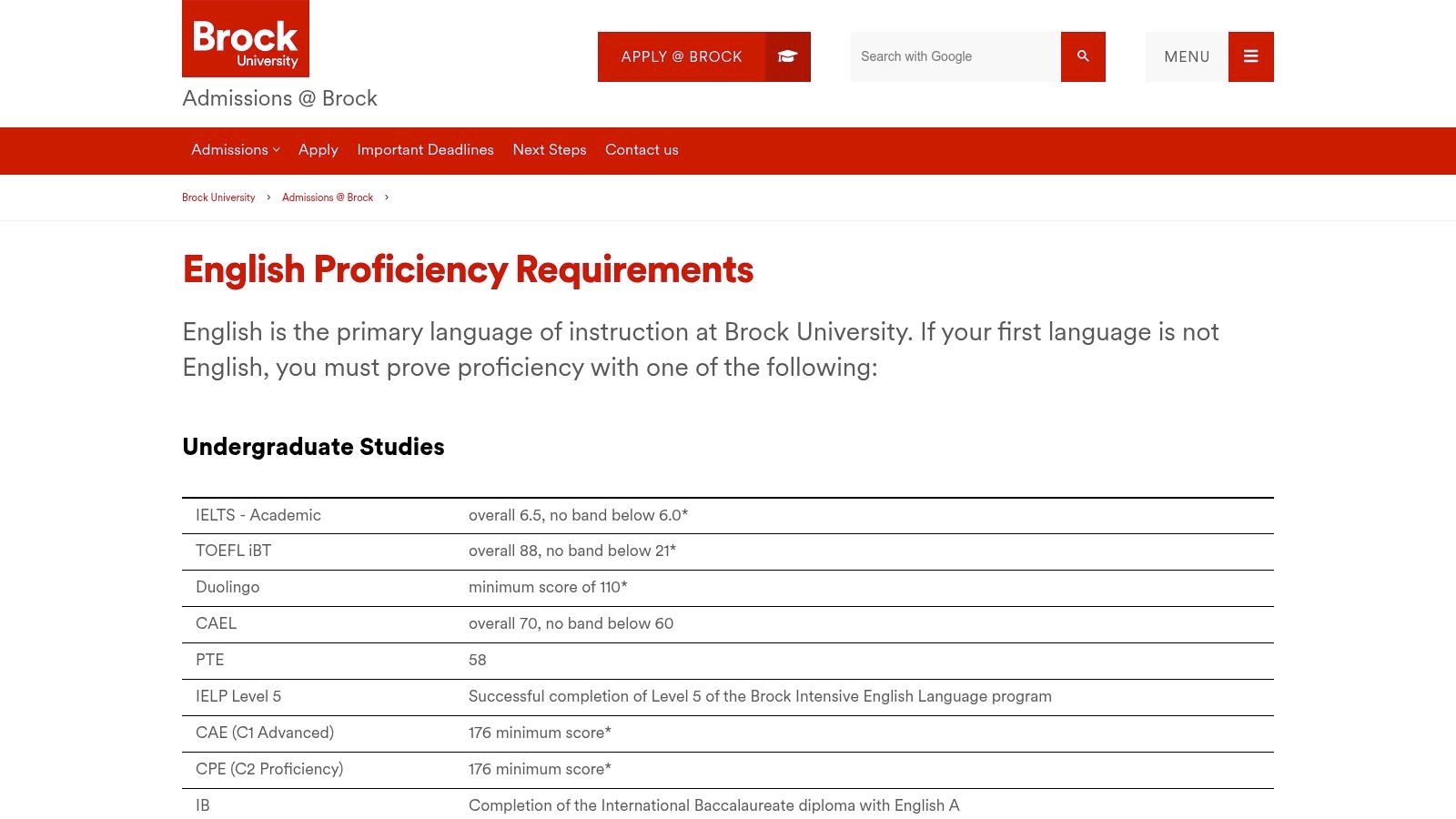
The platform is exceptionally well-organised, detailing all accepted alternatives to IELTS, such as the Duolingo English Test and TOEFL iBT Home Edition. For students who do not meet direct entry requirements, Brock offers the Intensive English Language Program (IELP) as a conditional admission route. This allows you to secure a place at the university while you improve your English skills. Understanding these entry options is a key part of meeting the overall Canada student visa requirements for Nigerians.
Key Features and Considerations
- Nigerian Exemption: Applicants who have completed the West African Examinations Council (WAEC) or National Examinations Council (NECO) exams with a minimum grade of C6 in English may be exempt.
- Multiple Test Alternatives: Accepts a broad range of tests, including PTE, CAEL, and online versions of popular exams.
- Conditional Pathway: The IELP provides a structured route to full admission, making it accessible even if you don't initially have the required test scores.
Website: Brock University English Proficiency Details
2. York University – English Language Proficiency Requirements and Exemption List
York University’s future students' portal is another excellent resource for Nigerian applicants exploring Canadian universities without IELTS. The website clearly outlines its exemption criteria, explicitly listing Nigeria as a country from which applicants may be exempt from submitting English proficiency tests, provided they have completed at least four years of full-time study in an institution where English was the sole language of instruction. This direct information saves prospective students significant time and effort.
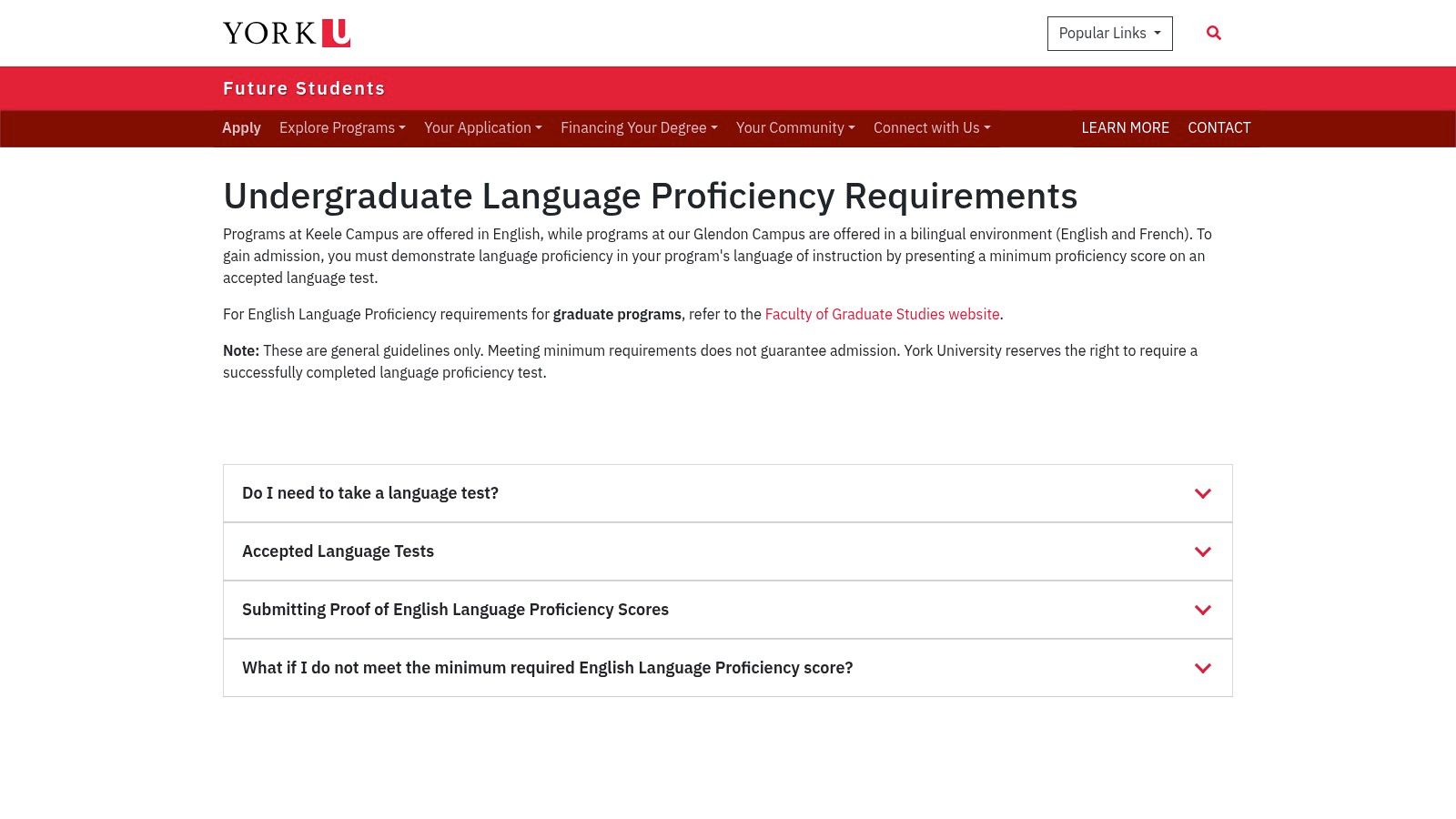
The platform is meticulously organised, presenting detailed tables with minimum score requirements for a wide array of alternative tests, including Duolingo, TOEFL, PTE, and CAEL. For students who do not meet the direct entry language requirements, York offers conditional admission through its immersive Year One and accelerated English programmes. These pathways provide a structured route into a degree programme while simultaneously building your academic English skills, making a top-tier university education more accessible.
Key Features and Considerations
- Clear Exemption Policy: Nigeria is listed as an exempt country, although conditions apply and are subject to individual review.
- Broad Test Acceptance: Accepts Duolingo, TOEFL, PTE, CAEL, and Cambridge English tests, giving applicants numerous alternatives to IELTS.
- Integrated Language Pathways: Offers conditional admission through well-structured programmes like the YU Bridge Program for those needing to improve their English.
- Faculty-Specific Requirements: Note that language score requirements can vary significantly between different faculties and programmes.
Website: York University English Language Proficiency Details
3. University of Windsor – English Language Proficiency Exemptions and Duolingo Acceptance
The University of Windsor offers a highly detailed admissions resource that specifies exemption criteria, making it one of the most transparent Canadian universities without IELTS for Nigerian applicants. Its website clearly lists universities in Nigeria whose graduates are considered exempt from English proficiency tests for undergraduate studies. This direct approach simplifies the process, allowing students from recognised institutions to bypass an otherwise mandatory step.
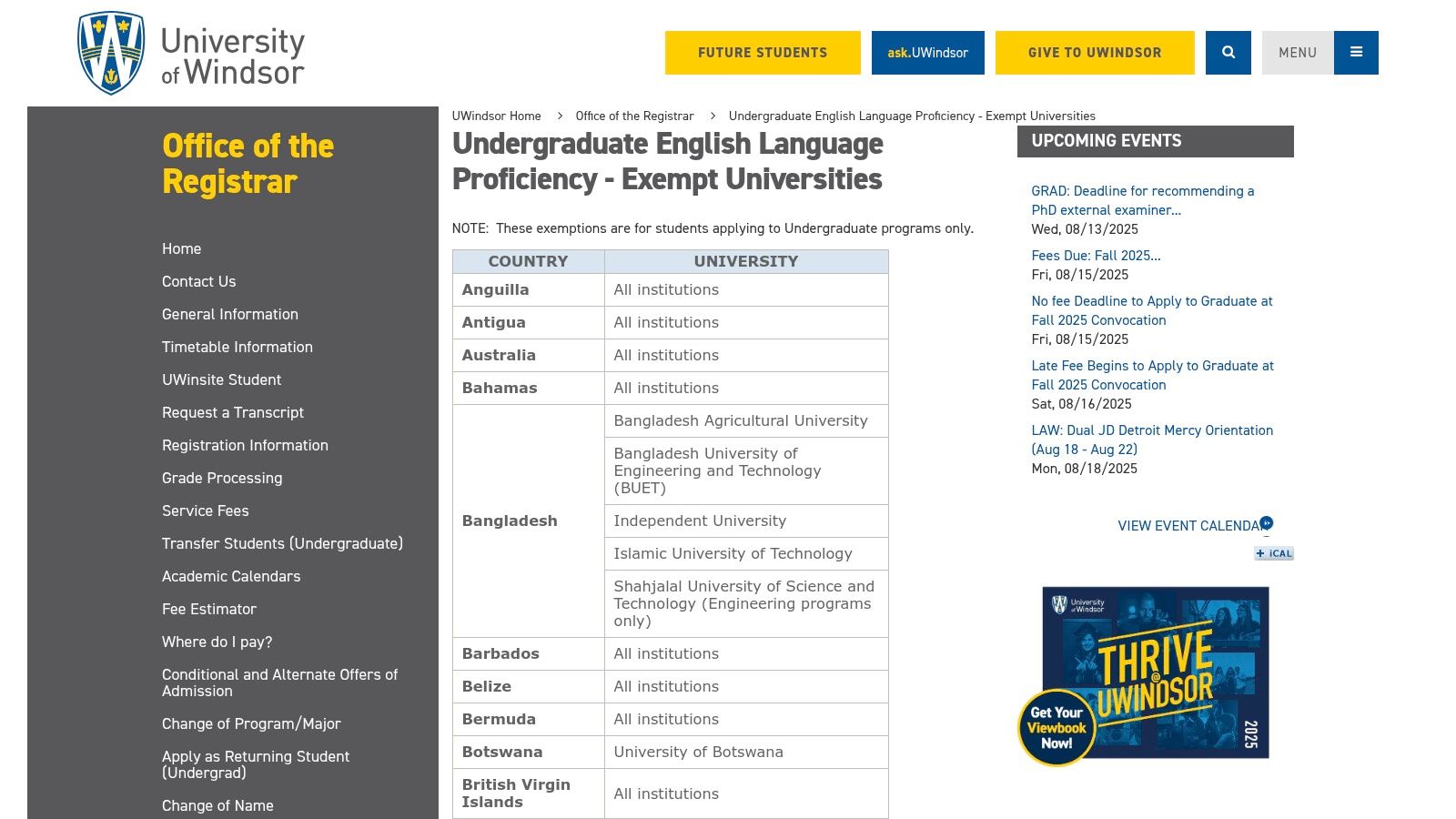
The platform is well-organised, providing comprehensive details on all accepted English test alternatives, including Duolingo, with a typical minimum score of 115 for undergraduate entry. For those who do not meet the direct entry or exemption criteria, the university offers a conditional admission route through its on-campus English Language Improvement Program (ELIP). This pathway programme ensures that prospective students can secure their admission while completing the necessary language training on-site, a significant advantage for many.
Key Features and Considerations
- Named Nigerian University Exemptions: The admissions site explicitly names Nigerian universities whose graduates may qualify for an English proficiency waiver.
- Flexible Test Alternatives: Accepts a wide range of modern tests, including Duolingo, TOEFL, PTE, and CAEL, giving applicants multiple options.
- Pathway Programme: The on-campus ELIP provides a structured and supportive environment for students to meet language requirements for full admission.
- Variable Requirements: It is crucial to note that some faculties or graduate programmes may have higher score requirements, so always verify the specifics for your chosen course.
Website: University of Windsor English Language Proficiency Exemptions
4. University of Regina – English Proficiency Alternatives and Exemptions
The University of Regina's admissions page is a well-structured resource for international students searching for Canadian universities without IELTS. It clearly outlines numerous pathways to meet English Language Proficiency (ELP) requirements, making it a valuable tool for applicants. The university provides a publicly available and regularly updated list of countries where prior education in English can lead to an ELP waiver, offering a straightforward exemption route for eligible students.
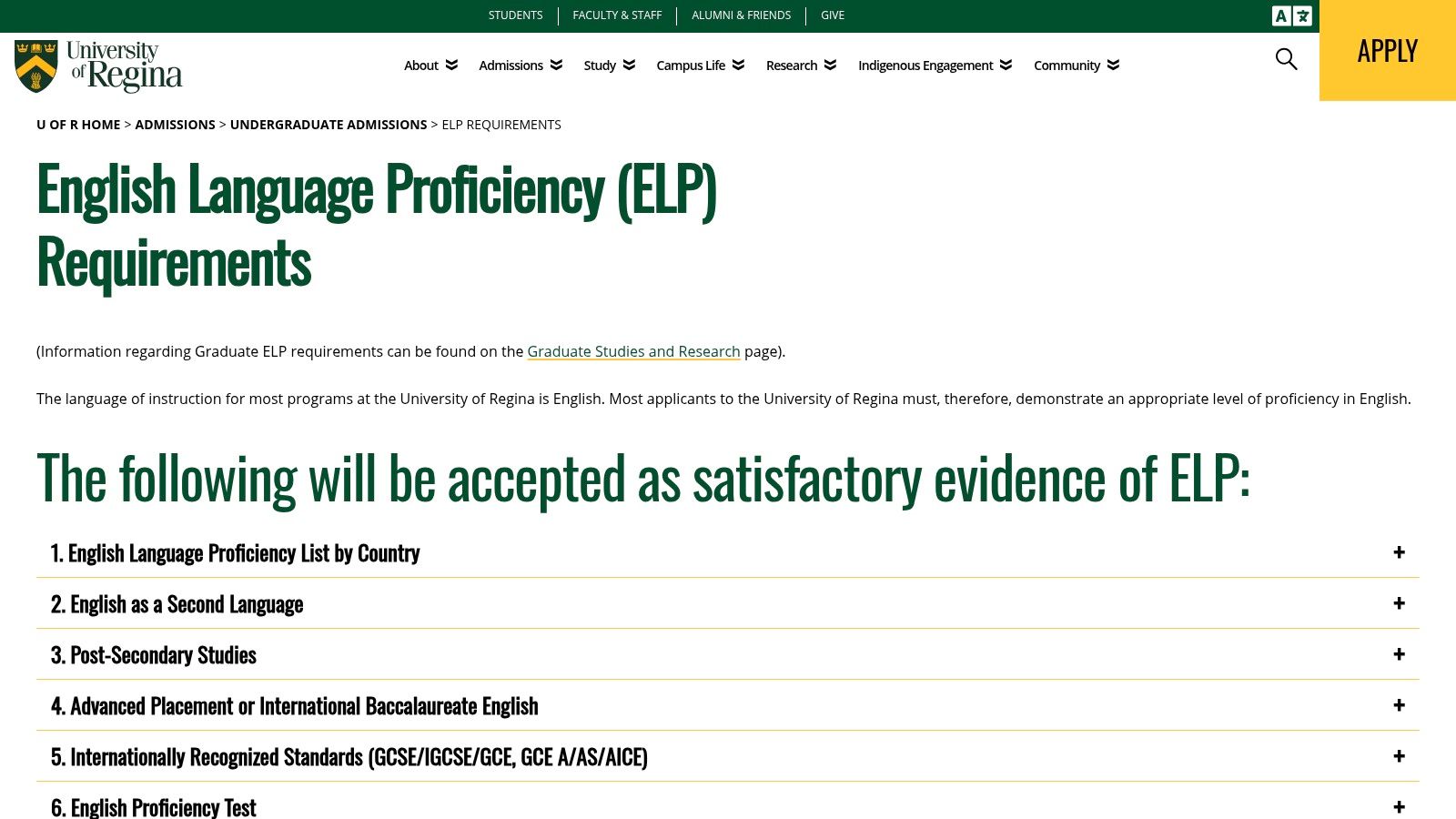
This platform excels by detailing minimum score requirements for a wide array of accepted tests, including Duolingo, TOEFL, and PTE. For those who do not initially qualify for direct admission, the university's ESL centre offers the English for Academic Purposes (EAP) programme. This conditional admission pathway allows you to build your language skills on campus before beginning your degree programme, ensuring you are well-prepared for academic success.
Key Features and Considerations
- Wide Range of Tests: Accepts multiple online and offline tests, providing significant flexibility beyond just IELTS.
- Study-in-English Waiver: A clear ELP waiver is available for applicants who meet specific criteria based on their previous education in English.
- EAP Pathway: The university's ESL programme provides a structured, conditional admission route for students needing to improve their English.
- Faculty-Specific Rules: Be aware that some faculties, like Nursing, may have more restrictive test acceptance policies.
Website: University of Regina English Language Proficiency
5. University of Manitoba – English Language Proficiency and IAEP Pathway
The University of Manitoba’s admissions page is a valuable resource for students seeking Canadian universities without IELTS, thanks to its detailed breakdown of accepted alternatives and its internal pathway programme. The university transparently lists a wide array of accepted tests, including Duolingo, TOEFL, and PTE, providing clear minimum score requirements. This level of detail empowers applicants to choose the test that best suits their circumstances and access.
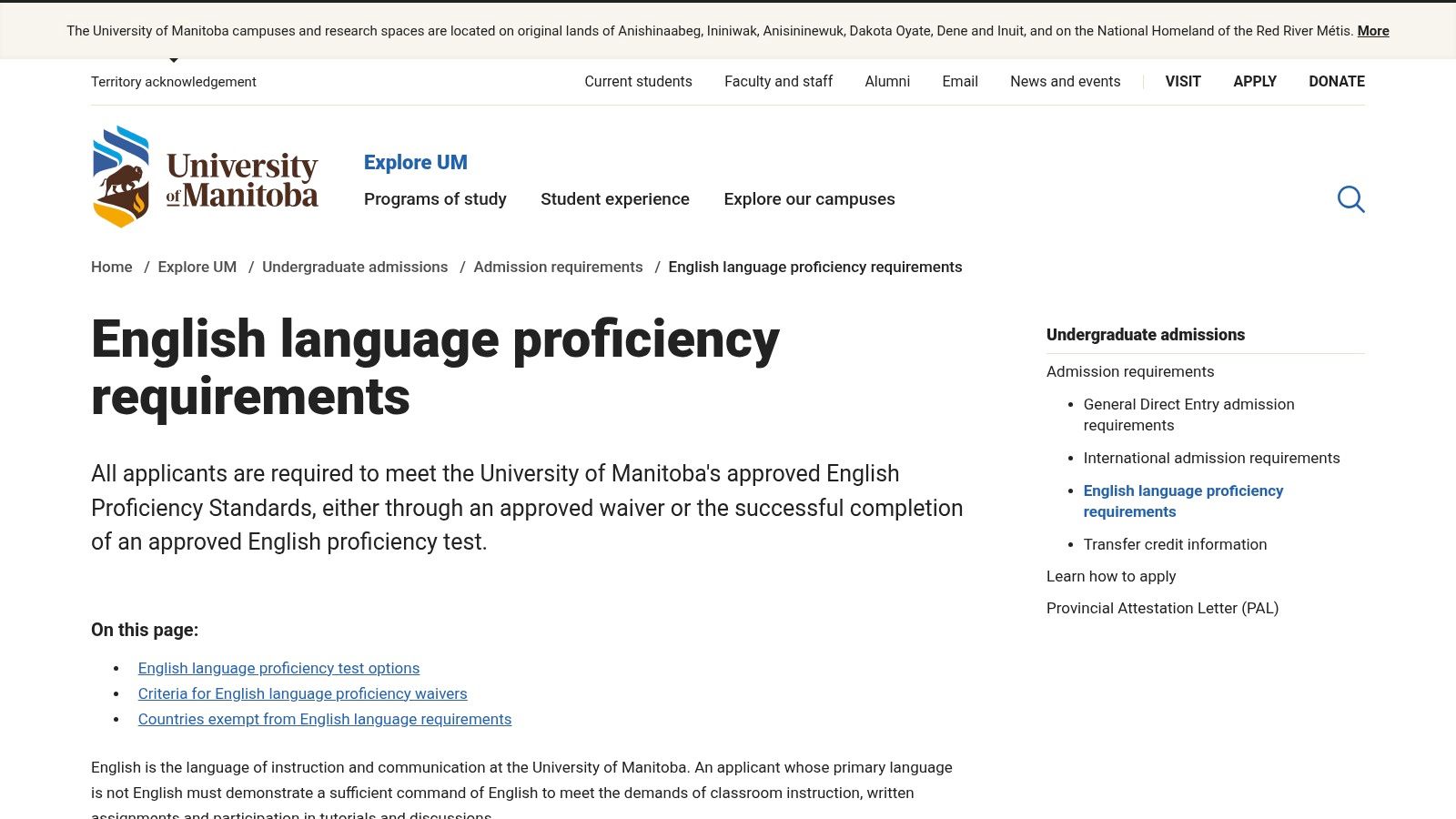
A standout feature is the Intensive Academic English Program (IAEP), a dedicated pathway that, upon successful completion, satisfies the English language requirement for most undergraduate programmes. This option is ideal for students who prefer an immersive learning environment over a one-time standardised test. The website organises information clearly, with specific notes on programme restrictions, ensuring you have all the facts before applying. For many, securing admission is the first step, followed by exploring funding through international scholarships.
Key Features and Considerations
- IAEP Pathway: Allows students to meet English proficiency requirements by completing the university’s own intensive programme instead of an external test.
- Broad Test Acceptance: Officially accepts Duolingo (with new section score requirements from Fall 2024), TOEFL, PTE, and CAEL, offering significant flexibility.
- Clear Guidelines: The platform provides centralised guidance on test validity periods and faculty-specific requirements, though some faculties like Law have stricter limitations.
Website: University of Manitoba English Language Proficiency
6. University of Saskatchewan – English Language Proficiency Options and Pathways
The University of Saskatchewan's admissions website is an excellent resource for applicants searching for Canadian universities without IELTS, offering a broad spectrum of proficiency verification methods. The platform clearly separates undergraduate and graduate requirements, providing tailored information that simplifies the application journey. It details a wide variety of accepted tests and offers an in-house language pathway, making it a flexible option for international students.
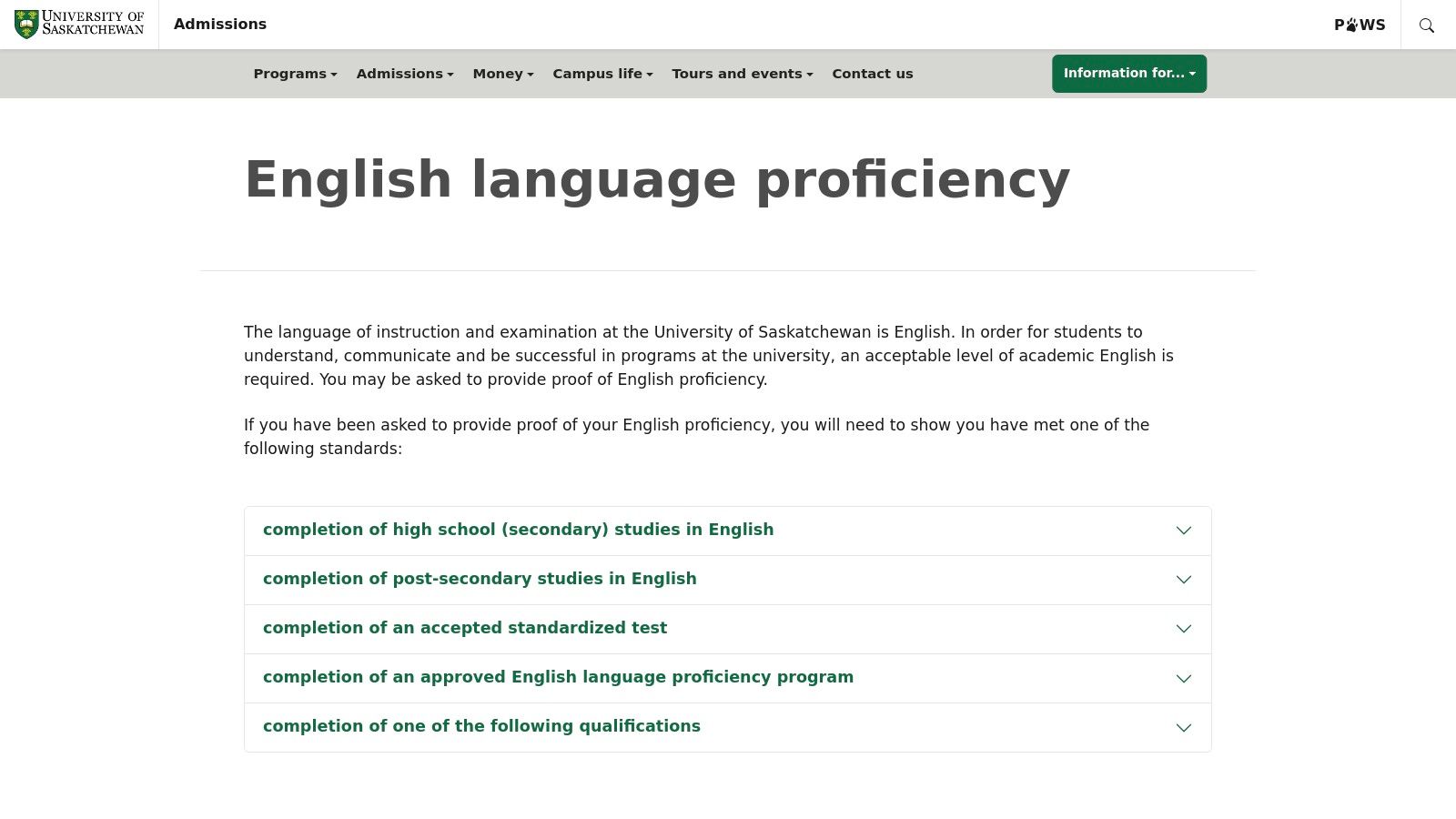
The site is well-organised, allowing prospective students to easily find information on alternatives like Duolingo, TOEFL, and PTE. A key advantage is the University of Saskatchewan Language Centre (USLC) pathway, which allows students to meet English requirements by completing an on-campus programme. For graduate applicants, the site explicitly outlines criteria for exemptions based on prior degrees from recognised English-language institutions, though it’s crucial to check specific departmental policies as they can vary.
Key Features and Considerations
- Multiple Test Alternatives: Accepts a comprehensive list of tests including Duolingo, CAEL, TOEFL, PTE, and Cambridge English assessments.
- In-House Pathway: The USLC’s EAP Level 4 programme serves as a direct, internal route to fulfilling English proficiency for admission.
- Graduate Exemptions: Clear guidelines are provided for graduate students who may be exempt based on having a degree from an institution where English was the medium of instruction.
- Departmental Variations: Be aware that some faculties may have higher score requirements or may not accept certain exemptions, so always verify with your specific department.
Website: University of Saskatchewan English Language Proficiency
7. University of Ottawa – Language Requirements and Exemptions
The University of Ottawa's language requirements page serves as a comprehensive hub for international students, particularly those from Nigeria, seeking admission without traditional IELTS scores. The platform clearly outlines exemptions, such as having completed at least three years of full-time study in an institution where English is the language of instruction. This makes it an invaluable resource for applicants exploring Canadian universities without IELTS who have an English-based academic background.
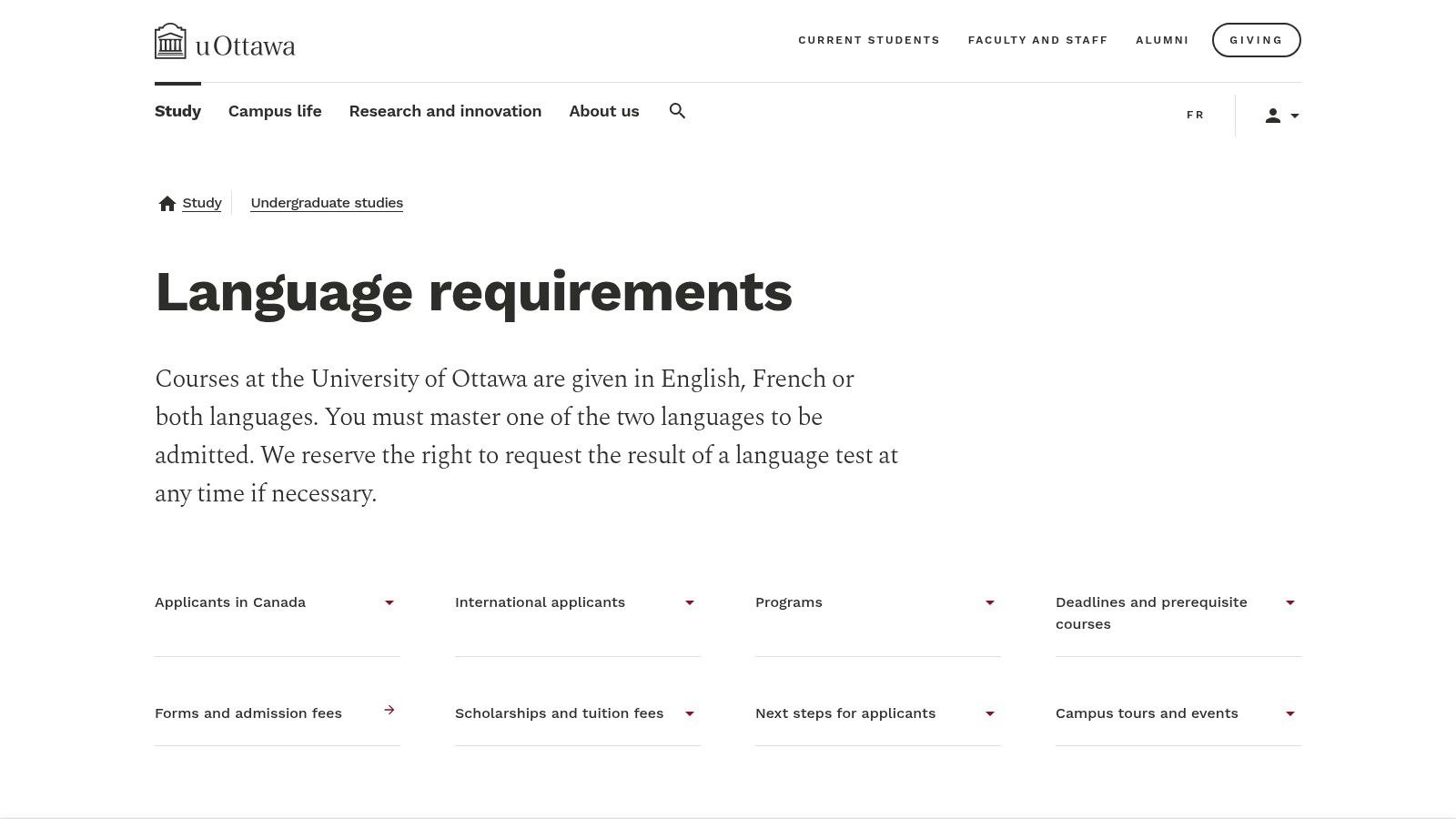
The site is exceptionally well-organised, providing detailed score tables for each accepted alternative, including Duolingo, TOEFL, and PTE. For those who do not meet the direct entry benchmarks, the university offers an English Intensive Program (EIP) as a conditional admission pathway. This flexible approach ensures that a wider range of students can successfully relocate to Canada from Nigeria for their studies. The inclusion of a Nigeria-specific admissions page with WAEC/WASSCE details further simplifies the application journey for Nigerian students.
Key Features and Considerations
- Study-Based Exemption: Provides a clear exemption for applicants with three years of full-time study in English, a common scenario for many Nigerian graduates.
- Broad Test Acceptance: Accepts a wide variety of tests, with the Duolingo English Test (minimum 120 for most undergraduate programmes) being a popular and accessible option.
- Conditional Admission Route: The English Intensive Program (EIP) offers a structured pathway to full degree admission for students needing to improve their language skills.
- Country-Specific Guidance: Offers dedicated admissions information for Nigerian applicants, streamlining the process.
Website: University of Ottawa Language Requirements
8. ILAC University Pathway (Toronto/Vancouver and Online "KISS")
The ILAC University Pathway programme offers an alternative route to direct admission, making it a powerful resource for finding Canadian universities without IELTS. By successfully completing the required English levels within the programme, you gain direct entry to over 100 partner colleges and universities, bypassing the need for an IELTS or TOEFL score. This integrated approach simplifies the application process by combining language training and university placement.
The platform is organised around its core offering: pathway programmes available in-person in Toronto and Vancouver or online through the flexible KISS (Keep It Simple & Smart) format. The website clearly outlines the steps, from taking a level assessment to receiving a conditional letter of acceptance from a partner institution. This structured support is especially beneficial for students who prefer a guided entry into the Canadian higher education system.
Key Features and Considerations
- No IELTS/TOEFL Required: Successful completion of the pathway guarantees you meet the English language requirements for partner schools.
- Extensive Partner Network: ILAC has agreements with over 100 Canadian public colleges and universities, providing a wide array of study options.
- Flexible Delivery: You can choose between in-person classes for a full immersion experience or the convenient online KISS programme.
- Placement Support: The programme includes comprehensive counselling to help you choose and apply to suitable partner institutions.
Website: ILAC University Pathway Programme
9. International College of Manitoba (ICM) – Pathway to University of Manitoba
The International College of Manitoba (ICM) offers a specialised pathway for international students aiming to study at the University of Manitoba, making it an excellent resource for those seeking Canadian universities without IELTS. ICM's website clearly outlines its foundation and first-year university-level programmes, which are designed to transition students directly into the second year of a degree at the University of Manitoba. This structured approach simplifies the admission process for many, including Nigerian students.
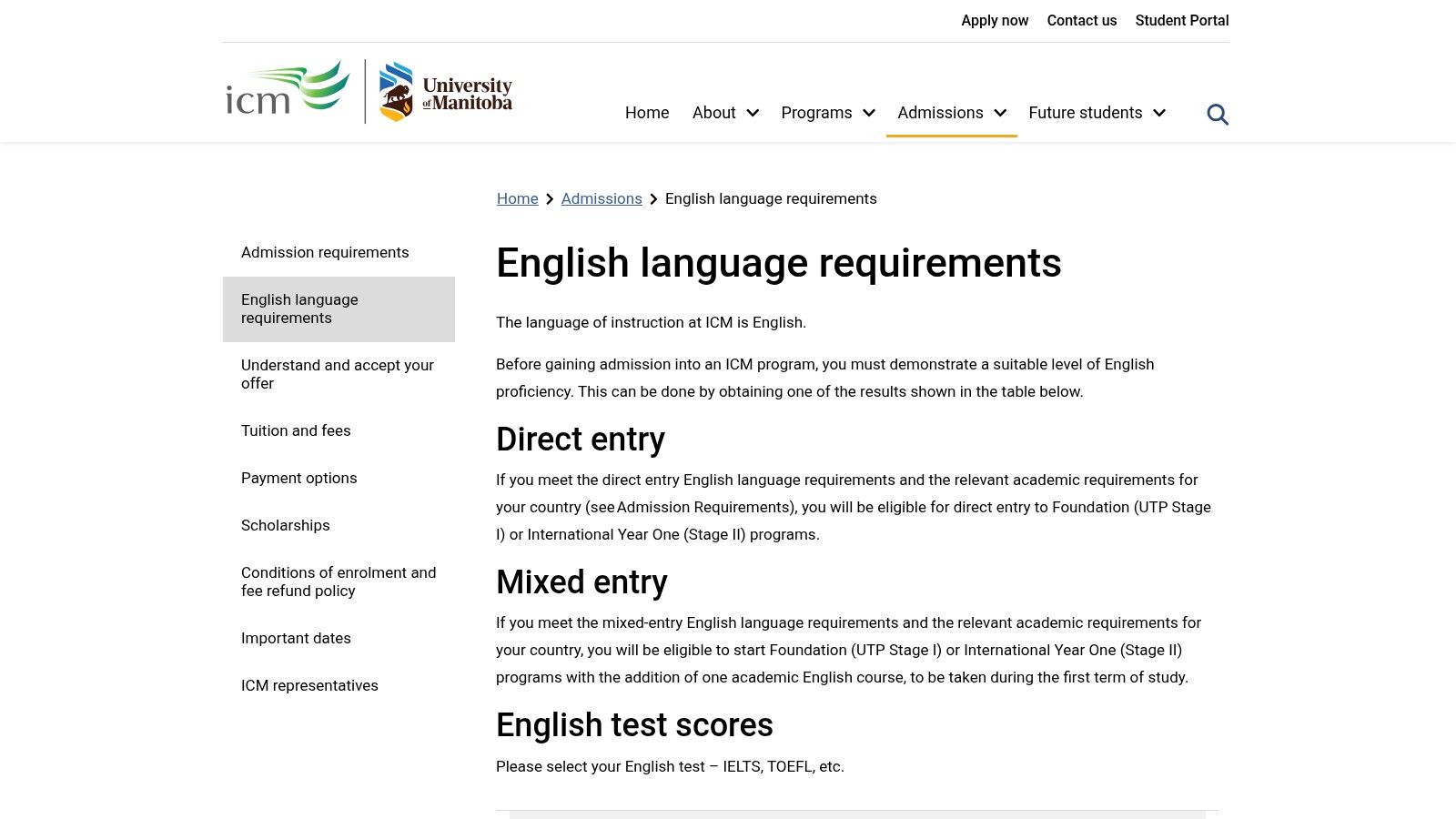
The platform details its English language requirements, which include accepting a variety of tests like Duolingo, TOEFL, and PTE. Crucially, students who do not meet these scores can receive a conditional offer and enrol in the University of Manitoba’s Intensive Academic English Program (IAEP). Upon successful completion of the IAEP, you can proceed to your ICM programme without needing to provide any other English test score, offering a reliable, integrated route to university admission.
Key Features and Considerations
- Pathway Programme: Provides a direct route to the University of Manitoba upon successful completion, acting as the first year of a bachelor's degree.
- Flexible Intakes: With three intakes per year (January, May, and September), you have multiple opportunities to begin your studies.
- IAEP Route: Offers conditional admission through its English language programme, a great alternative if you don't meet direct entry test requirements.
- Clear Alternatives: The website clearly lists all accepted tests and scores, removing ambiguity from the application process.
Website: International College of Manitoba English Language Requirements
10. Fraser International College (FIC) – Pathway to Simon Fraser University
Fraser International College (FIC) provides a strategic pathway for international students aiming to study at Simon Fraser University (SFU), making it a key resource for those seeking Canadian universities without IELTS. Operated by Navitas, FIC's admissions website clearly outlines its English language requirements, explicitly listing Nigeria as a country where English is the principal language. This often allows applicants who completed their secondary education in English to bypass traditional proficiency tests.
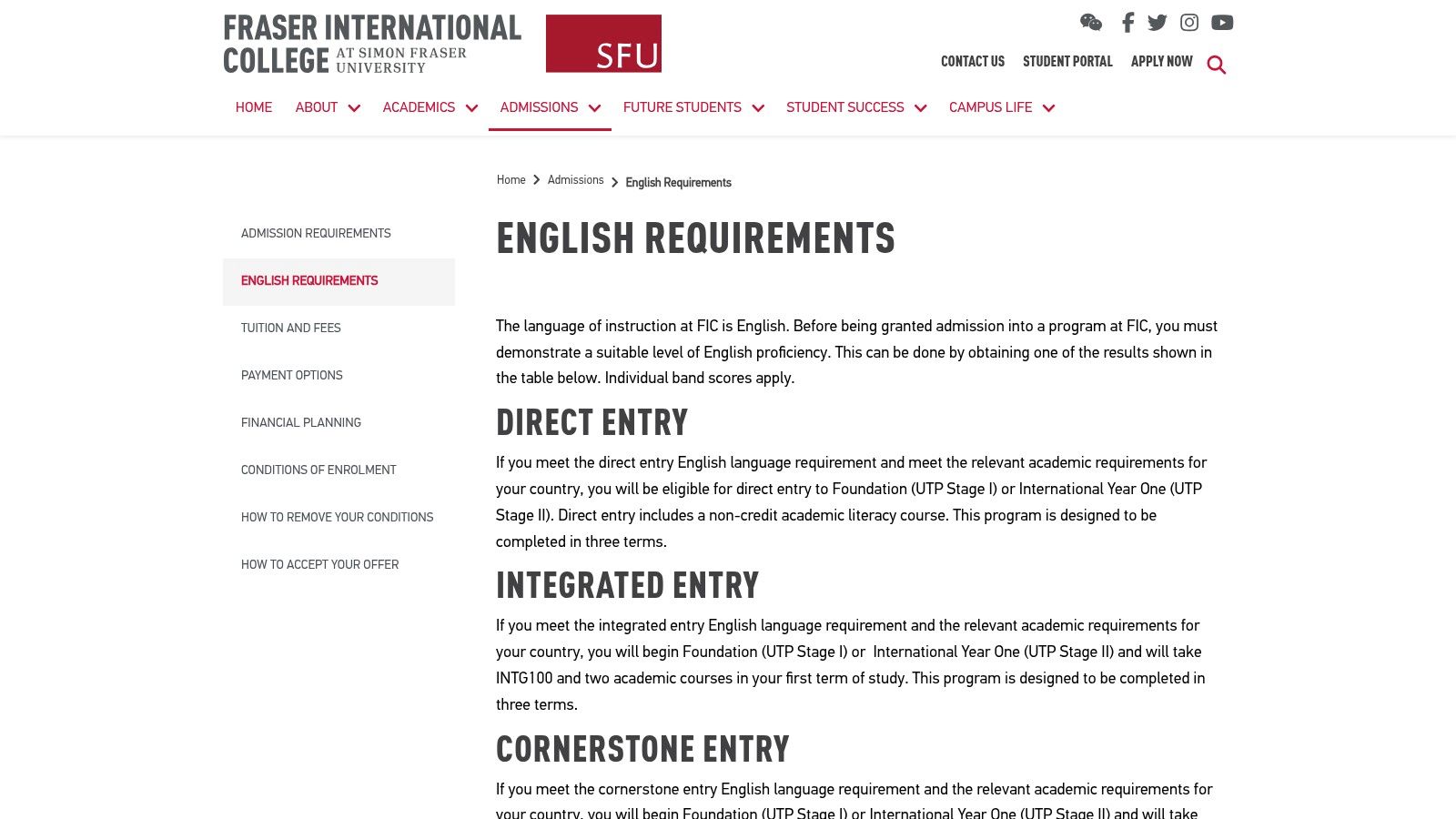
The platform is designed to be user-friendly, detailing numerous alternatives to IELTS, such as the Duolingo English Test, PTE, and TOEFL. What makes FIC stand out is its tiered entry system, which offers integrated and cornerstone programs. This flexible structure provides a conditional pathway, allowing students with varying levels of English proficiency to gain admission while receiving academic and language support. This ensures a smoother transition into the demanding environment of a top-tier Canadian university like SFU.
Key Features and Considerations
- Nigerian Exemption: Applicants from Nigeria may be exempt from submitting test scores if their secondary education was conducted in English.
- Flexible Test Alternatives: The college accepts a wide range of modern proficiency tests, including Duolingo, offering greater accessibility.
- Structured Pathway Programs: FIC's integrated programs combine language support with first-year university-level courses, leading directly into the second year at SFU upon successful completion.
- Potential Extra Costs: While an excellent route, the pathway program involves additional tuition and can extend the overall duration of your studies compared to direct university entry.
Website: Fraser International College English Requirements
11. Duolingo English Test (DET) – Official Testing and Purchase
The Duolingo English Test (DET) official website is a critical resource for students seeking a fast and affordable alternative to traditional proficiency exams. As many Canadian universities without IELTS now accept the DET, this platform allows applicants from Nigeria to take a fully online, on-demand test from home. Its primary advantage is convenience and speed, delivering results within 48 hours and allowing you to send them to unlimited institutions at no extra cost.
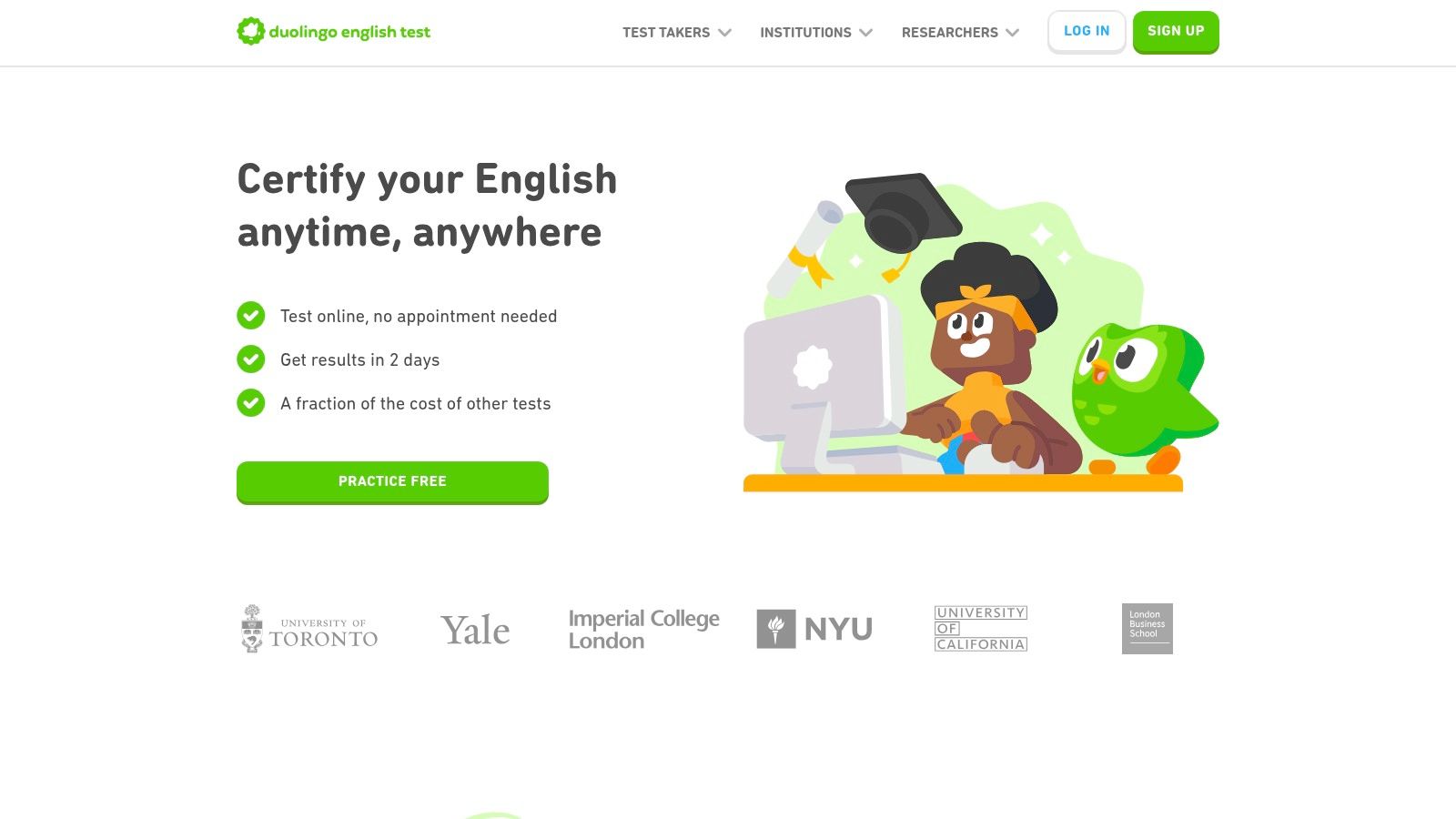
The website itself is streamlined for a simple user experience: you create an account, purchase the test (currently around $65 USD), and can take it whenever you are ready. The platform provides a free practice test, which is invaluable for understanding the adaptive question format. This accessibility and low cost make it a popular choice, though it's crucial to verify that your specific desired programme at a Canadian university accepts the DET, as acceptance is not yet universal across all faculties.
Key Features and Considerations
- Online and On-Demand: The test can be taken from anywhere with a stable internet connection, eliminating the need to travel to a test centre.
- Cost-Effective: Significantly cheaper than IELTS or TOEFL, with free and unlimited score reporting included in the test fee.
- Rapid Results: Official results are typically certified and available within two days, speeding up your application timeline.
- Growing Acceptance: An increasing number of Canadian Designated Learning Institutions (DLIs) officially recognise the DET for admissions.
Website: Duolingo English Test
12. OUAC (Ontario Universities’ Application Centre) – Centralized Application Portal
OUAC serves as the central hub for applying to universities in Ontario, streamlining the process for international students. While OUAC itself doesn't set language policies, it is a crucial tool for anyone targeting Ontario-based Canadian universities without IELTS requirements. The platform allows you to submit a single application to multiple institutions, saving significant time and effort. Its structured process directs you to each university's specific requirements, where you can find exemption details for Nigerian applicants.
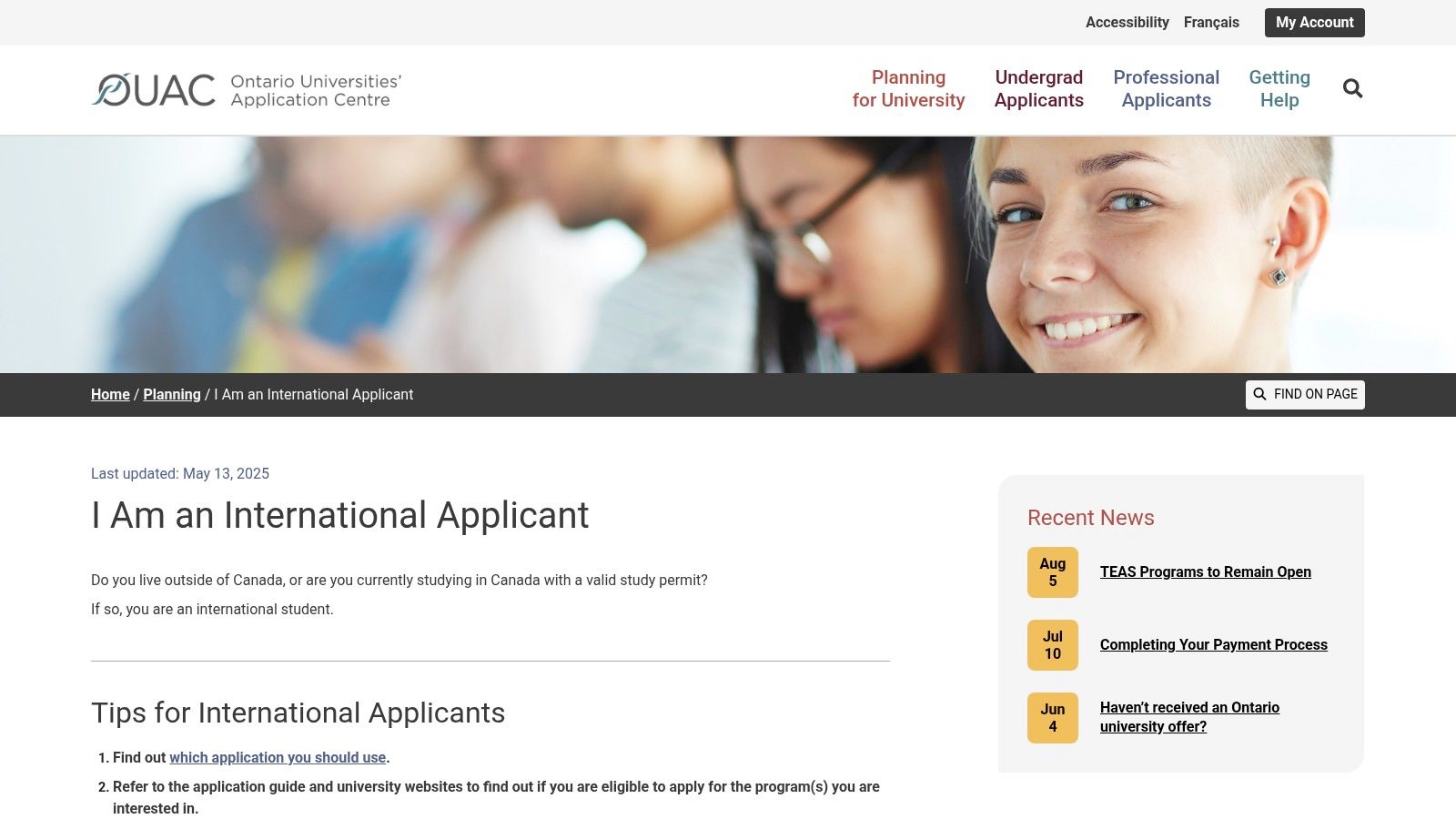
The portal is organised to guide international applicants through every step, from selecting programmes to submitting documents. You pay one base fee plus additional fees for each university choice, making it a cost-effective way to broaden your options. For Nigerian students, the key is to use OUAC as a starting point and then diligently check the language policy pages of each selected university, as many offer waivers based on WAEC/NECO results or previous instruction in English.
Key Features and Considerations
- Centralised Applications: Apply to multiple Ontario universities with one online application and a consolidated fee structure.
- Official Gateway: Serves as the official, reliable channel for undergraduate applications, ensuring your submissions are processed correctly.
- Direct University Links: The platform provides clear guidance and links to individual university policies on English proficiency and admission.
- Application Tracking: Easily track the status of all your applications to different universities within the OUAC portal.
Website: OUAC International Applicant Information
English Proficiency & Exemption Comparison of 12 Canadian Universities
Item Core Features/Pathways ✨ User Experience/Quality ★★★★ Value Proposition 💰 Target Audience 👥 Unique Selling Points 🏆 Price Points 💰 Brock University Exemptions for Nigeria; IELP pathway Clear guidance; detailed upload steps Conditional admission without test scores Nigerian students Wide test acceptance; Nigeria on exempt list Free sign-up; standard tuition York University Multiple test acceptance; accelerated EAP Transparent scoring; clear pathways Flexible admission pathways Undergrads & grads from Nigeria Multiple test options; faculty-specific reqs Standard tuition University of Windsor Nigerian university exemptions; ELIP On-campus support; clear exemptions Conditional admission via English programs Nigerian undergrads Named Nigerian universities exemption Regular tuition fees University of Regina Multiple test acceptance; EAP program Updated requirements; waiver available ESL pathway available; multiple test options Nigerian applicants Publicly updated exemption list Tuition varies by program University of Manitoba IAEP pathway; Duolingo accepted Multiple intakes; clear communications Bypass IELTS via IAEP completion Nigerian & international students Strong internal English pathway IAEP may have tuition fees University of Saskatchewan Many alternatives; USLC EAP pathway Faculty-specific policies; grad exemptions Comprehensive undergrad & grad options Nigerian & English-medium grads Graduate exemptions; in-house language center Standard tuition University of Ottawa Duolingo accepted; EIP pathway Nigeria-specific admission info Conditional admission with detailed guidance Nigerian undergrads 3-year English study exemptions; dedicated support Standard tuition ILAC University Pathway No IELTS after pathway completion Frequent intakes; strong counseling Direct university entry without IELTS Intl students aiming Canada 100+ Canadian partner schools Additional tuition & time International College of Manitoba Foundation & IY1; IAEP pathway Multiple yearly intakes; direct articulation Reliable no-IELTS route Nigerian & intl students Clear alternatives; flexible entry Longer duration, possible extra cost Fraser International College (FIC) Multiple accepted tests; tiered entries Strong academic & language support Pathway to SFU without IELTS Nigerian students English as Principal Language exemption Additional tuition & duration Duolingo English Test (DET) Fully online, quick results Affordable; unlimited free score reports Widely accepted by Canadian DLIs Test takers worldwide On-demand testing; easy scheduling ~$70 per test OUAC (Ontario Universities’ App) Centralized application; fee transparency Reliable platform; multiple uni apps Saves time & fees; links to English policies Intl undergrad applicants One-stop portal for Ontario universities Standard application fees Your Next Steps to Studying in Canada Without IELTS
Embarking on your Canadian university journey without the IELTS exam is not just a possibility; it's a practical reality for many Nigerian students. This guide has detailed numerous pathways, from direct university exemptions to alternative English proficiency tests and dedicated pathway programmes. The common thread connecting all these options is the need for proactive and meticulous planning.
The landscape of Canadian universities without IELTS is varied. Some institutions, like Brock University and the University of Windsor, have clear policies for exempting students based on their prior English-language education. Others, such as the University of Manitoba, offer integrated pathway programmes like the Intensive Academic English Program (IAEP) to bridge any language gaps before you begin your degree.
Key Takeaways and Strategic Planning
Your success hinges on understanding that there is no one-size-fits-all solution. A strategy that works for an applicant to the University of Saskatchewan might not be suitable for someone targeting York University.
Here are the most critical takeaways to guide your next steps:
- Verification is Non-Negotiable: Always visit the official university website and navigate to the specific admissions page for your desired programme and faculty. Policies can differ significantly between, for instance, an engineering faculty and a business school within the same university. Do not rely solely on third-party information.
- The MOI Letter is Your Asset: If your previous education was conducted entirely in English, a Medium of Instruction (MOI) letter from your Nigerian university is your most powerful tool. Request this document early, ensuring it is on official letterhead and clearly states that English was the exclusive language of instruction and examination.
- Embrace Alternative Tests Strategically: The Duolingo English Test (DET) has become a widely accepted, convenient, and cost-effective alternative. However, confirm that your specific programme of interest accepts it and be aware of the minimum score required. It is an excellent backup plan even if you are pursuing an exemption.
- Pathway Programmes Offer a Structured Route: Tools like the ILAC University Pathway or Fraser International College (FIC) are not just about language; they are about acclimatisation. These programmes are designed to ease you into the Canadian academic environment, which can be a significant advantage for long-term success.
Creating Your Application Action Plan
To move from planning to action, organise your approach. Start by shortlisting 3-5 universities from our list that align with your academic and career goals. Create a checklist for each one, noting application deadlines, required documents (transcripts, MOI letter, reference letters), and their specific English proficiency policy.
If you are using a centralised portal like the Ontario Universities’ Application Centre (OUAC), familiarise yourself with the platform well before deadlines loom. This will help you manage multiple applications efficiently. Your journey to studying in one of the many Canadian universities without IELTS requires diligence, but the path is clear. By using the resources and strategies outlined in this article, you are well-equipped to build a compelling application and turn your dream of studying in Canada into a reality.
Navigating university requirements and visa applications can be complex. For personalised, AI-powered guidance on every step of your immigration journey, from choosing a university to preparing your study permit application, explore JapaChat. Get instant answers to your specific questions and create a customised relocation plan by visiting JapaChat today.
-

9 Best City to Move in Canada for Immigrants (2025 Guide)
Choosing the best city to move in Canada is a monumental decision, one that shapes your career, lifestyle, and future. With its vast landscapes and diverse cultures, Canada offers a city for every dream, but the perfect place for a tech entrepreneur in Vancouver might not suit a young family seeking affordability in Calgary. This guide cuts through the noise, offering a detailed roundup of nine top Canadian destinations.
We move beyond generic advice to deliver a practical comparison. You will find an in-depth analysis of crucial factors for each city, including:
- Job Market: Key industries, employment rates, and career opportunities.
- Cost of Living: Housing prices, rent, and daily expenses.
- Community & Lifestyle: Cultural scene, climate, and overall vibe.
- Immigration Support: Provincial Nominee Programs (PNPs) and settlement services.
This breakdown is designed to give you actionable insights, helping you make an informed choice that truly aligns with your personal and professional goals. Whether you are a Nigerian professional planning your relocation, a student exploring study options, or an individual seeking tailored guidance, this resource will help you pinpoint the ideal Canadian city to call your new home. For personalised assistance, platforms like JapaChat can streamline your immigration planning, offering AI-powered advice specific to your situation.
1. Toronto, Ontario
As Canada's largest metropolis and economic epicentre, Toronto is a magnet for ambitious professionals and families from across the globe. This dynamic urban centre is a true mosaic of cultures, offering an unparalleled variety of neighbourhoods, world-class amenities, and a job market that is both robust and diverse. For many considering where to settle, Toronto is a top contender for the best city to move in Canada, especially for those seeking career growth in sectors like finance, technology, and the arts.
A Hub of Opportunity and Culture
Toronto’s global reputation is built on its economic strength and vibrant cultural landscape. The city is home to Bay Street, Canada's equivalent of Wall Street, making it the nation's undisputed financial capital. Beyond the corporate towers, revitalised areas like the historic Distillery District showcase successful urban renewal, transforming industrial spaces into bustling hubs for arts, dining, and retail. This blend of economic power and cultural vibrancy creates a unique and energetic environment for newcomers.
Navigating Life in Toronto
While the opportunities are vast, so is the cost of living, particularly housing. To manage this, many newcomers find a balance by:
- Exploring suburban options: Consider municipalities like Mississauga, Brampton, or Markham for more affordable housing and family-friendly communities, while still having access to the city via public transit.
- Budgeting strategically: Housing will be your largest expense. Plan for significantly higher rent or property prices compared to other Canadian cities.
- Leveraging public transit: The Toronto Transit Commission (TTC) is extensive. A monthly pass is a cost-effective way to navigate the city without the expense of a car.
- Embracing free events: Toronto hosts numerous free festivals, street fairs, and cultural events throughout the year, offering endless entertainment without breaking the bank.
The following chart provides a snapshot of Toronto's key economic indicators, including housing costs, employment rates, and income levels.
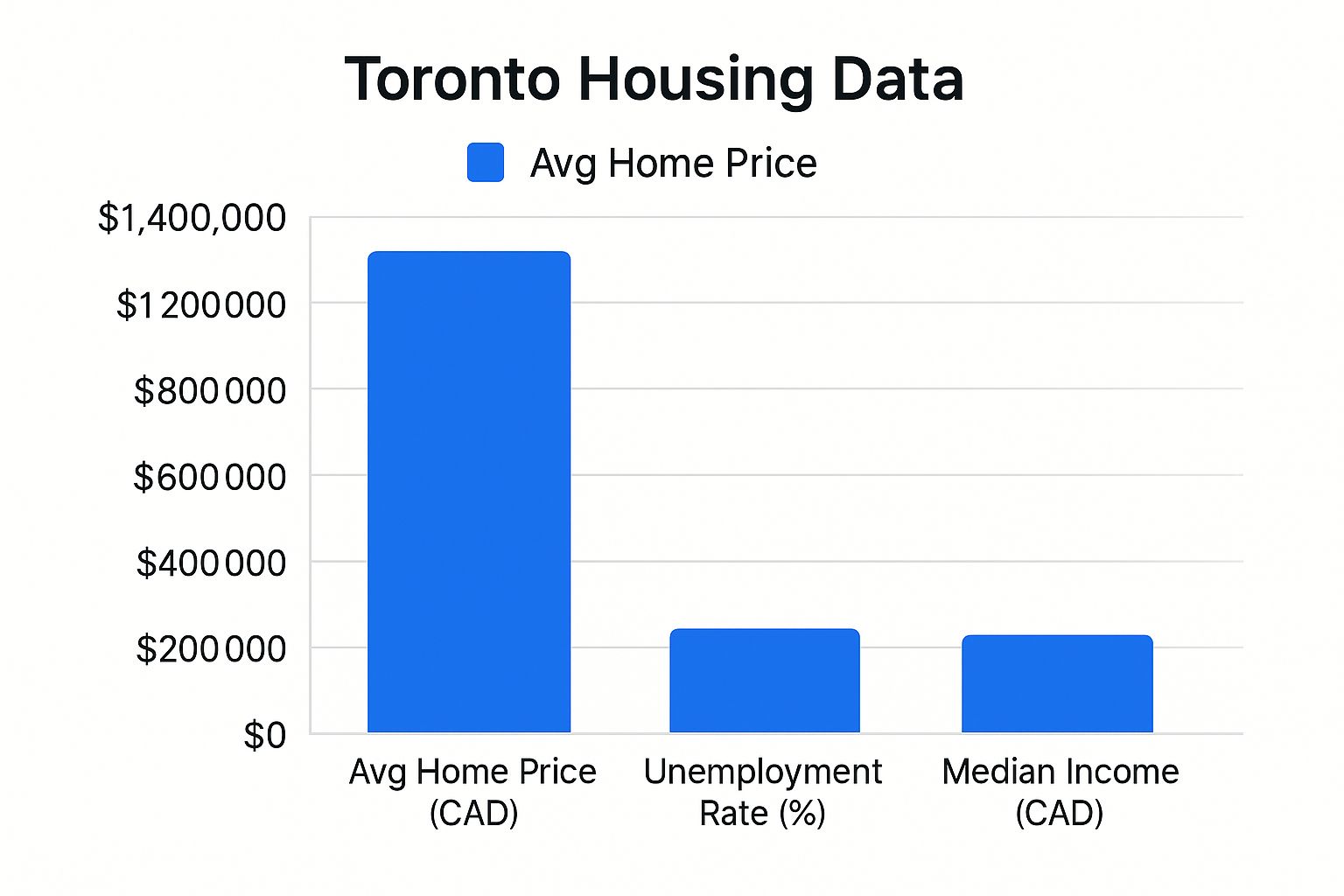
This data highlights the trade-off many residents face: while Toronto offers higher median incomes, the average home price is a significant financial barrier. For those looking to immigrate directly to the province, understanding specific pathways is crucial. You can learn more about the Ontario Immigrant Nominee Program (OINP) to explore your options for making this vibrant city your new home.
2. Vancouver, British Columbia
Nestled between the Pacific Ocean and towering mountains, Vancouver is renowned for its breathtaking natural beauty and mild climate. This West Coast metropolis is a paradise for outdoor enthusiasts and a hub for innovation, particularly in the tech and film industries. Consistently ranked among the world's most liveable cities, Vancouver offers a unique blend of urban sophistication and natural wonder, making it a strong candidate for the best city to move in Canada for those who prioritise lifestyle and a connection to nature.

A Hub of Opportunity and Culture
Vancouver's economy thrives on its status as a major port and its growing tech sector, often dubbed "Silicon Valley North." The city’s stunning scenery has also made it a major centre for film and television production. Culturally, Vancouver is defined by its Pacific Rim connections, evident in its diverse culinary scene and vibrant communities. Urban planning successes, like the transformation of Granville Island into a bustling public market and the development of the Olympic Village, showcase the city's commitment to creating dynamic, liveable public spaces.
Navigating Life in Vancouver
The unparalleled quality of life in Vancouver comes with a high cost of living, especially for housing. Newcomers can adapt by:
- Exploring adjacent cities: Consider communities like Burnaby, North Vancouver, or Richmond for slightly more affordable housing with good transit links to the city centre.
- Embracing the outdoors: Offset entertainment costs by taking advantage of free activities like hiking in Stanley Park, relaxing on Kitsilano Beach, or cycling the seawall.
- Investing in rain gear: Vancouver's rainy season is a reality. High-quality waterproof clothing is essential for staying comfortable and active year-round.
- Networking in key industries: Focus on opportunities in the booming tech and digital media sectors, which offer competitive salaries and strong career prospects.
3. Montreal, Quebec
Combining old-world European charm with North American innovation, Montreal stands out for its unique cultural identity and affordability. As the largest French-speaking city outside France, it offers a vibrant arts scene, historic architecture, and a lower cost of living compared to Canada’s other major cities. For those seeking a truly distinct lifestyle, Montreal is often considered the best city to move in Canada, blending cultural immersion with economic opportunity.

A Hub of Opportunity and Culture
Montreal’s dynamic economy is fuelled by sectors like aerospace, video gaming, artificial intelligence, and life sciences. The city’s cultural heart beats strongest in districts like the Quartier des Spectacles, which hosts world-renowned events like the Just for Laughs comedy festival and the Montreal International Jazz Festival. This successful blend of modern industry and rich cultural programming, seen also in the preservation of Old Montreal, makes the city an exciting and enriching place to live and work.
Navigating Life in Montreal
Adjusting to life in this bilingual metropolis involves embracing its unique character. Newcomers can thrive by:
- Learning basic French: While many people speak English, proficiency in French is a significant asset for career advancement and social integration.
- Utilising subsidised childcare: Quebec’s affordable daycare system is a major advantage for families with young children, significantly reducing household expenses.
- Exploring diverse neighbourhoods: From the trendy Plateau Mont-Royal to the family-friendly Rosemont, each area offers a different vibe and lifestyle.
- Using the BIXI bike-share system: Montreal is a very bike-friendly city, and using BIXI is an affordable and eco-friendly way to get around during warmer months.
- Enjoying free festivals: The city comes alive with countless free outdoor events, concerts, and markets, especially in the summer.
4. Calgary, Alberta
Known as Canada's energy capital, Calgary masterfully combines urban sophistication with the rugged beauty of the nearby Rocky Mountains. This rapidly growing city presents strong economic opportunities, not just in its traditional energy sector but also in a burgeoning tech scene. With a relatively affordable cost of living and unparalleled access to outdoor recreation, Calgary is a compelling choice for those seeking balance and is often cited as a best city to move in Canada.
An Economic Powerhouse with a Western Spirit
Calgary's identity is deeply rooted in its status as the centre of Canada's oil and gas industry, hosting numerous corporate headquarters. However, the city is much more than its economic foundation. The world-famous Calgary Stampede celebrates its rich western heritage, while projects like the East Village revitalisation have transformed urban areas into vibrant, modern communities. This blend of corporate drive and cultural pride, along with legacy facilities from the 1988 Winter Olympics, creates a unique, high-energy environment.
Making the Most of Life in Calgary
To thrive in this dynamic city, newcomers should consider the unique aspects of its economy and lifestyle:
- Embrace the outdoors: The city's greatest asset is its proximity to Banff and Jasper National Parks. Plan regular trips to enjoy world-class hiking, skiing, and sightseeing.
- Invest in winter gear: While Calgary enjoys more sunshine than any other major Canadian city, its winters are cold. Good quality winter clothing is a non-negotiable investment.
- Plan for vehicle ownership: Calgary is a spread-out city, and while public transit exists, a car is often necessary for commuting and exploring the surrounding region.
- Explore the tech sector: Beyond energy, Calgary's tech industry is expanding. Research opportunities in this growing field for diverse career paths.
Calgary offers a high quality of life with a more accessible cost of living compared to Toronto or Vancouver. For those considering a move to the province, it's beneficial to understand the specific immigration routes available. You can learn more about the Alberta Advantage Immigration Program to explore your options for making this thriving city your new home.
5. Ottawa, Ontario
As Canada's capital, Ottawa offers a unique combination of political importance, economic stability, and exceptional quality of life. This bilingual city is a major draw for professionals in public service and technology, providing a calm yet vibrant atmosphere. For those prioritising a balanced lifestyle with strong job security and cultural richness, Ottawa stands out as a strong candidate for the best city to move in Canada.
A City of Stability and Natural Beauty
Ottawa’s identity is shaped by its role as the seat of the federal government, which provides a stable employment base centred around Parliament Hill. Beyond its political significance, the city is renowned for its natural beauty and outdoor attractions, such as the Rideau Canal, which transforms into the world's largest skating rink in winter. Meanwhile, areas like the ByWard Market showcase historic charm, and the Kanata North technology park highlights its growing status as a tech hub.
Navigating Life in Ottawa
While offering a more relaxed pace than larger cities, newcomers can make the most of Ottawa by understanding its unique landscape:
- Embrace bilingualism: Gaining proficiency or certification in both English and French can significantly boost your career prospects, especially for coveted federal government positions.
- Explore across the river: The neighbouring city of Gatineau, Quebec, offers a different cultural experience and often more affordable housing options, just a short commute away.
- Leverage free attractions: As the nation's capital, Ottawa is home to numerous national museums and galleries that offer free admission at certain times, providing endless cultural enrichment.
- Network strategically: Focus on building connections within the prominent government and tech communities. Attending industry events in Kanata or public service mixers can open many doors.
6. Halifax, Nova Scotia
As Atlantic Canada's largest urban centre, Halifax offers a unique blend of maritime charm, historic character, and modern innovation. This vibrant port city is increasingly recognised for its growing tech scene, affordable cost of living, and high quality of life, making it a strong contender for the best city to move in Canada. For those seeking a balance between professional opportunity and a relaxed, coastal lifestyle, Halifax presents an appealing alternative to Canada’s larger, more expensive metropolises.
A Fusion of Heritage and Progress
Halifax's economy is rapidly diversifying beyond its traditional maritime roots. The city is becoming a significant hub for technology and innovation, exemplified by the growth of Digital Nova Scotia and the federally designated Ocean Supercluster initiative. This forward momentum is beautifully balanced with a deep respect for history, visible in the preservation of areas like the Historic Properties and the lively, modernised Halifax Waterfront. This unique combination creates a dynamic environment where career growth and a scenic, community-focused lifestyle coexist.
Making the Most of Halifax Living
Newcomers can thrive in Halifax by taking advantage of its distinct lifestyle and economic landscape. To make a successful transition, consider the following:
- Explore the tech sector: Research opportunities within the burgeoning tech startup scene, which is actively recruiting talent.
- Invest in property: Take advantage of significantly lower real estate prices compared to cities like Toronto or Vancouver to secure more affordable housing.
- Embrace the coastal culture: Engage with the maritime lifestyle through sailing, hiking along the coast, and enjoying fresh seafood and local markets.
- Look into immigration incentives: The Atlantic Immigration Program offers a dedicated pathway for skilled workers and international graduates to settle in the region.
7. Winnipeg, Manitoba
Positioned at the geographic centre of North America, Winnipeg stands out for its remarkable affordability, stable economy, and a surprisingly dynamic cultural scene. As Manitoba's capital, it merges prairie charm with essential urban amenities, presenting an appealing option for families and individuals prioritising affordable homeownership. For those weighing their options, Winnipeg is a strong contender for the best city to move in Canada, especially for newcomers seeking a balanced and community-oriented lifestyle.
An Underrated Hub of Culture and Industry
Winnipeg's quiet strength lies in its unique blend of history, culture, and economic stability. The city’s historic Exchange District is a testament to successful heritage preservation, with its turn-of-the-century architecture now housing art galleries, theatres, and trendy boutiques. Major landmarks like The Forks, a historic meeting place turned vibrant market, and the architecturally stunning Canadian Museum for Human Rights, highlight the city's commitment to culture and community. Beyond its cultural appeal, Winnipeg is a key player in industries like aerospace and transportation.
Navigating Life in Winnipeg
The city offers a lower cost of living, but newcomers should be prepared for its distinct prairie climate. To make a successful transition, many residents adapt by:
- Investing in winter gear: The winters are cold and long. High-quality winter clothing and ensuring your home is well-insulated for efficient heating are essential.
- Exploring neighbourhoods carefully: Research areas based on safety, school quality, and proximity to amenities to find the right fit for your needs.
- Embracing the winter season: Don't just endure winter; enjoy it. The city comes alive with activities like skating on the river trail and numerous winter festivals.
- Leveraging provincial immigration streams: Manitoba’s immigration programmes are known for being accessible and are a key pathway for many newcomers.
The city’s affordability and welcoming immigration policies make it an attractive destination. To explore specific pathways for relocating to the province, you can learn more about the Manitoba Provincial Nominee Program and how it can help you make this friendly prairie city your new home.
8. Quebec City, Quebec
As North America's most distinctly European city and a UNESCO World Heritage site, Quebec City offers a living experience steeped in history and French culture. Its cobblestone streets, fortified city walls, and stunning architecture create a unique atmosphere that feels worlds away from other major Canadian centres. For those captivated by history and seeking a strong cultural identity, Quebec City is a compelling choice for the best city to move in Canada, offering a unique blend of affordability and charm.
A Bastion of Culture and Stability
Quebec City's economy is anchored by its status as the provincial capital, providing significant stability through public administration and government sector jobs. The preservation of its historic core, Old Quebec, is a major driver of its robust tourism industry, which peaks during iconic events like the Winter Carnival. Beyond tourism, the city benefits from a diverse economy, including sectors like technology and research, while the vast Plains of Abraham park offers residents an incredible urban green space for recreation and community gatherings.
Navigating Life in Quebec City
Embracing life in this historic city requires a cultural and linguistic commitment. To thrive, newcomers should consider the following:
- Prioritise French fluency: French is the language of daily life, business, and government. Achieving proficiency is essential for most employment opportunities and social integration.
- Embrace the seasons: Quebec City is famous for its snowy winters. Participating in winter sports and local festivals like the Winter Carnival is key to enjoying the climate year-round.
- Explore government employment: As the provincial capital, the public sector is a major employer. Investigate job opportunities with the Government of Quebec for stable career paths.
- Leverage family benefits: Quebec offers some of the most generous family policies in Canada, including affordable childcare, making it an attractive option for those with children.
9. Victoria, British Columbia
Nestled on the southern tip of Vancouver Island, British Columbia's capital city offers a unique blend of old-world charm, stunning natural beauty, and a relaxed, temperate climate. Victoria is a compelling choice for those prioritising quality of life, community stability, and outdoor living. While not a bustling metropolis, it presents a balanced lifestyle, making it a strong contender for the best city to move in Canada, particularly for government professionals, tech workers, and those nearing retirement.
A Capital of Natural Beauty and Stability
Victoria's economy is anchored by its role as the provincial capital, providing a stable base of government employment. This is complemented by a thriving tourism sector, exemplified by world-renowned attractions like the Butchart Gardens, and a rapidly growing technology industry often dubbed "Tectoria." The city's picturesque Inner Harbour, a hub of activity and successful redevelopment, encapsulates its ability to merge historic character with modern vibrancy, creating an enviable environment for its residents.
Navigating Life on the Island
Living in Victoria offers a distinct island lifestyle, but it comes with unique considerations. To make a successful transition, many residents adapt by:
- Exploring government careers: The public sector is a major employer, offering job security and excellent benefits.
- Budgeting for island logistics: Factor in the cost and time for BC Ferries travel when planning trips to the mainland for events or visiting family.
- Embracing the outdoors: With the mildest climate in Canada, opportunities for hiking, kayaking, and cycling are available year-round.
- Leveraging remote work: The city's desirable lifestyle attracts many professionals who work remotely for companies based in Vancouver or elsewhere.
This combination of a steady job market and an unparalleled natural setting makes Victoria an attractive option. Immigrants can investigate their eligibility through the British Columbia Provincial Nominee Program (BC PNP), which offers pathways for skilled workers and tech professionals to make this beautiful coastal city their new Canadian home.
Top 9 Canadian Cities Comparison Guide
City 🔄 Implementation Complexity (Living/Work Setup) 💡 Resource Requirements (Cost & Skills) 📊 Expected Outcomes (Quality of Life & Economy) ⚡ Ideal Use Cases (Who It Suits) ⭐ Key Advantages (Highlights) Toronto, Ontario High – Competitive housing, heavy traffic High – Expensive housing, good public transport passes Strong economy, diverse job market, cultural diversity Professionals seeking top job variety, urban life Largest job market, cultural diversity, transit system Vancouver, BC Medium-High – Rainy climate, transit access High – High housing costs, tech skills preferred High quality of life, green industries, ocean/mountain access Outdoor enthusiasts, tech and film industry Mild climate, beautiful nature, strong tech sector Montreal, Quebec Medium – Bilingual environment, weather challenges Medium – French language skills recommended Affordable living, vibrant culture, strong healthcare Francophones, artists, students European charm, affordable housing, festivals Calgary, Alberta Medium – Car dependence, industry-dependent economy Medium – Moderate housing, vehicle ownership needed High salaries, economic growth tied to energy sector Energy sector workers, outdoor lovers No sales tax, proximity to Rockies, strong salaries Ottawa, Ontario Medium – Government bureaucracy, bilingual workplace Medium – Lower cost than Toronto, bilingual skills useful Stable government jobs, family-friendly, balanced lifestyle Government/tech employees, families Stable employment, lower crime, great schools Halifax, Nova Scotia Low-Medium – Smaller city, growing startup ecosystem Low – Affordable housing, emerging opportunities Coastal lifestyle, friendly community, slower pace Coastal lifestyle seekers, startups Low cost of living, maritime culture, growing tech Winnipeg, Manitoba Medium – Cold winters, geographic isolation Low – Very affordable housing, heavy winter gear needed Affordable living, stable employment in healthcare and education Families, affordable homebuyers Very affordable housing, strong community, culture Quebec City, Quebec Medium – French-speaking, smaller job market Low – Affordable housing, French fluency essential Stable government jobs, rich cultural heritage French speakers, government workers Unique European atmosphere, affordable cost Victoria, BC Low-Medium – Island isolation, limited job market Medium – High cost of living, ferry travel expenses Relaxed lifestyle, mild climate, good healthcare Retirees, remote workers, lifestyle-focused Mild climate, safe, outdoor recreation Making Your Final Choice and Taking the Next Step
Choosing where to begin your new life in Canada is arguably the most significant decision in your relocation journey. We have explored a diverse range of cities, from the bustling economic hubs of Toronto and Vancouver to the culturally rich streets of Montreal and Quebec City. Each destination presents a unique combination of opportunities and lifestyle, making the search for the single "best city to move in Canada" a deeply personal one.
Your final decision will hinge on what you value most. Is it the high-powered career trajectory and vibrant multiculturalism of a metropolis like Toronto? Or perhaps the laid-back, nature-infused lifestyle of Victoria or Halifax appeals more to your sense of well-being. Maybe the high earning potential and low tax rates of Calgary align perfectly with your financial goals, or the affordability and community spirit of Winnipeg feel like the ideal place to plant your roots.
Key Takeaway: The "best" city isn't a universal answer but a personal one. It lies at the intersection of your career aspirations, budget, lifestyle preferences, and long-term goals. Your task is to find the city that aligns most closely with your unique definition of success and happiness.
Turning Your Research into a Reality
With this guide as your foundation, your next steps are to move from broad research to specific, actionable planning. This is where you transition from dreaming about Canada to making your move a reality.
- Deep-Dive Research: Select your top two or three cities and investigate them further. Look into specific neighbourhoods, local transit systems, school districts, and community centres. Join online forums or social media groups for expatriates and new immigrants in those cities to get firsthand accounts.
- Immigration Pathway Analysis: Your choice of city is closely tied to your immigration strategy. Investigate the Provincial Nominee Program (PNP) for the provinces where your preferred cities are located. Some PNPs have specific streams for in-demand occupations that could fast-track your application.
- Financial and Logistical Planning: Create a detailed budget that covers initial moving costs, securing accommodation, and living expenses for the first few months. As you finalise your destination, researching the top moving and storage solutions can significantly ease the logistical challenges of an international move, helping you manage your belongings efficiently.
This deliberate and organised approach transforms an overwhelming process into a series of manageable steps. By carefully weighing the pros and cons presented for each city, you empower yourself to make an informed choice that will set the stage for a successful and fulfilling life in your new Canadian home.
Ready to navigate the complexities of Canadian immigration with clarity and confidence? Get personalised, 24/7 guidance for your specific situation with JapaChat. Visit JapaChat today to get instant, accurate answers on visa pathways, documentation, and the best provincial programmes for your profile.
-

How to Apply for Work Permit in Canada from Nigeria
So, you’re thinking about working in Canada. That's a fantastic goal, but the first thing you need to sort out is which work permit is the right fit for you. It’s not a one-size-fits-all situation. Your entire application hinges on this initial choice, so it's crucial to get it right from the very beginning.
Essentially, you’re looking at two main doors: the employer-specific permit, which is the most common path, or the more flexible open work permit.
Getting to Grips With Canadian Work Permits

Choosing the correct application stream is more than just a box to tick; it shapes your entire journey. It determines the paperwork you'll need to gather, the specific rules you must follow, and even what your work life will look like once you land in Canada. Making a mistake here can lead to frustrating delays or even a flat-out refusal.
Let's break down these two very different pathways.
The Employer-Specific Work Permit: The Most Common Route
This is the path most people take. Just as the name implies, an employer-specific work permit links you directly to one company, in a specific location, and for a defined period. All these details—who you can work for, for how long, and where—are spelled out right on your permit.
To head down this route, your Canadian employer has some homework to do first. They typically need to give you:
- A formal job offer letter.
- Either a copy of a positive Labour Market Impact Assessment (LMIA) or an offer of employment number if the job is LMIA-exempt.
You'll hear the term LMIA a lot. It’s a document from the Canadian government (specifically, Employment and Social Development Canada) that confirms there’s a real need to hire a foreign worker because no Canadian citizen or permanent resident is available for the job. Your employer handles this part, but a positive LMIA is the golden ticket for your application.
The Open Work Permit: Flexibility for the Few
An open work permit is a different beast altogether. It isn't tied to a specific job, which means you can work for almost any employer anywhere in Canada. No LMIA needed, no pre-arranged job required. It sounds great, but it’s only available to people in very specific situations.
You might qualify for an open work permit if you, for example:
- Recently graduated from a Canadian university or college and are eligible for a Post-Graduation Work Permit (PGWP).
- Are the spouse or common-law partner of an international student or a skilled worker in Canada.
- Are part of special programmes, such as International Experience Canada.
Here’s the simplest way to think about it: Eligibility for an open work permit is about who you are (a spouse, a graduate). In contrast, eligibility for an employer-specific permit is based on a specific job offer you've received from a Canadian company.
Which Canadian Work Permit Is Right for You?
Use this quick comparison to see the key differences between employer-specific and open work permits.
Feature Employer-Specific Work Permit Open Work Permit Job Offer Required? Yes, must have a valid offer before applying. No, you can look for a job after you arrive. Employer Freedom Tied to one specific employer listed on the permit. Can work for almost any employer in Canada. LMIA Needed? Usually, unless the position is LMIA-exempt. Never. Who Is It For? Most foreign workers with a job offer. Spouses, recent graduates, participants in special programmes. Flexibility Low. Changing jobs requires a new permit. High. You can switch employers easily. Seeing the options side-by-side makes it clear how different the two paths are. Your personal circumstances will almost always point you clearly toward one or the other.
As you prepare, it's also wise to get a feel for the bigger picture. Reading a good guide to life in Canada can give you a heads-up on everything from local culture to finding a place to live.
Making the right choice between these permits lays the foundation for your entire application. While both can lead to a great career in Canada, the journey to get there is completely different. To get into the nitty-gritty, our detailed guide on https://blog.japachat.com/how-to-apply-for-work-visa/ offers even more clarity on the next steps. Aligning your situation with the correct permit is the key to a smooth and successful process.
Meeting Canada's Work Permit Eligibility Rules
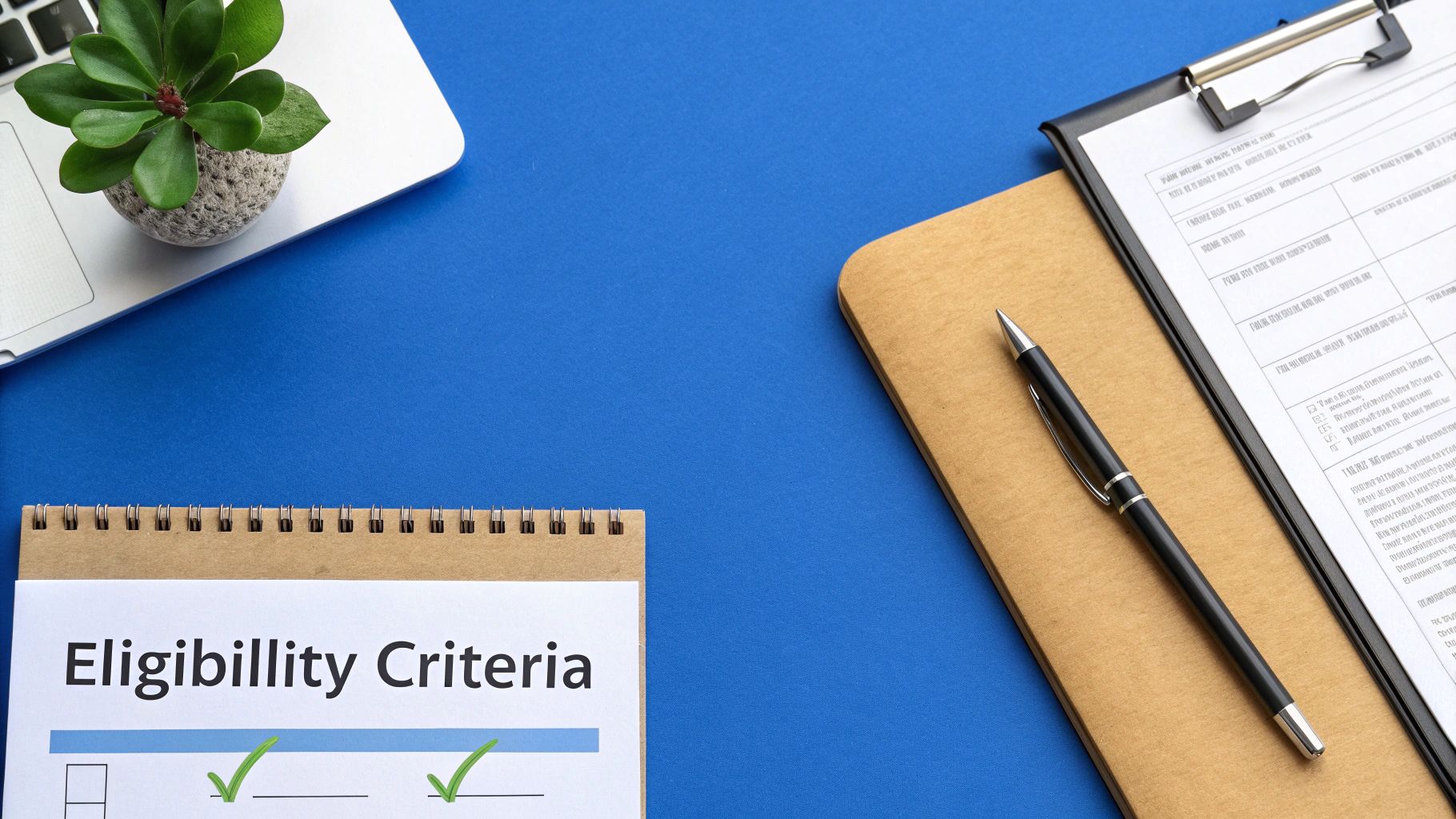
Before you even dream of filling out forms, we need to talk about the absolute fundamentals: making sure you're eligible for a Canadian work permit. This isn't just about ticking boxes on a checklist. You're essentially building a case to persuade an immigration officer that you're a genuine visitor who will play by the rules.
Try to see it through their eyes. An officer's job is to assess risk. They need to be confident that you'll leave Canada when your permit expires and that you have the means to support yourself without trouble. For us applying from Nigeria, this means laying out clear, undeniable proof.
Proving You’ll Return to Nigeria
This is often the biggest hurdle. You have to convince the officer that you have strong reasons to come back home. These are what we call "ties to your home country"—the anchors that prove you aren’t just looking for a way to disappear in Canada.
So, what counts as a strong tie?
- Family: This is a big one. Having a spouse, children, or elderly parents who rely on you back in Nigeria is powerful evidence.
- Property & Assets: Owning land, a home, or a registered business shows you have significant investments you wouldn't just abandon.
- A Good Job: A letter from your current employer in Nigeria is golden. It should confirm you're on an approved leave and that your job is waiting for you when you get back.
Think about it this way: an application from a young, single person with no property and no current job might raise more red flags than someone who owns a flat in Abuja, has a family, and is officially on a sabbatical from a good job. The second person has a much more convincing story.
Showing You Have Enough Money (Proof of Funds)
You must prove you have enough cash to look after yourself—and any family coming with you—when you first land in Canada. This isn't just about showing a huge lump sum that appeared yesterday. It’s about demonstrating stable, accessible funds to cover your initial costs before that first Canadian paycheque.
While there’s no official magic number, a good rule of thumb is to have enough to cover things like your first month's rent, a security deposit, transport, and food. Having access to several thousand Canadian dollars is a solid starting point for a single person.
Here’s what visa officers want to see:
- Bank Statements: Provide at least four to six months of your official bank statements. They need to see a steady history of transactions and a consistent balance. A sudden, large deposit right before you apply looks very suspicious.
- Proof of Income: Your pay slips or an employment letter from your Nigerian job detailing your salary are excellent supporting documents.
- Sponsorship: If someone is sponsoring you, you’ll need a formal letter from them, proof of their financial stability (their bank statements), and evidence of how you're related.
Being Admissible to Canada
Finally, beyond your ties and your finances, you simply have to be admissible. This is basically a background check to make sure you don’t pose a health or security risk to the country.
To be admissible, you must:
- Be in good health (you'll likely need to do a medical exam with a panel physician).
- Have a clean criminal record.
- Not be considered a security risk.
One of the biggest pitfalls here is misrepresentation. This means providing false information or hiding something important. For example, not declaring that you were refused a visa to the UK or the US is a huge mistake. It can get your Canadian application refused and earn you a five-year ban. Be completely honest—it's non-negotiable.
Your ultimate goal is to paint a picture of a responsible, low-risk applicant. Every single document you submit should support the story that you're coming to Canada to work as planned and will respect the terms of your visa. Getting this right from the start is key to successfully navigating how to apply for a work permit in Canada.
Assembling Your Application Documents From Nigeria
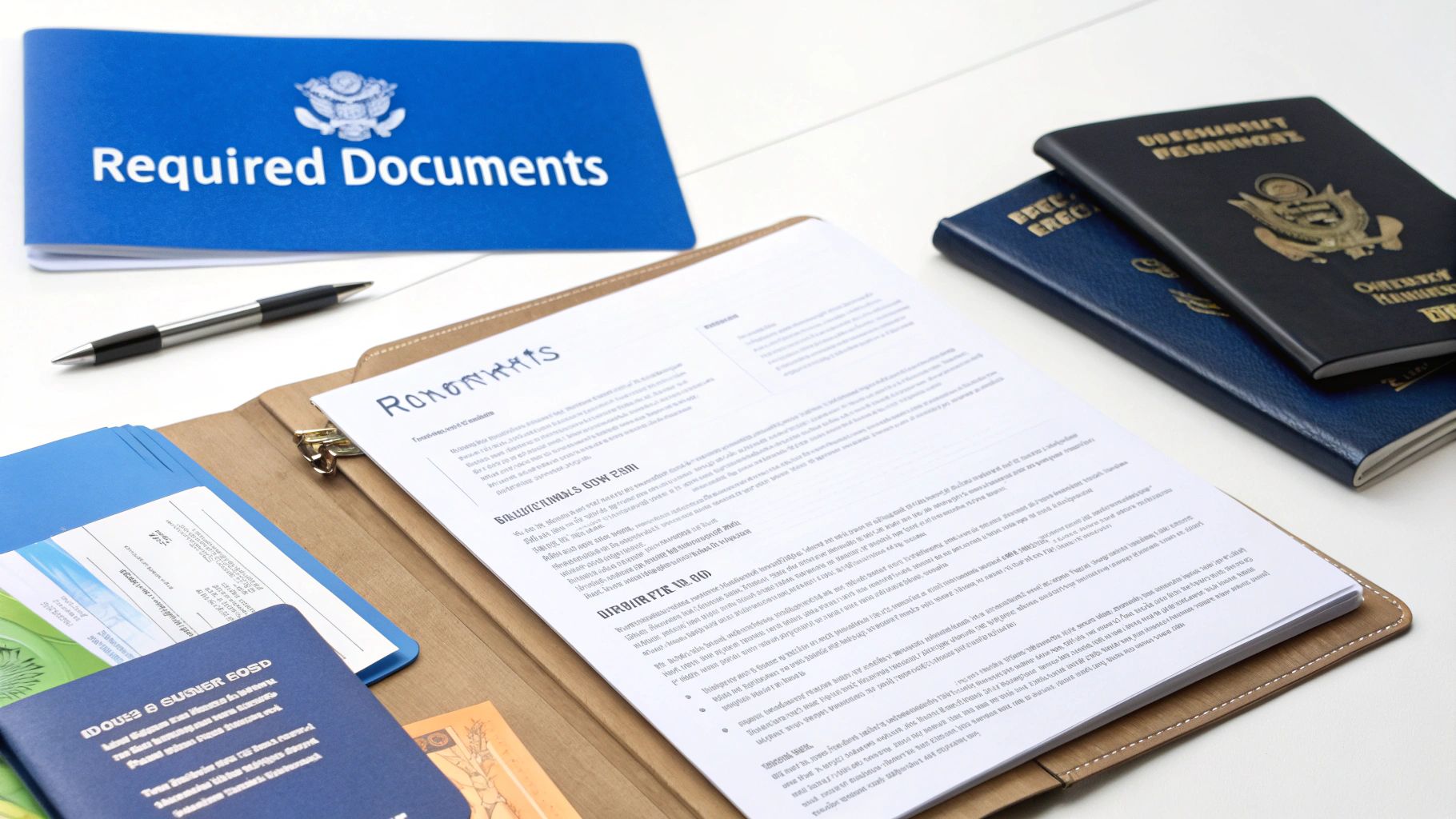
A perfectly organised application is your greatest asset in this process. Think of your documents as telling a story to the immigration officer; each piece must be solid, clear, and presented correctly. Getting this right isn't just about collecting papers—it's about building a convincing case for yourself.
This is where your attention to detail really matters. I've seen too many applications get delayed or even refused because of simple, avoidable mistakes made at this stage. Let's walk through exactly what you need, with a special focus on the requirements for applicants in Nigeria.
The Core Application Forms
Your journey into the paperwork begins with the main application forms. These are the absolute foundation of your submission, and they are non-negotiable. For a work permit application from outside Canada, you’ll be dealing with two key documents.
- Application for Work Permit Made Outside of Canada (IMM 1295): This is the big one. It’s where you’ll fill in all your personal details, your background, and the specifics of the job you plan to do in Canada.
- Family Information Form (IMM 5707): This form gives the Canadian government a picture of your immediate family—think spouse, parents, and children—whether they plan to join you in Canada or not.
Accuracy is everything here. Go over every entry and check it against your passport and other official documents. A tiny slip-up, like a misspelled name or an incorrect date of birth, can create major headaches down the line.
Essential Supporting Documents
Beyond the main forms, you'll need a stack of supporting evidence. Each document serves a specific purpose: to prove a claim you've made. Here are the critical items you'll need to gather in Nigeria.
Your Passport and Photos
First, your international passport. It must be valid for the entire time you plan to work in Canada. Make sure you have clear, colour photocopies of the bio-data page (the one with your photo and information).
Your application photos have very strict rules. Don't even think about using the same photo from your Nigerian passport. IRCC demands two recent, identical photos that meet their precise specifications for size, background, and even your facial expression. Your best bet is to find a professional photo studio that knows the requirements for a Canadian visa application.
Expert Tip: Don't try to save a few Naira by taking the photos yourself or using a cheap studio. Rejected photos are a common and completely avoidable reason for delays. Pay a professional to get it right the first time.
The Job Offer Letter
For an employer-specific work permit, this document is the heart of your application. The job offer letter needs to be on official company letterhead and packed with details, including:
- Your job title and a full description of your duties.
- Your salary and a clear breakdown of any benefits.
- The exact physical address where you'll be working.
- The start and end dates of your employment contract.
The letter must also include your employer's full contact information. It’s a formal contract that proves you have a legitimate job waiting for you.
For a deeper look into the different visa types and what they require, our overview of the Canada work visa and permit process offers some great additional context.
Proving Your Case From Nigeria
Some of the most important documents require you to deal with local authorities in Nigeria. My advice? Start these processes as early as possible. They can sometimes take much longer than you'd expect.
Police Certificates
You’ll need to provide a police clearance certificate from Nigeria. This document shows the Canadian government that you don't have a criminal record that would make you inadmissible. You can get this from the Nigeria Police Force Criminal Investigation Department (CID) at Alagbon.
Medical Examination
This isn't something your family doctor can do. You must have a medical exam with a physician specifically approved by IRCC, known as a panel physician. You can find the official list of approved doctors in Nigeria on the IRCC website. The doctor sends the results directly to Canadian immigration; you'll just get a confirmation document to include with your application.
Biometrics
Most applicants from Nigeria need to provide biometrics, which means your fingerprints and a photograph. After you submit your application and pay the fees, you will receive a Biometric Instruction Letter (BIL). You then have to book an appointment at a Visa Application Centre (VAC) in Lagos or Abuja to get this done.
Putting your documents together is a detailed but very manageable task. By understanding what each piece of paper is for and sticking to the requirements, you build a strong foundation for your journey to working in Canada.
Using the IRCC Online Application Portal
You’ve gathered all your paperwork, and now it's time to tackle the digital side of things: the Immigration, Refugees and Citizenship Canada (IRCC) online portal. This is where your hard work comes together. Getting this part right is crucial—it's not just about uploading files; it's about ensuring your application is submitted cleanly so it can be processed without delays.
Think of this as the final, critical step. Moving from a physical stack of documents to a digital submission requires careful attention to detail. Let's walk through how to navigate the portal, from creating your account to paying the fees.
Creating Your Secure IRCC Account
First things first, you'll need to create your secure online account. This account becomes your personal dashboard for everything related to your application. It’s your direct line to IRCC, where you’ll upload documents, get messages, and anxiously check for updates.
As you set up your account, you'll be asked to create security questions.
My advice: Don't just pick the first questions you see. Choose questions and answers you’ll absolutely remember but that would be impossible for someone else to guess. I always tell my clients to write them down and store them somewhere safe. You'll need them every single time you log in, and getting locked out is a headache you don't need.
Once your account is live, you’ll see the main dashboard. Take a moment to click around and get comfortable with the layout before you jump into the application itself. This is your mission control for the next few weeks.
Generating Your Personal Document Checklist
One of the best features of the portal is the eligibility questionnaire. This isn't just a simple quiz; it's a smart tool that builds a personalised document checklist just for you.
You'll answer a series of questions covering things like:
- Your nationality (Nigerian)
- Your age and family details
- The exact type of work permit you’re after (like an employer-specific one)
Once you’ve answered everything, the system gives you a unique personal reference code and a complete checklist of every form and supporting document required for your specific situation. This is brilliant because it removes all the guesswork. You know you're providing exactly what the visa officer needs to see, which is a huge step towards a successful application.
This infographic gives a great high-level view of the entire journey, from that initial eligibility check right through to getting a final decision.
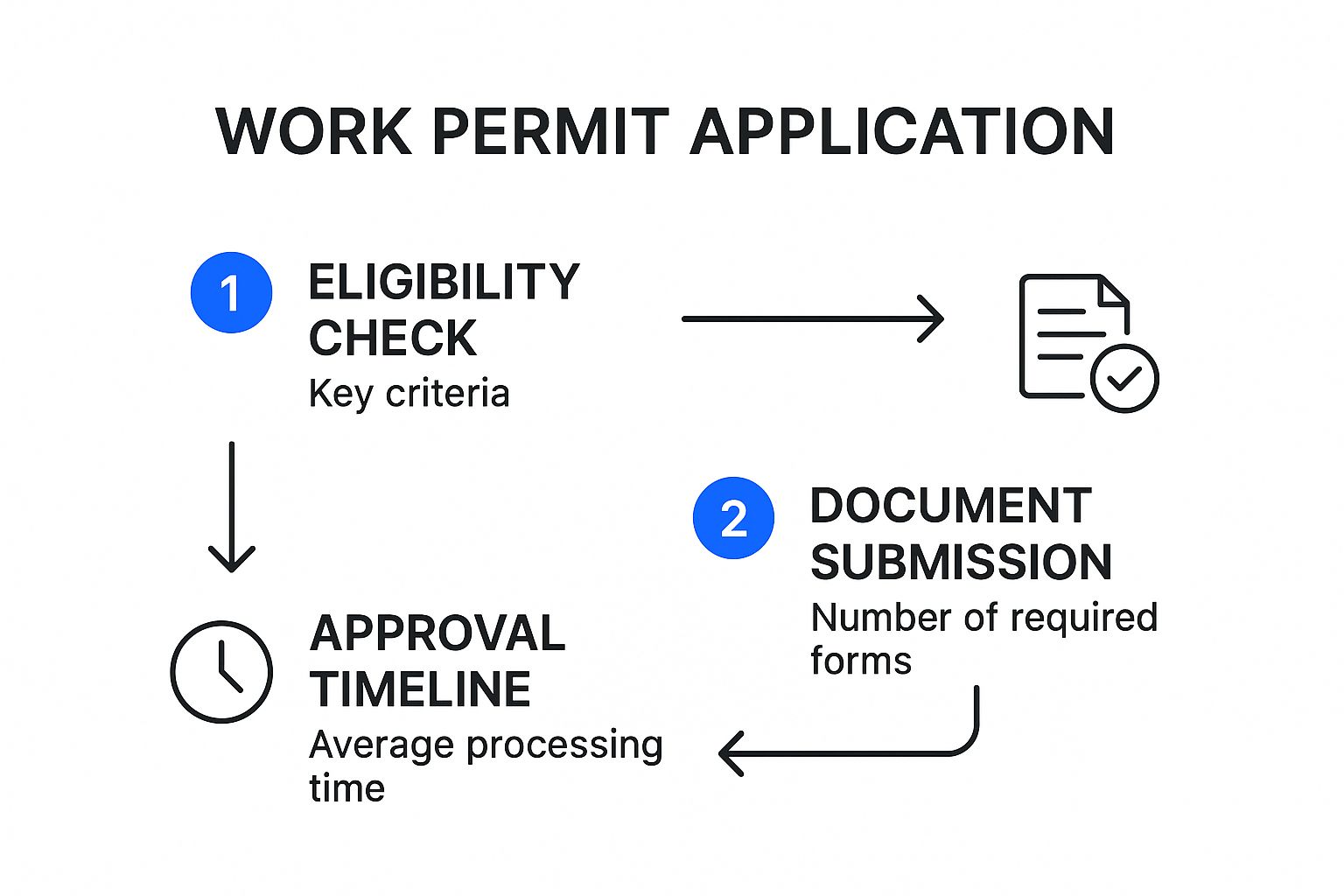
As you can see, it's a clear sequence. Each step builds on the last, which really highlights why getting every single part right is so important.
Uploading Your Documents and Paying Fees
With your personalised checklist ready, it’s time to start uploading. Be meticulous here. The portal is picky about file formats (usually PDF, JPG, or DOC) and has a strict file size limit, typically 4 MB per file. If your document is too large, you’ll have to compress it—just make sure it remains clear and readable.
A Quick Word on the Letter of Explanation
You'll see an optional slot for a "Letter of Explanation." From my experience, you should always use it. This is your one chance to speak directly to the visa officer reviewing your file. You can explain a large, recent deposit into your bank account, address a gap in your employment history, or clarify any other point that might seem confusing. A clear, concise letter can make all the difference.
Finally, you’ll get to the payment page. Here, you'll need to pay both the work permit processing fee and the biometrics fee.
Fee Type Purpose How to Pay Processing Fee Covers the cost of actually assessing your application. Paid online with a credit card (Visa, MasterCard, American Express) or a debit card from a participating Canadian bank. Biometrics Fee Covers the cost of taking your fingerprints and photo. Paid at the same time as the processing fee. For applicants in Nigeria, a credit card is the most straightforward option. Double-check that your card is approved for international transactions and has enough of a limit to cover the fees, which are charged in Canadian dollars. Once the payment goes through, you'll get a receipt and, soon after, your Biometric Instruction Letter (BIL). You'll need that BIL to book your biometrics appointment at a Visa Application Centre (VAC).
Finding Opportunities in Different Canadian Regions
Your job search isn't just about finding any job; it's about finding the right job in the right place. Many people make the mistake of applying everywhere, but a smarter strategy is to focus on Canadian provinces where your skills are desperately needed. This shows immigration officers you've done your homework and are serious about contributing.
Think of Canada as a collection of unique job markets, not just one big one. The skills that are a hot commodity in Ontario's tech scene might not be what the resource-focused economies of Alberta or Saskatchewan are looking for. When an immigration officer sees your application, they're looking for a genuine need. If you're applying for a role in a region with a well-known labour shortage in your field, your application immediately becomes stronger.
Pinpointing High-Demand Regions
So, where are these opportunities? Pay close attention to the Atlantic provinces: Nova Scotia, New Brunswick, Prince Edward Island, and Newfoundland and Labrador. These regions are actively using immigration to solve critical labour shortages through programmes like the Atlantic Immigration Program.
This isn't just a general invitation; they have created specific pathways for people in fields that are crucial to their economies. Right now, there's a huge demand for professionals in healthcare, transportation, and various skilled trades across Atlantic Canada.
A targeted approach is always better. Applying for a job in a province that desperately needs your skills makes you a more attractive candidate to both employers and immigration officials. It shows you’ve done your research and are serious about contributing where you're needed most.
Evidence of Regional Growth
The numbers tell the story. These provinces are genuinely bringing in foreign talent. Just look at the growth in the non-permanent resident population, which includes people on work permits.
In a province like Nova Scotia, for instance, the number of non-permanent residents ballooned from roughly 27,967 to 53,479 between April 2022 and April 2023. This data, which you can find in Nova Scotia's official statistics, confirms that temporary work permits are a key strategy for filling jobs and growing the local economy.
These aren't just abstract opportunities; real people are getting these jobs.
While big job boards are a good start, don't forget to look at specialized platforms. If you work in a niche industry like technology, you can explore various job opportunities on boards dedicated to that sector. This helps you cut through the noise and connect directly with employers who need exactly what you offer. By aligning your job hunt with Canada's regional economic needs, you're not just applying for a job—you're positioning yourself for success.
Got Questions? You're Not Alone
The path to getting a Canadian work permit can feel like a maze, and it’s completely normal to have questions pop up. Having helped countless Nigerians through this exact process, I’ve noticed the same key concerns come up time and time again.
Getting solid answers to these questions isn't just about satisfying curiosity; it's about building a rock-solid application and avoiding simple, costly mistakes. Let's tackle some of the most frequent queries I hear from applicants just like you.
"How Much Money Is Actually Enough for Proof of Funds?"
This is the million-dollar question, isn't it? The truth is, there's no magic number set in stone by IRCC for work permit applicants. What they're looking for is a reasonable amount of settlement funds to convince the visa officer you can actually support yourself when you land in Canada.
Think about it from a practical standpoint. Before your first paycheque comes in, you’ll need cash for your first month's rent, a security deposit, groceries, and transportation. You need a buffer.
A good rule of thumb for a single person is to show access to several thousand Canadian dollars. If you’re bringing your family along, that figure needs to be substantially higher. But here’s the real secret: it’s less about the final number and more about the stability and origin of your funds.
A visa officer is trained to spot last-minute "flash funds" or large, unexplained deposits. They want to see a story in your bank statements from the last four to six months—a story of steady savings and income, not a desperate scramble to hit a target.
If you want to dig deeper into this, our comprehensive guide on demonstrating proof of funds for your Canada application offers more detailed strategies and examples.
"Can I Bring My Family with Me on a Work Permit?"
Yes, you absolutely can in many cases. Canada’s immigration system is designed to keep families together. If you secure a valid job offer in a skilled role—think NOC TEER 0, 1, 2, or 3—your spouse or common-law partner can often apply for an open work permit.
This open work permit is a massive advantage. It means your partner can work for nearly any employer in Canada, which not only gives your family a second income but also much more flexibility. Your dependent children can also come along, usually on study permits to attend school.
The trick is to include them in your initial application. You must list them as accompanying you and submit all their necessary forms and documents right from the start. And, of course, you'll need to show you have enough money to support everyone.
"What Are the Top Reasons My Application Might Be Refused?"
Knowing why others get refused is the best way to protect your own application. For Nigerian applicants, refusals often come down to a handful of recurring issues.
Here are the most common culprits:
- Weak ties to Nigeria: The visa officer wasn't convinced you’d return home after your permit expires. You need to show strong proof of what’s waiting for you back home—family, property, a business, or a job to return to.
- Shaky proof of funds: Your financial documents didn't paint a clear picture of your ability to support yourself (and your family) upon arrival.
- A messy application: This could be anything from incorrectly filled forms and missing documents to information that contradicts itself. Consistency is key.
- Doubts about the job offer: The officer might have questioned if the job offer was genuine or if the employer truly needed to hire a foreign worker.
Visa officers need to be confident in your "dual intent"—that you genuinely plan to work temporarily but will absolutely respect the rules and leave when your status ends. Every document you submit must support this idea.
"Realistically, How Long Will This Take?"
Processing times are the great unknown and can fluctuate wildly. The number of applications in the system, the country you're applying from, and the unique details of your case all play a part.
The only place to get a reliable estimate is the official IRCC website. They have a processing time calculator that gives you the most current estimates for applications from Nigeria. It’s a good idea to check it, but remember, it's just an estimate, not a promise.
Your best bet for speeding things up? Submit a perfect application from day one. Applying online is usually quicker than paper, and an application with no errors or missing pieces avoids the back-and-forth that creates frustrating delays.
"Do I Need to Look for a Job in a Specific Province?"
While you can technically work anywhere in Canada with the right permit, a strategic job search can make a huge difference. Some provinces are actively looking for skilled workers to fill major labour gaps through their Provincial Nominee Programs (PNPs).
For example, some provinces have been ramping up their immigration targets to fight labour shortages. In 2025, New Brunswick’s PNP nominations were boosted to 4,250 after business councils reported that over half of small business owners couldn't find the staff they needed. This makes it a prime target for skilled workers. You can learn more about how New Brunswick's immigration allocation increase creates opportunities on immigcanada.com.
When you apply for a job in a region with a documented need for your skills, your application becomes much more compelling. It shows the visa officer that you're not just looking for any job—you're filling a genuine economic need.
Navigating the complexities of Canadian immigration can be challenging, but you don't have to do it alone. JapaChat is Nigeria's first AI immigration expert, designed to give you instant, accurate answers to your specific questions. Plan your relocation with confidence and clarity by getting personalised guidance on visa requirements, documentation, and more. Start your journey today by signing up for free at https://japachat.com.
-

Documents Required for UK Tourist Visa: 8 Essential Tips
Planning a trip to the United Kingdom is an exciting prospect, but navigating the visa application process can feel daunting. A successful application hinges on providing the correct documentation to prove your intent and eligibility. This comprehensive guide breaks down every one of the documents required for a UK tourist visa, offering practical tips and highlighting common mistakes to avoid.
We will detail the 'why' behind each requirement, helping you present a strong and credible case to the UK visa authorities. For Nigerians planning their journey, getting this step right is crucial. Preparing a well-organised and complete application file is the first step towards a successful outcome. Let's dive into the essential checklist to get your documents in order and ensure a seamless application process. This list is your roadmap to ticking all the right boxes for UK Visas and Immigration.
1. Valid Passport
Your current passport is the cornerstone of your UK tourist visa application. This document serves as the primary proof of your identity and nationality for UK Visas and Immigration (UKVI). It must be valid for the entire duration of your planned stay in the UK.
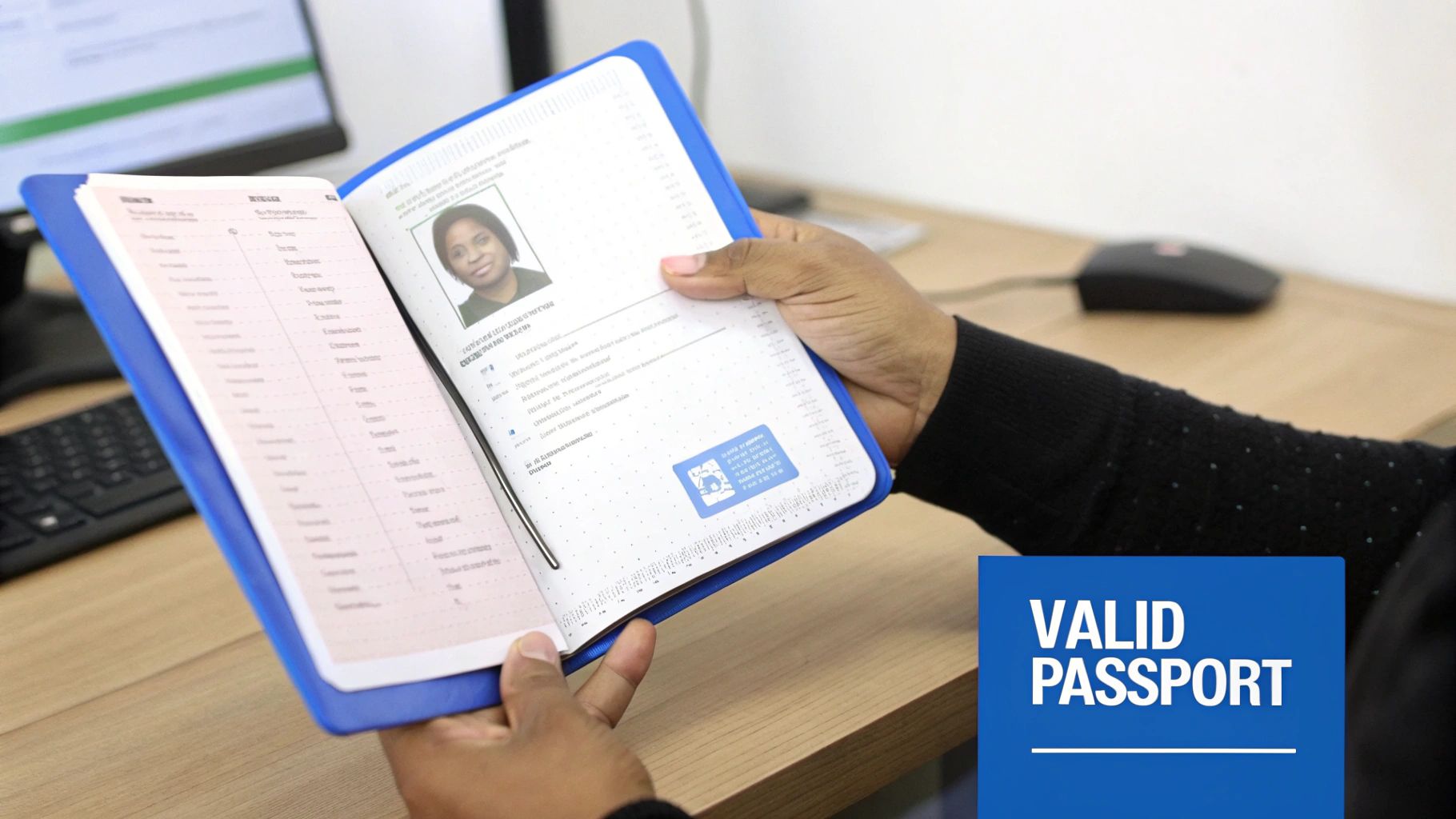
Crucially, your passport must contain at least one blank page, both sides empty, for the visa sticker. UKVI will not issue a visa if there is no space to affix it. While the official rule is validity for your trip, it is a strongly recommended best practice to have at least six months of validity remaining from your intended date of entry. This buffer prevents complications if your travel dates shift.
Key Requirements & Tips
To ensure your passport meets the strict standards, follow these actionable tips:
- Check Expiry Date: Before starting your application, check your passport's expiry date. If it's expiring within six to eight months, it is wise to renew it first. For Nigerians, you can learn more about renewing your passport online to avoid last-minute delays.
- Inspect for Damage: Carefully examine your passport for any damage, especially to the biodata page or the embedded biometric chip. A torn page or a faulty chip can lead to a rejection.
- Signature Consistency: Ensure the signature in your passport matches the signature you use on your application form and other supporting documents. Inconsistencies can raise red flags.
2. Completed Visa Application Form (VAF4A)
The VAF4A is the official online application form for the UK Standard Visitor visa, which covers tourism. This comprehensive digital form is where you will provide your personal details, travel plans, employment status, financial circumstances, and travel history. It is the narrative of your application, and its accuracy is paramount for a successful outcome.
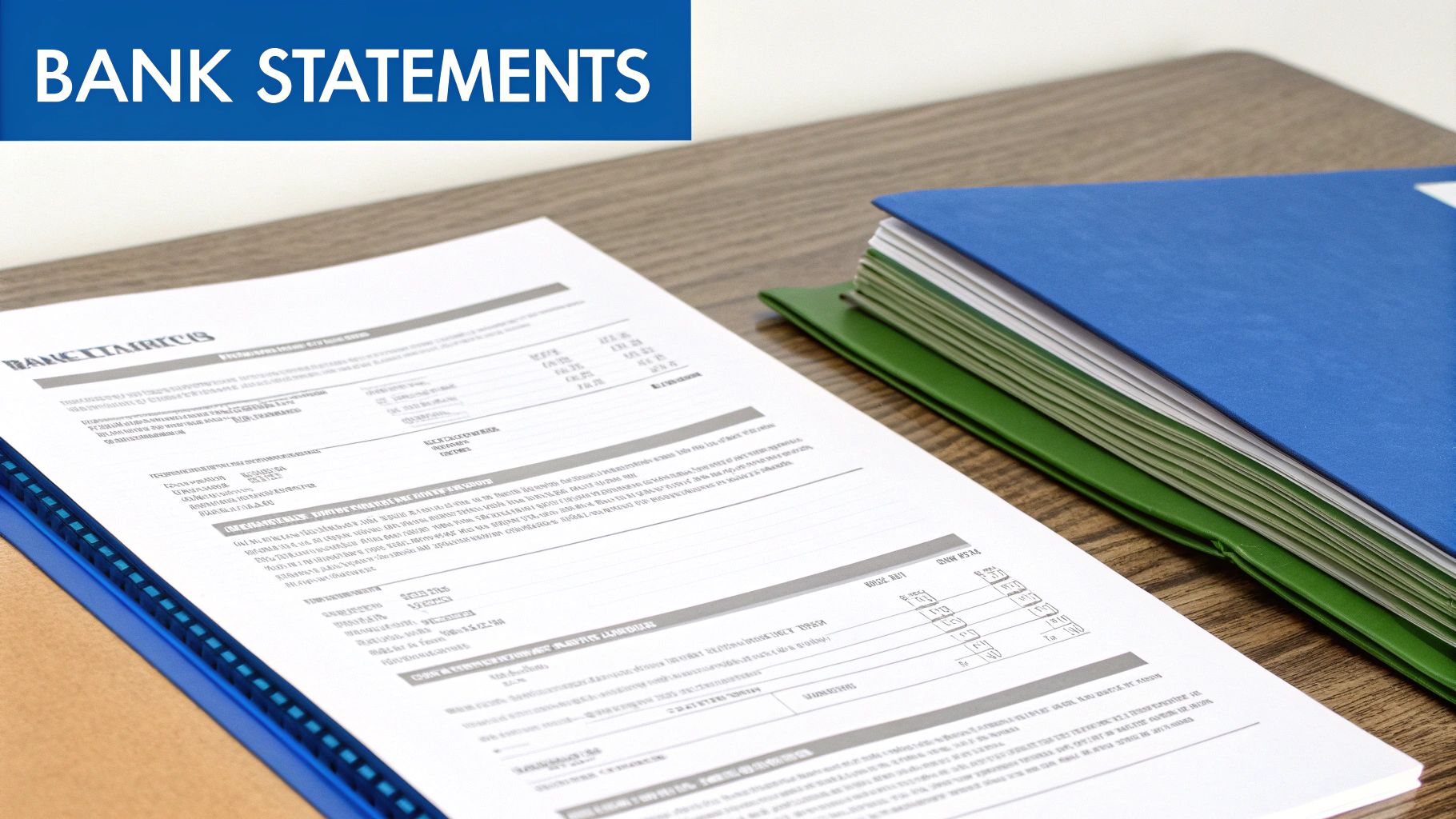
Whether you plan to visit London for two weeks, attend a business conference, or visit relatives, this form is mandatory. It must be completed truthfully and submitted online before you can book your biometric appointment. The information you provide here will be cross-referenced with all your other supporting documents required for the UK tourist visa.
Key Requirements & Tips
To ensure your application form is filled out correctly and supports your case, follow these tips:
- Honesty and Thoroughness: Fill in every required section honestly. Omitting information or providing false details can lead to a refusal and a potential 10-year ban.
- Save Your Progress: The online form is lengthy. Use the "save and return" feature frequently to avoid losing your data due to a timeout or internet interruption. For those looking to streamline the application process, learning how to improve your typing speed can enhance your efficiency.
- Consistency is Key: Double-check that all names, dates, and figures on the form exactly match those on your passport, bank statements, and other documents. Discrepancies are a major red flag for visa officers.
- Review Before Submission: Before you hit the final submit button, carefully review every answer. It is often helpful to have someone else look it over for errors you might have missed. Once submitted, changes cannot be made.
3. Bank Statements (Last 6 Months)
Your financial standing is a critical component of your UK tourist visa application. Providing six months of recent, official bank statements is how you prove to UK Visas and Immigration (UKVI) that you can afford your trip without needing to work or access public funds. These documents must clearly demonstrate a stable financial history, sufficient funds for your travel, and regular income.
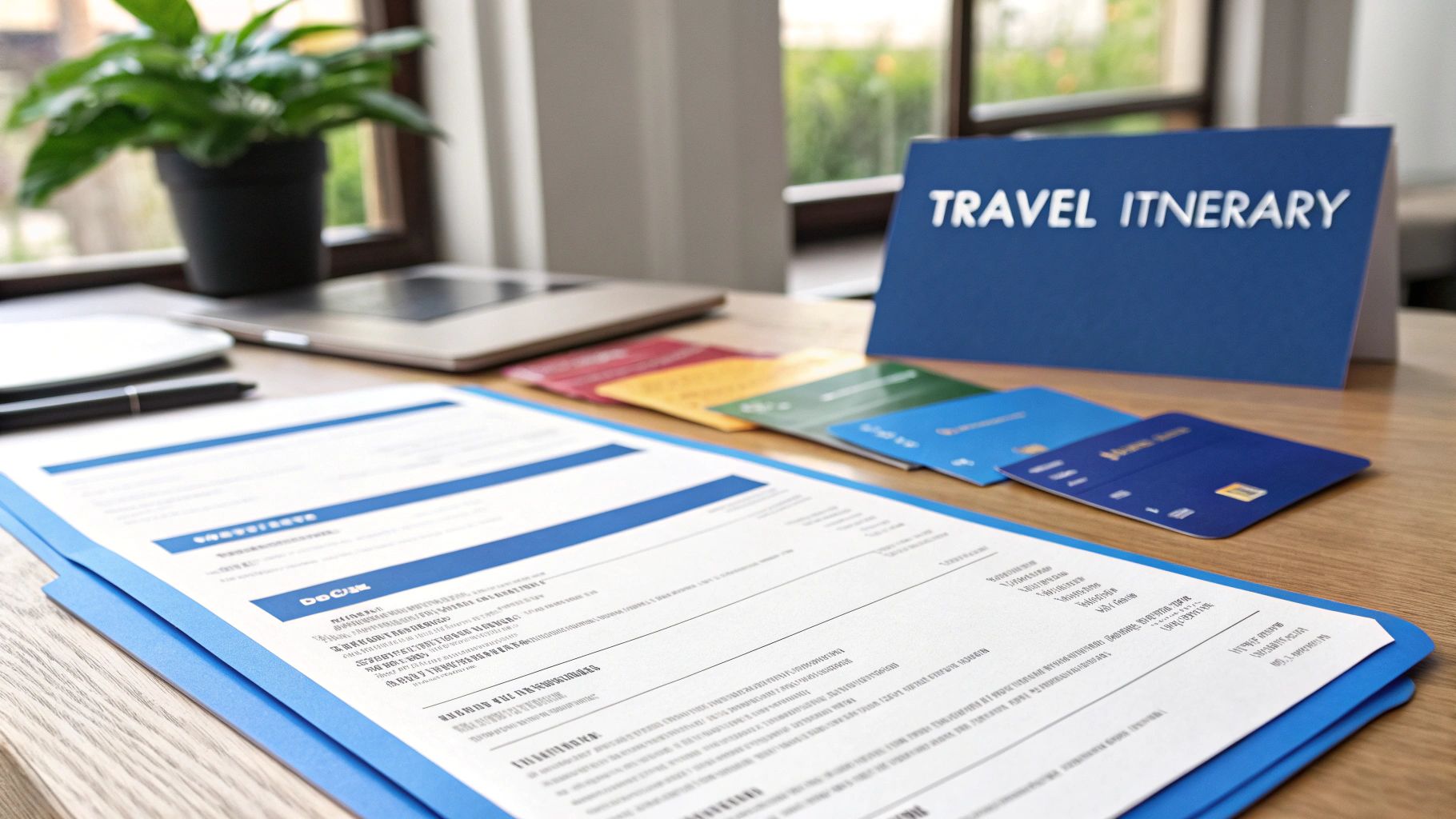
The statements must be from a recognised financial institution and reflect the account holder's name and address. For example, a salaried individual should show consistent monthly wage deposits, while a business owner's statements might show regular transfers from a business account. The goal is to paint a clear, honest picture of your financial situation, proving you have a strong reason to return to Nigeria.
Key Requirements & Tips
To present your financial evidence effectively, consider these actionable tips:
- Explain Large Transactions: If your statements show any unusually large deposits or withdrawals, provide a brief, written explanation and supporting evidence. For instance, if you sold a car, include the sales receipt. This prevents suspicion about "funds parking," where money is temporarily moved into an account to inflate the balance.
- Use an Active Account: Submit statements from your primary, active current account that shows your regular day-to-day spending and income. A dormant savings account with a large balance is less convincing than an account that reflects your real financial life.
- Ensure Official Stamps: Every single page of your bank statement must be officially stamped and signed by the bank. A printout from an online portal is often insufficient unless it can be verified by the bank. This authenticity is non-negotiable.
- Maintain a Healthy Balance: Avoid letting your account balance drop to zero or a very low amount during the six-month period. A consistent, healthy closing balance demonstrates financial stability and responsible money management.
4. Employment Letter or Business Registration
Official documentation detailing your employment or business is a critical component of the documents required for a UK tourist visa. This evidence demonstrates strong ties to your home country, assuring the visa officer that you have a stable job or business to return to. It serves as proof of your professional status and financial stability, which are key factors in the visa decision process.

For employed individuals, this is typically a formal letter from your employer. If you are self-employed or a business owner, you will need to provide official company registration documents. The goal is to present a clear picture of your professional life in Nigeria, reinforcing your intention to leave the UK after your visit.
Key Requirements & Tips
To ensure your professional documents are convincing and meet UKVI standards, follow these actionable tips:
- Request the Letter Early: Contact your HR department or direct manager well in advance to avoid last-minute rush. The letter should be printed on official company letterhead and signed by an authorised person.
- Provide Verifiable Details: Ensure the letter includes the company's full address, phone number, and email. The details must be current as UKVI may contact your employer for verification.
- Be Specific in Content: The letter must state your job title, date of employment, current salary, and confirmation that your leave for the trip has been approved for the specified dates.
- Business Owners: If self-employed, provide your Certificate of Incorporation from the Corporate Affairs Commission (CAC), tax clearance certificates, and recent business bank statements to prove your business is active and legitimate.
5. Travel Itinerary and Accommodation Proof
A detailed travel plan is a crucial document required for a UK tourist visa, as it demonstrates the genuine purpose and structured nature of your visit. UKVI needs to see that you have a clear plan, which includes where you will stay and what you intend to do. This plan reassures the entry clearance officer that you are a genuine tourist with a well-thought-out trip.
Your itinerary should logically map out your intended activities, such as a city break in London with pre-booked theatre tickets or a tour of Scotland with confirmed accommodation in the Highlands. These documents must align with the duration and purpose stated in your application form. A detailed plan adds significant credibility to your application, showing you have organised your visit responsibly.
Key Requirements & Tips
To present a convincing travel plan, consider these actionable tips:
- Book Refundable Options: Where possible, make hotel and flight reservations that are fully refundable or can be cancelled without a major penalty. This provides proof without financial risk if your visa is delayed or denied.
- Create a Day-by-Day Plan: Outline your activities for each day of your stay. Include travel times between cities, names of attractions you plan to visit, and any pre-booked tours or event tickets.
- Match Itinerary to Purpose: Ensure your planned activities align with being a tourist. A schedule packed with business meetings would be inconsistent with a tourist visa application.
- Provide Host Details: If staying with a friend or relative, you must provide a letter of invitation from them. This letter should confirm their relationship to you, their address, and their UK immigration status. Also include a copy of their passport or residence permit.
6. Travel Insurance Policy
While not always listed as a mandatory requirement, a comprehensive travel insurance policy is a highly recommended document for your UK tourist visa application. It demonstrates to the visa officer that you are a responsible traveller who is prepared for unforeseen circumstances, such as medical emergencies, trip cancellations, or lost baggage. This foresight can strengthen your application by showing you have the financial means to handle potential issues without relying on UK public funds.
Your policy must cover the entire duration of your intended stay in the United Kingdom. It should clearly state the coverage limits for medical expenses, emergency repatriation, and other benefits. A robust policy signals that you have meticulously planned your trip, which reflects positively on your overall application. For those travelling with family or friends, exploring and understanding group travel insurance can also be beneficial, offering a streamlined way to ensure everyone is protected.
Key Requirements & Tips
To ensure your travel insurance supports your visa application effectively, consider these actionable tips:
- Purchase Before Applying: Always buy your travel insurance policy before you submit your visa application. Include the policy certificate as one of your supporting documents.
- Check Coverage Details: Carefully read the policy's terms and conditions, paying close attention to exclusions, especially regarding pre-existing medical conditions. Ensure the policy explicitly covers COVID-19 related medical expenses and trip interruptions.
- Choose Reputable Providers: Opt for a well-known and reputable insurance company. A policy from a recognised provider carries more weight and ensures you receive reliable support if needed.
- Keep Documents Accessible: Once you have your visa and are travelling, keep both digital and physical copies of your insurance policy with you. You may be asked for it at the border, and you will need it to make a claim.
7. Proof of Ties to Home Country
Demonstrating strong ties to your home country is a critical part of your UK tourist visa application. These documents serve as compelling evidence to UK Visas and Immigration (UKVI) that you have significant reasons to return home after your visit and do not intend to overstay your visa. Strong ties can be familial, economic, social, or professional commitments that anchor you to your country of residence.
These ties assure the entry clearance officer of your intention to comply with UK immigration rules. For instance, providing evidence of property ownership, ongoing employment, or family responsibilities shows that your life is firmly established in your home country, making it highly likely you will return as planned. This is one of the most vital sets of documents required for a UK tourist visa.
Key Requirements & Tips
To effectively prove your strong connections to your home country, focus on providing clear and verifiable evidence:
- Compile Diverse Evidence: Do not rely on a single type of tie. Combine documents like property deeds or tenancy agreements, a letter from your employer confirming your role and approved leave, and birth certificates of dependent children. The more varied the evidence, the stronger your case.
- Demonstrate Financial Commitments: Include documents showing significant financial investments in your home country. This could be business ownership records, recent tax returns, or statements for investment portfolios that show you have a vested economic interest in returning.
- Clearly Articulate Responsibilities: If you have family or social duties, such as caring for an elderly parent or holding a key position in a community organisation, provide documentation to support this. A well-crafted letter can help explain these responsibilities; you can learn more about writing a compelling letter of intent for a visa application to strengthen your submission.
- Ensure Documents are Current: All evidence must be recent to reflect your current situation. An old employment letter or an outdated property valuation will carry less weight than documents issued within the last few months.
8. Passport-Size Photographs
Your application requires two recent, identical, colour photographs that strictly adhere to the UK’s visa photo specifications. These images are a critical biometric identifier used by UK Visas and Immigration (UKVI) to verify your identity against your passport and during your arrival in the UK. The photos must have been taken within the last month to accurately reflect your current appearance.
The photographs must be 45 millimetres high by 35 millimetres wide, the standard size used in UK photo booths and by professional photographers. They cannot be a cut-down version of a larger picture. Submitting photos that fail to meet the precise size, background, and quality requirements is a common and easily avoidable reason for an application delay or rejection, making it a crucial document for your UK tourist visa.
Key Requirements & Tips
To ensure your photographs are accepted without issue, follow these specific guidelines:
- Use a Professional Service: Visit a photo studio or a specialised service familiar with UK visa photo rules. Many photography shops in Nigeria explicitly offer this service. Avoid using home printers, as the paper quality and resolution may not meet the standards.
- Adhere to Background and Clothing Rules: The background must be a plain cream or light grey colour. Avoid wearing white, off-white, or cream-coloured tops, as this can cause you to blend into the background. Opt for a dark, solid colour instead.
- Maintain a Neutral Expression: You must have a neutral expression with your mouth closed. Do not smile, grin, or frown. Your eyes must be open, visible, and free from reflection or glare from glasses.
- Check the Official Guidance: Photo requirements can be updated. Always check the latest specifications on the official UK government website before taking your pictures to ensure compliance.
Key Document Checklist for UK Tourist Visa
Item Implementation Complexity 🔄 Resource Requirements ⚡ Expected Outcomes 📊 Ideal Use Cases 💡 Key Advantages ⭐ Valid Passport Moderate – renewal can be time-consuming Physical document, biometric data intact Proof of identity, nationality, travel history All visa applicants needing official ID Primary accepted international ID Completed Visa Application Form (VAF4A) Moderate – online form with multiple sections Reliable internet and digital device Accurate visa data submission and booking Standard Visitor visa applicants 24/7 access, error validation, instant confirmation Bank Statements (Last 6 Months) Low to moderate – collect official documents Official bank statements with seals Demonstrates financial capacity and stability Applicants proving funds for trip Clear financial evidence, shows stable income Employment Letter or Business Registration Moderate – official letter or certificates needed Employer/business documentation Confirms employment status and intent to return Employed or self-employed visa applicants Strong proof of ties, employment verification Travel Itinerary and Accommodation Proof Low – booking and reservation documents required Booking confirmations and reservations Shows genuine travel plans and exit intent Tourists or visitors with arranged plans Demonstrates planning, confirms trip details Travel Insurance Policy Low – purchase policy with required coverage Insurance documents covering trip duration Financial protection and preparedness Visitors wanting added security and visa requirement support Covers emergencies, shows responsibility Proof of Ties to Home Country Moderate – gather various personal/legal documents Property, family, education, business proofs Confirms strong links ensuring return Applicants with established home country ties Addresses overstaying concerns, strengthens application Passport-Size Photographs Low – recent photos meeting strict specs required Professional photo service or quality prints Current, standardized identification photos All applicants needing official photo ID Enhances application presentation, standard format Ready for Your UK Adventure? Start with a Perfect Application
Navigating the list of documents required for a UK tourist visa can feel like the first major challenge of your trip, but it is also the most crucial step towards success. Think of your application not as a collection of papers, but as a comprehensive portfolio that paints a clear and convincing picture of you as a legitimate visitor. Each document, from your meticulously organised bank statements to your detailed travel itinerary, serves a specific purpose: to demonstrate your financial stability, showcase your genuine tourist intent, and, most importantly, prove your strong ties to your home country, Nigeria.
The secret to a successful application lies in precision and honesty. A single missing document or an inconsistent detail can lead to delays or even a refusal. Therefore, it is vital to approach this process with diligence. Double-check that your passport has sufficient validity, ensure your employment letter clearly states your approved leave, and make sure your proof of ties is undeniable. By treating each requirement with the seriousness it deserves, you are not just ticking boxes; you are building a case of credibility that the visa officer can confidently approve.
Once your application is submitted, the exciting part begins: planning your actual journey. As you wait for your visa, you can start dreaming about the incredible experiences that await you. For inspiration on what to see and do, you can explore England's attractions and begin mapping out your unforgettable adventure. Mastering your document preparation is the key that unlocks the door to experiencing the UK’s rich history and vibrant culture first-hand.
Overwhelmed by the details? Get instant, personalised answers to your UK visa questions with JapaChat. Our AI-powered platform is specifically designed to guide Nigerians through the complexities of visa applications, ensuring you submit a complete and compelling package. Sign up for free at JapaChat and take the guesswork out of your journey.
